Fire is my slave, and a slave of my slaves
Huzoor’s faith-inspiring words about the fire at Baitul Futuh
Mosque and the grand congregation of Friday 7 April 2023
Holy Prophet’s prayer and sermon during an eclipse
It is a beautiful spring morning, and that too in Ramadan. The landscape of Islamabad, with its lush green fields and blooming flowers, is picturesque as it is, and the anticipation of seeing Huzooraa is adding the most pleasant filter to it
Filling my mind is the memory of yesterday’s [7 April 2023] Friday congregation at Baitul Futuh Mosque,
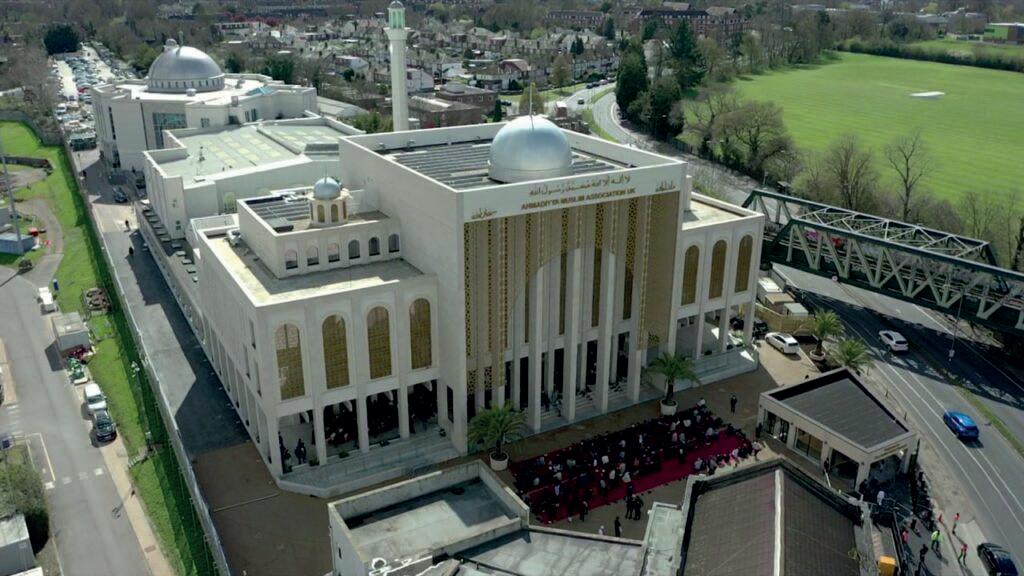
where Huzooraa had delivered his Friday sermon and led the congregation in Jumuah prayers – after a long period of three years.
Ahmadi Londoners were over the moon, but nonetheless, so were all Ahmadis around the world. The Baitul Futuh Mosque, from its very inception, has been dear to all Ahmadis around the
world – ever since Hazrat Khalifatul Masih IVrh opened the donation scheme globally for this grand mosque. Ahmadis from all over the world have been very much a part of it, more so for having associated it with the Friday sermons of Hazrat Khalifatul Masih Vaa that he delivered from this
Continued on next page >>
Ahmadiyya Archive & Research Centre (ARC), 22 Deer Park Road, London, SW19 3TL, UK info@alhakam.org | ISSN 2754-7396 THE WEEKLY www.alhakam.org A AL HAKAM | Friday 14 April 2023 | Issue CCLXV A spiritual retreat: Itikaf in Ramadan Page 3 Opinion: A brief economic analysis of Ramadan Page 12 Page 6 Answers to Everyday Issues: Part 52 Page 8 Introduction to chapters of the Holy Quran Part: 91-100
Hadith-e-Rasul – Sayings of the Holy Prophet Muhammadsa
ﺖﻔﺴﺧ ﺖﻟﺎﻗ ﺎﻬﻧأ ،ﺔﺸ�ﺎ� ﻦﻋ ﻰﻠﺻ ���ا لﻮﺳر ﺪﻬﻋ �� ﺲﻤﺸﻟا ���ا لﻮﺳر ﻰﻠﺼﻓ ﻢﻠﺳو ﻪﻴﻠ� ���ا ،سﺎﻨﻟﺎﺑ ﻢﻠﺳو ﻪﻴﻠ� ���ا ﻰﻠﺻ لﺎﻃﺄﻓ ��ر ﻢﺛ ،مﺎﻴﻘﻟا لﺎﻃﺄﻓ مﺎﻘﻓ ﻮﻫو مﺎﻴﻘﻟا لﺎﻃﺄﻓ مﺎﻗ ﻢﺛ ،عﻮ���ا لﺎﻃﺄﻓ ��ر ﻢﺛ ،لو��ا مﺎﻴﻘﻟا نود ،لو��ا عﻮ���ا نود ﻮﻫو ،عﻮ���ا ﻞﻌﻓ ﻢﺛ ،دﻮﺠﺴﻟا لﺎﻃﺄﻓ ﺪ�� ﻢﺛ ﻞﻌﻓ ﺎﻣ ﻞﺜﻣ ﺔﻴﻧﺎﺜﻟا ﺔﻌ���ا �� ﺖﻠ��ا ﺪﻗو ف��ﻧا ﻢﺛ ،ﻰﻟو��ا �� ،���ا ﺪﻤ�� ،سﺎﻨﻟا ﺐﻄ�� ،ﺲﻤﺸﻟا ﺲﻤﺸﻟا نإ :لﺎﻗ ﻢﺛ ﻪﻴﻠ� ﻰﻨﺛأو �� ،���ا تﺎﻳآ ﻦﻣ نﺎﺘﻳآ ��ﻘﻟاو ،ﻪﺗﺎﻴ�� ��و ﺪﺣأ تﻮﻤﻟ نﺎﻔﺴ��ﻳ ،او���و ���ا اﻮﻋدﺎﻓ ﻚﻟذ ��ﻳأر اذﺈﻓ ﺔﻣأ ﺎﻳ :لﺎﻗ ﻢﺛ اﻮﻗﺪﺼﺗو ا��ﺻو ﻦﻣ ��ﻏأ ﺪﺣأ ﻦﻣ ﺎﻣ ���او ،ﺪﻤ�� ﺎﻳ ،ﻪﺘﻣأ ��ﺰﺗ وأ هﺪﺒﻋ ��ﺰﻳ نأ ���ا ﻢﻠ�أ ﺎﻣ نﻮﻤﻠﻌﺗ ﻮﻟ ���او ،ﺪﻤ�� ﺔﻣأ ا��ﺜ� ��ﻴﻜﺒﻟو ��ﻴﻠﻗ ��ﻜﺤﻀﻟ Continued on next page >>
Hazrat Aishara narrated, “During the lifetime of Allah’s Messengersa the sun eclipsed, so he led the people in prayer: He stood up and performed a long qiyam, then bowed for a long while. He stood up again and performed a long qiyam, but this qiyam was shorter than the first one. He bowed again for a long time, but shorter than the first one, and then he prostrated and prolonged the prostration. He did the same in the second rak‘ah as he did in the first and then finished the prayer. By then, the solar (eclipse) had cleared. He delivered the sermon and after praising and glorifying Allah, he said, ‘The sun and the moon are two signs among the signs of Allah; they do not eclipse upon the death or life [i.e., birth] of anyone. So when you see [an eclipse], remember Allah, extol his greatness, observe the salat and give charity.’ The Prophetsa then said, ‘O followers of Muhammad! By Allah! There is none who has a greater sense of ghirah than Allah, [as He has forbidden] that His slaves, male or female, commit zina (illegal sexual intercourse). O followers of Muhammad! By Allah! If you knew what I know, you would laugh little and weep much.’” (Sahih al-Bukhari, Kitab al-Kusuf, Bab as-sadaqati fi l-kusuf)
Gratitude to God
“Therefore, it is necessary and incumbent on a believer to perform prostrations of gratitude before God Almighty whenever they are blessed with an achievement [because] God did not let their effort go in vain. The result of this gratitude will be that a person will increase their love for God Almighty and grow in faith. In fact, this is not all; such people will be graced with even further successes because God Almighty states that if one shows gratitude for His bounties, He shall increase His bounties upon such a one; but if one is ungrateful for His blessings, then remember that such a one shall be seized by a grievous punishment. Always keep the principle in mind that the task of a believer is to feel embarrassed when they are blessed with any form of success, and praise God for having showered His grace upon them. This is how a believer advances, and by demonstrating steadfastness in the face of trial, they receive the favour of God.” (Malfuzat [English], Vol. 1, p. 153)
<< Continued from previous page
mosque for a decade-and-a-half
And now, the reconstruction of the Baitul Futuh complex is in its own right a sign of Allah’s grace and mercy on the Jamaat.
After Huzooraa moved to Islamabad in April 2019, he would lead the Friday prayers at Masjid Mubarak in Islamabad But occasionally, he would travel to Baitul Futuh for the Friday prayers, which allowed a much larger congregation of Ahmadis to be part of it. The last occasion when this happened was on 6 March 2020, after which the Coronavirus swept ruthlessly across the entire planet, uprooting the routine life of the global human population.
For the weeks that followed – and months, and then years – Huzooraa delivered his Friday sermons from Masjid Mubarak, Islamabad
The reconstruction project of Baitul Futuh remained on hold for several months but then commenced under strict Coronavirus safety rules. People of Morden, Ahmadis and non-Ahmadis alike, witnessed the steady rise of this majestic structure that was beginning to tower over the skyline. While the mighty structure of the building stood as a symbol of hope in the gloomy days of Coronavirus, it remained for the opponents of the Jamaat a reminder of their age-long jealousy and they remained loyal to it. They remained, with their bickering and mockery, before this building, a spineless pygmy trying to look way beyond its vision range.
While the building lay in ruins and ashes, a man of God had said that we would be blessed with an even better replacement by Allah, and we would then say “Masha-Allah” and “Subhan-Allah”. Allah heard these words of His beloved –both showing His glory and majesty – and remained jealous of them. Every stage of the reconstruction left the onlookers’ eyes wide open with sheer amazement.
During the phases of this rebuilding, which spanned over a couple of years, Huzooraa inspected the site on several occasions, including on 10 March 2020 and 23 November 2021. The dates are important in that on both occasions, Huzooraa led the Zuhr and Asr prayers in Baitul Futuh Mosque, but with the Coronavirus in full swing – as well as its safety restrictions –only a few people got the chance to be part of the limited congregation.
Then came the long-awaited moment when the building stood ready, with all its splendour and magnificence, the words “Masha-Allah” and “SubhanAllah” glowing from the tops of its corners.
Our opponents had rejoiced at the burning of this building, and here we had a much larger, much more purposeful, much more beautiful and way more majestic building ready to be opened and used for the noble motive that lay in its very foundations.
Huzooraa opened this building on 4 March 2023, addressing in its halls on the same evening, the flagship Peace Symposium, where dignitaries from all walks of life got a chance to listen to him. On this occasion, a greater number of Ahmadis got a chance to say the Maghrib and Isha prayers behind Huzooraa
A few days after that came the month
of Ramadan, and another few days later, a pleasant surprise: Huzooraa was to deliver his Friday sermon from Baitul Futuh on 7 April. The news had come only two days prior to the big day, and these two days of anticipation seemed like a very long period.
It was after 6 March 2020 – three long years – that Huzooraa was leading Friday prayers in Baitul Futuh. During these three years, I had very often travelled by train to Baitul Futuh – alighting at Morden South Station, which is right next to the mosque.
As the train approached Morden South, I would get up, stand at the door and look out at this complex. During this period of three years, I witnessed the various phases of its reconstruction. But yesterday, as I stood eagerly at the door, I looked out to see a very different scene: a vibrant and excited crowd of people walking peacefully into the Baitul Futuh Mosque complex. Worshippers, drenched in the love of Allah and his chosen one, were holding their ID cards up to show as they entered through the gates. It was no less than a day of Eid.
I walked out of the station and then made my way through the gates of Baitul Futuh, headed to my office in MTA. My route was not through the mosque’s main hall or the adjacent halls, but only through corridors and walkways. This limited preview of the situation made me guess that it must be a good four or fivethousand-strong congregation.
Now today, as I sat waiting to see Huzooraa for my mulaqat, I had this experience from yesterday’s Friday congregation still intoxicating my mind. Actually, not just yesterday but the period of eight long years hovered over my imagination when, through the train window, I had seen this building in ruins and ashes; then seen its foundations laid; then the rebuilding work in progress; and then, finally, its transformation into one of the most majestic mosques around.
As I walked into Huzoor’s office, seated myself before him, and said, “Huzoor, what a wonderful experience was yesterday’s Jumuah!”
Huzooraa said, “Yes, it was. Quite a lot of people attended.”
I expressed my emotions by saying, “It was just like Eid!”
And I received a very enlightening reply. Huzooraa said:
“It was like Eid indeed. The Holy Prophetsa has given Fridays the same blessed status as Eid, so it is good that people attended it like Eid. I had estimated that the main mosque might get full or the overflow to be accommodated in a part of one of the halls. But the turnout reached around ten thousand.
“I had mentioned the verse مکل تلمكأ مویلٱ مکنید in my sermon yesterday. It is said that a Jewish person said to Hazrat Umar that ‘had such a verse been revealed for our faith, we would celebrate that day like Eid’. Hazrat Umar told him that ‘this verse was revealed to the Holy Prophet on Friday, as he stood in the Ground of Arafat’.
“So we had a Friday congregation yesterday, which is as good as Eid. This verse, which was revealed on a Friday, got mentioned as well. So, quite like Eid it was!
“The attendance was great. When the mosque reached its capacity, people had to be seated in all the newly built halls; when the halls reached capacity, people sat
in walkways and corridors to listen to the Friday sermon and say the prayer. All this by Allah’s grace!”
Huzooraa said this with his signature calm as he always says everything. This reminded me of the calmness I had observed on the very day that the mosque had caught fire
I was standing outside the ablaze Baitul Futuh complex, amidst the helpless crowd, watching with great sorrow the thick, dark smoke that bellowed out of the building. I had received a call from the Private Secretary that Huzooraa had summoned me
I had dashed off in my car to Fazl Mosque and presented myself. To my surprise, the first thing Huzooraa asked me was why I looked so confused and anxious. I had replied by stating how much of a shock it was to find out that the fire has swept into its folds the video library of MTA where all programmes of Khulafa were archived.
Huzoor’s response to my statement was something that changed my worldview altogether. He said:
“The most precious archive material of the Jamaat was the Promised Messiah’s voice recording which somehow got destroyed. What else could be more valuable? That did not halt the Jamaat’s progress and we have seen the Jamaat only progressing. Allah will show his grace and mercy. Such incidents cannot hinder nations from marching on towards success!”
Huzooraa had then given me a set of instructions, one of which was that the live programme that was scheduled for that day will happen from Fazl Mosque studios. Nothing will stop and go on as planned.
Huzooraa had instructed me to prepare a news bulletin to be read out on MTA so that people did not get too anxious through hearsay. There had to be an official announcement and update. When I had written the text of the announcement, Huzooraa had gone through it quite thoroughly and made changes
While I was writing the bulletin, an update arrived from the London Fire Brigade that the fire had been taken control of. I included it in the bulletin as such: “The latest update is that the fire is now under control.”
Huzooraa added the words: “By the grace and mercy of Allah” to the clause about the fire being under control. I vividly remember how, as he added these words, he said to me:
“How can humans take control of something? It only happens by the grace of Allah!”
Today, when Huzooraa said “by the grace of Allah”, his words took me eight years back in time. It was awe-inspiring to link these words to the same words uttered at a time when the future of everything was too smoky and hazy on an autumn day in September 2015 – all in the very literal sense too. Today, we have seen how Allah has granted esteem to His chosen one through His “grace and mercy”. That Allah shows immense grace and mercy for this chosen one – our Imam – is now evident to everyone!
(Asif M Basit, London
Friday 14 April 2023 | AL HAKAM 2
سﺪﻘﻟا حوﺮﺑ ﺎﻨ�ﺎﻣا ﺪﻳا ﻢ���ا
)
<< Continued from previous page
Hazrat Mirza Ghulam Ahmadas, In His Own Words
A spiritual retreat: Itikaf in Ramadan
Abdul Muqtadir
Student Jamia Ahmadiyya Canada
Meaning of the word i‘tikaf
I‘tikaf is a spiritual practice in Islam where a person secludes themselves in a mosque for a period of time, typically during the last ten days of Ramadan, to focus on their bond with Allah, worship and spiritual reflection.
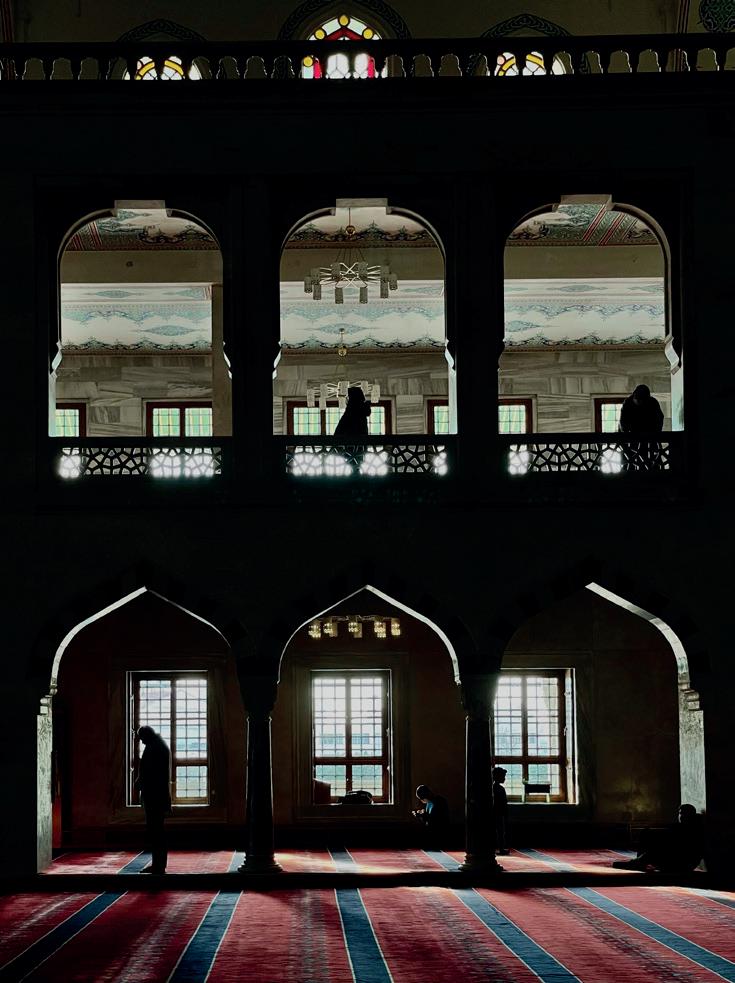
The word I‘tikaf means to stay in one place, restrain oneself, or remain in a specific location for the purpose of devotion. Thus, in the Five Volume Commentary, in light of i‘tikaf, we read:
“
نیفکاع (who remain for devotion) is the plural of فکاع which is derived from فکع They say ناکملا یف فکع i.e. he remained confined to a place, sticking to it. فاکتعالا and فوکعلا are words denoting a specified form of religious service in which the worshipper stays within the precincts of a mosque for a number of days which he passes in prayer and devotion (Aqrab & Mufradat).” (Five Volume Commentary, Vol.1, p. 219)
Spiritual seclusion before Islam
In the Holy Quran, in light of the commandment given to Prophet Abrahamas and Ishmaelas, we read:
mosque for spiritual reflection, i.e., i‘tikaf However, in the year he passed away, he extended this practice to 20 days of i‘tikaf (Sahih al Bukhari, Kitab al-i‘tikaf, Hadith 2044).
Hazrat Abdullah ibn Umarra narrates:
“The Holy Prophetsa used to practise i‘tikaf in the last ten days of the month of Ramadan.” (Sahih al-Bukhari, Kitab ali‘tikaf, Hadith 2025)
Then, Hazrat Aishara, the wife of the Holy Prophetsa, narrates:
Hazrat Aishara also narrates:
for etikaf. [Surah al-Baqrah, Ch.2: V.188]
“We also find further explanation of this issue in the ahadith that the etikaf of Ramadan can only take place in a mosque. Hence, Hazrat Aishara narrates:
“When the Messenger of Allah, peace and blessings of Allah be upon him, intended to observe i‘tikaf during the last ten days of Ramadan, he would pray Fajr and then enter the designated area where he would stay for the duration of the i‘tikaf.” (Sunan an-Nasa’i, Kitab al Masajid, Hadith 709)
Where to sit i‘tikaf
In light of Hazrat Khalifatul Masih V’s guidance regarding i‘tikaf, upon being asked
sunnah for one who is observing etikaf is not to visit a patient, not to attend a funeral, not to touch his wife or have conjugal relationships with her, not to go out of the mosque for anything except for the most necessary reasons that cannot be avoided. There is no etikaf without fasting and there is no etikaf except in a congregational mosque.’ [Sunan Abi Daud, Kitab al-Siyam, Bab al-mu‘takifi ya‘ood-ulmareeda]
“Thus, according to the Holy Quran and ahadith of the Holy Prophetsa, the masnun etikaf of Ramadan, as practised by the Holy Prophetsa, is the one that is observed for at least ten days in a mosque.” (Al Hakam, Issue 137)
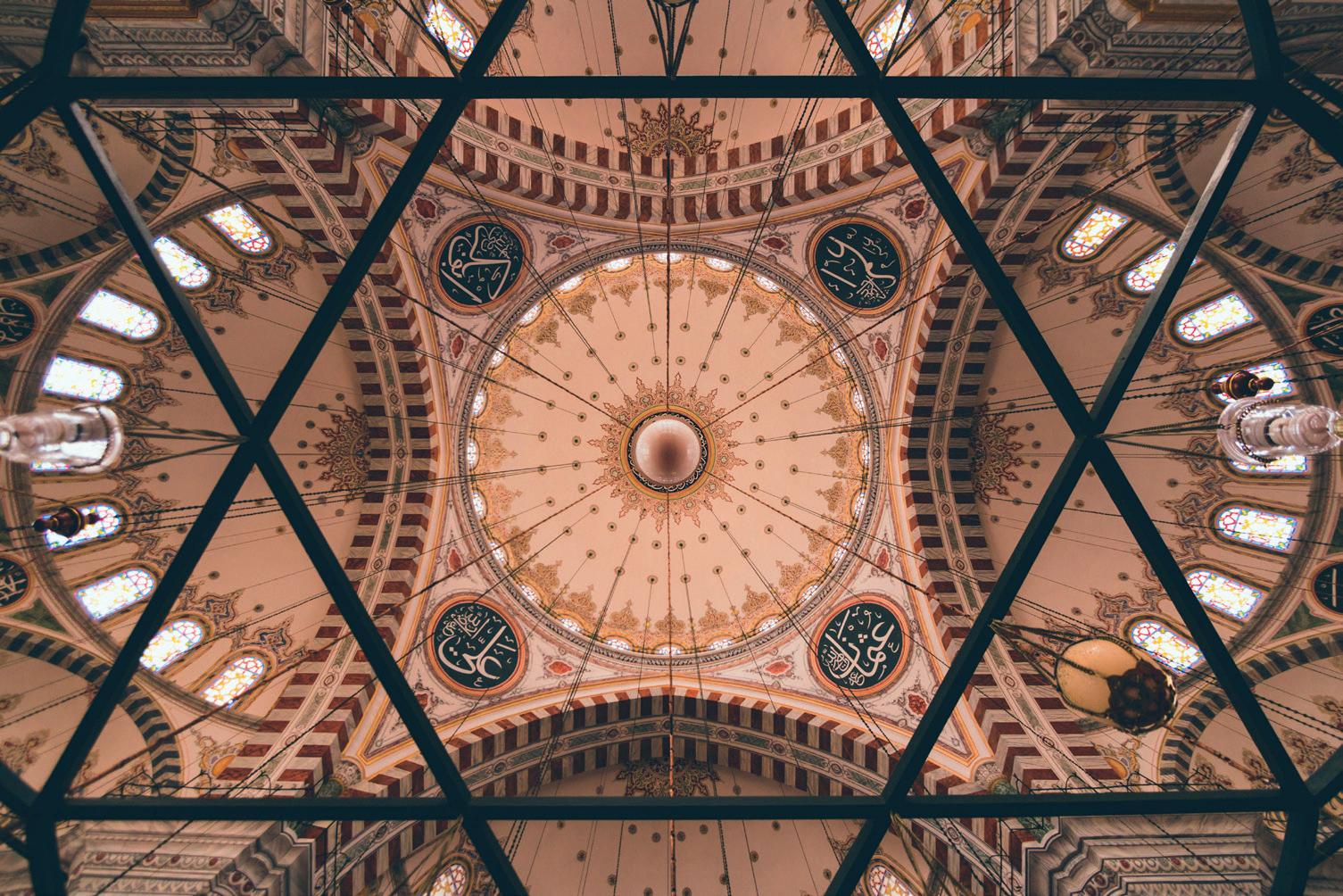
Virtues of i‘tikaf
“And [remember the time] when We made the House a resort for mankind and a [place of] security; and take ye the station of Abraham as a place of Prayer. And We commanded Abraham and Ishmael, [saying], ‘Purify My House for those who perform the circuit and those who remain [therein] for devotion and those who bow down and fall prostrate in Prayer.’” (Surah al-Baqarah, Ch.2: V.128)
Further, regarding Mary, mother of Jesus, we read:
“The Holy Prophetsa used to practise i‘tikaf in the last ten days of Ramadan till he passed away and then his wives used to practise i‘tikaf after him.” (Sahih al-Bukhari, Kitab al-i‘tikaf, Hadith 2026)
Further, we find a narration of Hazrat Abu Hurairara:
if it was permissible to perform i‘tikaf at home, Huzooraa answered:
“As far as the masnun etikaf [according to the practice of the Prophetsa] is concerned, which is performed during Ramadan, it is proven from the Holy Quran and hadith that it cannot be performed at home for three days.
As mentioned in the introduction of this article, i’tikaf is a spiritual practise in which one spends their time focusing on worship and spiritual reflection. The act of worship itself holds great significance in Islam as we are told that our very creation was for this purpose:
“And I have not created the Jinn and the men but that they may worship Me.” (Surah adh-Dhariyat, Ch.51: V.57)
Hazrat Ibn Abbasra narrated:
“And relate [the story of] Mary [as mentioned] in the Book. When she withdrew from her people to a place to the east, And screened herself off from them, then We sent Our angel to her, and he appeared to her in the form of a perfect man.” (Surah Maryam, Ch.19: V.17-18)
Another example of spiritual seclusion can be seen in the life of the Holy Prophetsa prior to prophethood. The Holy Prophetsa used to retreat to cave Hira, which was located on a mountain just outside the Haram area in Mecca. The cave of Hira was a secluded place where he would spend long periods of time in deep contemplation, meditation, and spiritual reflection.
When to sit for i‘tikaf
The Holy Prophet’ssa usual practice during the last 10 days of Ramadan was to sit in a
“The Holy Prophetsa used to perform i‘tikaf every year in the month of Ramadan for 10 days, and when it was the year of his demise, he stayed in i‘tikaf for 20 days.”
(Sahih al-Bukhari, Kitab al-i‘tikaf, Hadith 2044)
When to start i‘tikaf
The Holy Prophetsa used to perform i‘tikaf from the Fajr prayer of 20th Ramadan. Hence, the following is mentioned in a hadith. Hazrat Aishara narrates:
“It is evident from the practice of the Holy Prophetsa that he used to perform etikaf during Ramadan in the mosque for at least ten days. Hence, the following is mentioned in a hadith, narrated by Hazrat Aishara:
“‘The Holy Prophetsa used to perform etikaf in the last ten days of Ramadan till he passed away.’ [Sahih al-Bukhari, Kitab-ulEtikaf, Bab al-etikafi fil-eshril-awakhiri waletikafi fil masajidi kullihaa]
“Likewise, in the Holy Quran, where Allah the Exalted has mentioned matters related to Ramadan, there He has also given commandments regarding etikaf. He says:
“The Messengersa of Allah said concerning the person observing i‘tikaf, ‘He is refraining from sin and he will be given a reward like that of one who does all kinds of good deeds.’” (Sunan Ibn Majah, Kitab alSyam, Hadith 1781)
“When the Holy Prophetsa wanted to perform i‘tikaf, he would perform Fajr prayer and then he would enter his place of i‘tikaf.” (Jami` at-Tirmidhi, Kitab al Soum an Rasulullahsa, 791)
“That is, firstly, any conjugal relationship between a husband and a wife is not permitted during etikaf in Ramadan and secondly, mosques are the places designated
3 AL HAKAM | Friday 14 April 2023
ماقم نم اوذختاو ؕ انماو سانلِ ل ۃباثم تیبلا انلعج ذاو یتیب ارہط نا لیعمساو مہربا یلا اندہعو ؕ یلصم مہربا دوجسلا عکرلاو نیفکعلاو نیفئآطلِل
ایقرش اناکم اہلہا نم تذبتنا ذا ۘ میرم بتکلا یف رکذاو لثمتف انحور اہیلا انلسراف ۪۟ اباجح مہنود نم تذختاف ایوس ارشب اہل
رخاوألا رشعلا فکتعي ملسو هیلع هللا یلص هللا لوسر ناك ناضمر نم
رخاوألا رشعلا فکتعي ناك ملسو هیلع هللا یلص يبنلا نأ هدعب نم هجاوزأ فکتعا مث ،هللا هافوت یتح ناضمر نم
ةرشع ناضمر لك يف فکتعي ملسو هیلع هللا یلص يبنلا ناك اموی نیرشع فکتعا هیف ضبق يذلا ماعلا ناك املف ،مایأ
یلص فکتعي نأ دارأ اذإ ملسو هیلع هللا یلص هللا لوسر ناك هفکتعم يف لخد مث رجفلا
یلص فکتعي نأ دارأ اذإ ملسو هیلع هللا یلص هللا لوسر ناك هیف فکتعي نأ دیری يذلا ناکملا يف لخد مث حبصلا
رخاوألا رشعلا فکتعي ناك ملسو هیلع هللا یلص یبنلا نأ هللا هافوت یتح ناضمر نم
نوفکع متناو نہورشابت الو
الو ةزانج دہشی الو اضيرم دوعي ال نأ فکتعملا یلع ۃنسلا الو هنمدب ال امِل الإ ۃجاحِل جرخی الو اہرشابی الو ةأرما سمی عماج دجسم یف الإ فاکتعا الو موصب الإ فاکتعا “‘The
وہ :فکتعملا يف لاق ملسو هیلع هللا یلص هللا لوسر نأ تانسحلا لماعك تانسحلا نم هل ىرجیو بونذلا فکعي اہلك
This Week in History
A glimpse into the rich history of the Ahmadiyya Muslim Jamaat

14 - 15 April
14 April 1887: On this day, the Promised Messiahas wrote a letter to Hazrat Hakim Maulvi Nuruddin Sahibra In it, among other important matters, Huzooras informed him that today he was sending him five copies of his latest book, Shahna-e-Haq along with one part of the Rigveda through recorded delivery. (Maktubat-eAhmad, Vol. 2, p. 31)

14 April 1941: On this day, Yadvinder Singh Mahendra, the last Maharaja of Patiala, reached Qadian for his two-day visit. Patiala State was a significant princely state in British India, that enjoyed a degree of self-governance. It was located near Qadian. The Maharaja was given a warm welcome, and he had the honour of meeting Hazrat Musleh-e-Maudra
The details of this meeting have already been published in our article, titled “Coming from every distant track: Sir Maharaja Yadavindra Singh of Patiala visits Qadian”, Al Hakam, 23 July 2021, Issue 175, p. 13.
14 April 2006: On this day, Hazrat Khalifatul Masih Vaa inaugurated the 22nd Jalsa Salana of Jamaat-eAhmadiyya Australia with flag hoisting, followed by a Friday sermon. Huzooraa also granted audiences to Ahmadis. (Al Fazl International, 12 May 2006)
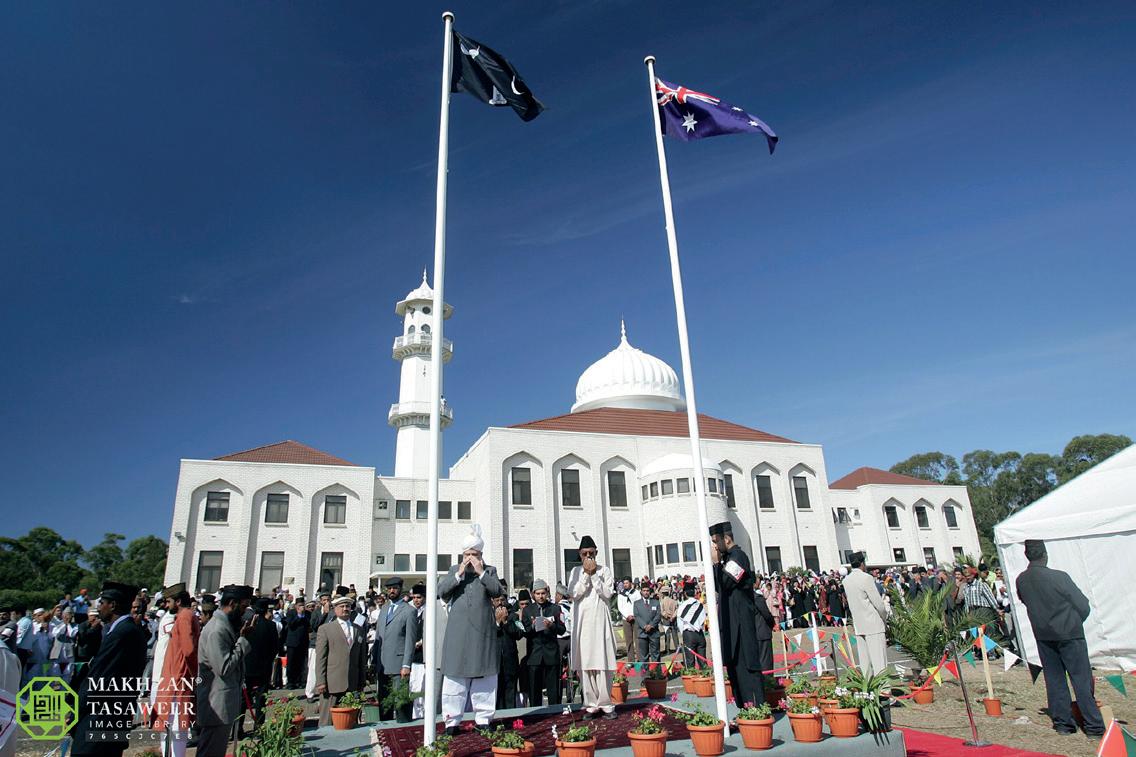
15 April 2013: On this day, Hazrat Khalifatul Masih Vaa delivered the concluding address at the second International Conference of Muslim Television Ahmadiyya (MTA), at the Baitul Futuh Mosque, London. (“International Conference of Muslim Television Ahmadiyya takes place in London”, www.pressahmadiyya.com)
16 April
16 April 1944: On this day, Hazrat Musleh-e-Maudra addressed the Jalsa Musleh-e-Maud in Delhi in front of 5,000 people. Some opponents attempted to create disorder and started pelting stones, which resulted in injuries to some Ahmadis. (Tarikh-eAhmadiyyat, Vol. 8, p. 610)
16 April 1970: On this day, during his visit to Nigeria, Hazrat Khalifatul Masih IIIrh addressed a press conference in Lagos, answered various questions, and shed light on the economic problems and their solution in light
of Islamic teachings. (Tarikh-eAhmadiyyat, Vol. 26, p. 45)
16 April 1999: During his Friday sermon on this day, Hazrat Khalifatul Masih IVrh mentioned the details of the martyrdom of Mirza Ghulam Qadir Sahib, which took place on 14 April in Rabwah. Huzoorrh said that he was the first martyr from the Promised Messiah’sas family. (For more details, see “Sahibzada Mirza Ghulam Qadir Ahmad Shaheed”, www.ahmadipedia. org)
16 April 2004: During his Friday sermon on this day, Hazrat Khalifatul Masih Vaa mentioned the blessings of Allah Almighty manifested during his recent tour of West Africa, and said that the continent of Africa is blessed, and their hearts are filled with the light [nur] of certainty. Huzooraa said that during the tour, the grace and blessings of Allah had showered with such abundance that it was beyond human thought. Moreover, Huzooraa also inaugurated the MTA2 TV channel.
16 April 2010: On this day, Hazrat Khalifatul Masih Vaa delivered his Friday sermon from the Jamaat’s salat centre, located in San Pietro in Casale, Bologna, Italy. Huzooraa instructed the Ahmadis to pray for the construction of a mosque there and told them that a part of this country was considered the centre of the Caliphate of the
Messiah of Nazareth. Huzooraa said, however, that now the Messiah of Muhammadsa is to raise the flag of Islam throughout the world, and this responsibility lies with every Ahmadi.
17 April
17 April 1905: Hazrat Hakim
Maulvi Nuruddin Sahibra authored an exquisite article about the earthquake in Kangra, India, in accordance with the prophecy of the Promised Messiahas. (Tarikh-eAhmadiyyat, Vol. 4, p. 166)
17 April 1970: On this day, during his visit to Nigeria, Hazrat Khalifatul Masih IIIrh delivered his Friday sermon from the Muslim Teachers Training College in Lagos. After the Jumuah prayer, Huzoorrh granted an audience to the students and professors of the Lagos University.
On the same day, the Pakistani High Commissioner, SM Qureshi Sahib, gave a reception in Huzoor’srh honour, which was also attended by the ambassadors of Sudan, Indonesia, Niger, and Sierra Leone. (Tarikh-e-Ahmadiyyat, Vol. 26, pp. 45-46)
18 April
18 April 1897: On this day, the Promised Messiahas issued a notification titled “Hearken Sardar Rajinder Singh Sahib”. In it, Huzooras aptly refuted a false and provocative publication by Sardar Rajinder Singh. (Majmuah-eIshtiharat [2019], Vol. 2, p. 274)
18 April 2008: On this day, Hazrat Khalifatul Masih Vaa delivered his Friday sermon from Bagh-e-Ahmad, near Accra, Ghana. Huzooraa said that on the occasion of the Khilafat Centenary, every Ahmadi should make a pledge to give precedence to the pleasure of Allah Almighty over everything else, to make the utmost efforts to worship Him and to act upon His commandments, and to fulfil the pledge of allegiance made with the Promised Messiahas
19 April
19 April 1970: On this day, during his visit to Ghana, Hazrat Khalifatul Masih IIIrh granted audiences to the members of the Jamaat. In the evening, Huzoorrh graced a reception at which various ambassadors, state ministers, church representatives and correspondents of radio and news
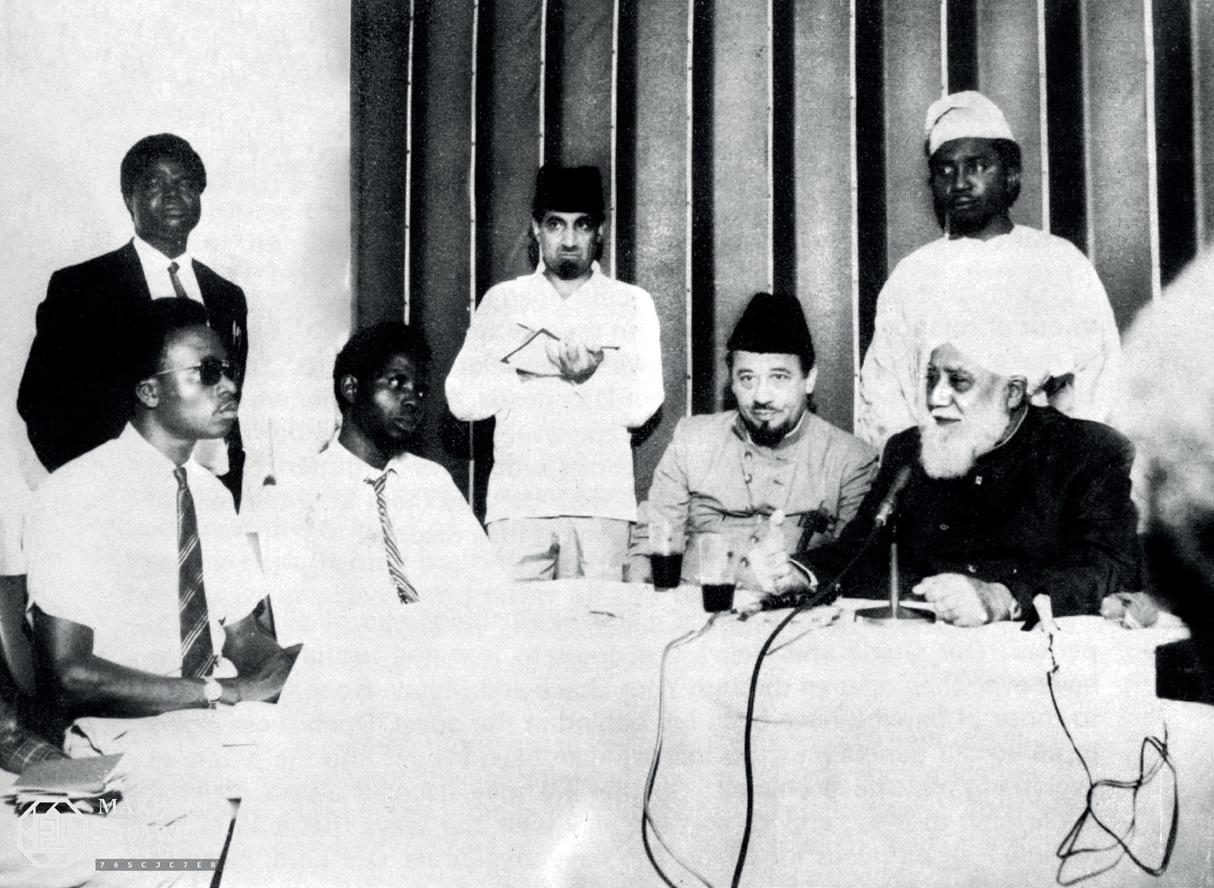
Friday 14 April 2023 | AL HAKAM 4
Mirza Ghulam Qadir Shaheed
Hazrat Khalifatul Masih IIIrh addressing a press conference in Lagos, Nigeria
Hazrat Khalifatul Masih Vaa leading du’a after flag hoisting in Australia
14 - 20 April


Kosovo Jamaat’s representatives meet with mayors of Kamenica
Besmir Yvejsi Kosovo Correspondent
Jamaat-e-Ahmadiyya Victoria, Australia, participates in interfaith event
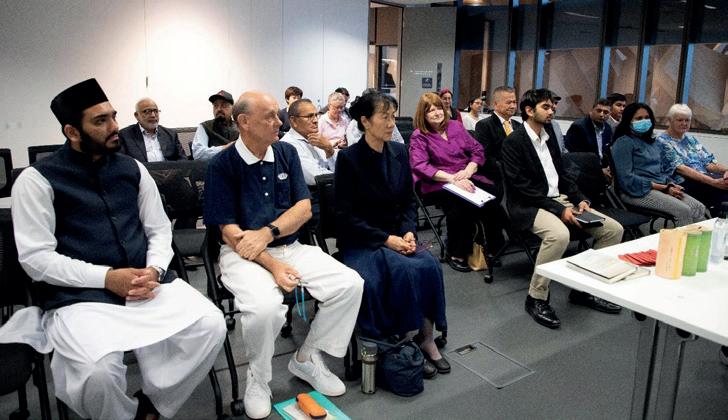
agencies were also present. A radio correspondent interviewed Huzoorrh, in which Huzoorrh said, Islam and Ahmadiyyat are the same and that Islam desires mankind to foster a direct relationship with their Creator. (Tarikh-e-Ahmadiyyat, Vol. 26, pp. 47-48)


19 April 2003: On this day, Hazrat Khalifatul Masih IVrh passed away in London. His funeral prayer was led by Hazrat Khalifatukl Masih Vaa and he was laid to rest in Islamabad, Tilford, UK.
19 April 2017: On this day, Hazrat Khalifatul Masih Vaa laid the foundation stone for the first Ahmadiyya mosque in the German university town of Marburg. Around 160 guests attended the ceremony, including the Lord Mayor of Marburg, Dr Thomas Spies and Soren Bartol, Member of the National Assembly. The keynote address was delivered by Huzooraa, where he explained Islamic teachings in relation to integration and building a harmonious society. (“Head of Ahmadiyya Muslim Community lays foundation stone for new Mosque in Marburg, Germany”, www. pressahmadiyya.com)
20 April

20 April 1893: On this day, Hazrat Mirza Bashir Ahmad Sahibra was born to the Promised Messiahas. His birth fulfilled the divine revelation: “The moon of the Prophets [Qamarul Anbiya] will arrive and your affair will become manifest. Allah will make your countenance cheerful and will illumine your reasoning. Soon a son will be born to you and grace will come close to you. My light is near.” (Tadhkirah [English], p. 279)
20 April 1952: During the night of 20 April, Hazrat Amma Jan, Syeda Nusrat Jahan Begum Sahibara , passed away in Rabwah. On 22 April, Hazrat Musleh-e-Maudra led the funeral prayer. She was buried in Bahishti Maqbarah, Rabwah.
20 April 1984: On this day, Hazrat Khalifatul Masih IVrh delivered his last Friday sermon in Pakistan before migrating to London. (Khutbat-e-Tahir, Vol. 3, p. 215)
On 14 March 2023, representatives of Jamaat-e-Ahmadiyya Kosovo met with the mayor of the municipality of Kamenica, Mr Kadri Rahimaj, and the chief of staff of the mayor, Mrs Lidiona Marovca, in the mayor’s office in Kamenica. During the meeting, the mayor was informed about the Jamaat’s activities worldwide and in Kosovo and the organisation of the 10 th Jalsa Salana Kosovo. Additionally, the mayor was apprised of the humanitarian activities of Humanity First in the world and in Kosovo, particularly those that had been successfully completed in the municipality of Kamenica through municipal cooperation with the exmayor Mr Qëndron Kastrati.

Later that same day, the representatives visited the mayor of the municipality of Hani i Elezit, Mr Mehmet Ballazhi, in his office in Hani i Elezit. The Director of the Directorate for Health and Social Welfare of the municipality of Hani i Elezit, Mrs Kimete Kuka, and the Director of the Centre for Social Work of the municipality of Hani i Elezit, Mr Amir Bushi, were also present at the meeting. The mayor was given a more comprehensive briefing on the Ahmadiyya Muslim Jamaat in Kosovo as well as in the world. The representatives also informed the mayor of the humanitarian activities of Humanity
First around the world and in Kosovo, focusing on social welfare, health, and education. On the other hand, representatives from the Jamaat Kosovo were apprised of the needs and other requirements facing this municipality in order to provide welfare to different
segments of the population.
On 15 March 2023, the representatives met with the representatives of the mayor of the municipality of Ferizaj, Mr Agim Aliu, in his office. The Chief of Staff of the mayor, Mr Albion Sherifi, the Acting Director of the Centre for Social Work in Ferizaj, Mrs Adelina Rexhepi-Braha, and the Head of the Social Welfare Sector in the Directorate of Health and Social Welfare of the municipality, Mrs Emira Sallahu, were also present at the meeting. As the mayor was on an official visit outside Kosovo, Mr Albion Sherifi chaired the meeting. During the meeting, the mayor was informed about the Ahmadiyya Muslim Jamaat, the efforts of Hazrat Khalifatul Masih Vaa to establish peace in the world, the National Peace Symposium in the UK, and the upcoming 10 th Jalsa Salana Kosovo. The representatives also briefed the mayor about the humanitarian activities of Humanity First in Kosovo and worldwide, focusing on social welfare, health, and education. The representatives from the Jamaat were also informed about the needs and requirements that the municipality faces in order to provide welfare to different segments of the population.
Atif Ahmed Zahid Missionary, Australia
Jamaat-e-Ahmadiyya Victoria, Melbourne East, Australia had the opportunity to be a part of the Harmony Week Celebrations organised by the Casey Multi-Faith Network. The programme was coordinated by the external affairs department, where I was fortunate enough to be one of the presenters at the event. The interfaith dialogue revolved around the theme of “How different faiths observe community service” and was held at the hub of the City of Casey Council offices at Bunjil Place, Narre Warren. The other speakers at the event were from Tzu Chi, a Buddhist organisation based in Taiwan, Sikh Interfaith Council of Victoria and Casey Women of the Year, representing the Christian faith. Among the guests from various communities and people, there were 11 Jamaat members who participated, including one tifl as well. It was a great opportunity to interact and introduce the Jamaat, as the MTA team was also present and acknowledged by the organisers for their assistance in live streaming the event and covering the whole event. We were able to make new contacts as well.
The dialogue was opened by myself. I started the conversation by presenting the teachings of the Holy Quran and the Holy Prophet Muhammad sa with a brief introduction to the Ahmadiyya Muslim Jamaat, and then further elaborated by presenting the details of the Jamaat’s efforts in various countries in terms of education, well-being and healthcare. I ended with information detailing the Community’s services in Australia. I also briefly mentioned the Ahmadiyya Muslim Doctors and Engineers Associations and how they volunteer their time and effort to serve humanity. I also introduced Humanity First and then explained how this was set up solely for the service of mankind.
This was the first event organised by the Casey Multi-Faith Network after their new committee was formed this year, where the secretary for external affairs of our Jamaat is also a committee member of the network and we look forward to organising more events with the Casey Multi-Faith Network throughout the year.
5 AL HAKAM | Friday 14 April 2023
“An Ahmadi ought to recite the Holy Quran as much as possible. This is essential for the month of Ramadan otherwise, simply fasting is futile.”
(Friday Sermon, 10 May 2019; Al Hakam, 7 June 2019, Issue 64, p. 14)
Answers to Everyday Issues
Part 52

Pauline Trinity, Jinn, ‘Ifrit, Promised Messiah, Latter Days and taking oaths

Guidance regarding basic Islamic issues – which Hazrat Amirul Momineen, Khalifatul Masih Vaa has given on various occasions in his written correspondence and during MTA programmes – is being officially published below for everyone’s benefit.

Pauline Trinity
A missionary from Kerala, India, wrote to Hazrat Amirul Momineen, Khalifatul Masih Vaa that the Promised Messiahas, had stated that “after the death of Jesusas of Nazareth, Paul initiated the concept of the Trinity.” However, according to Ahmadiyya beliefs, Prophet Jesusas lived for 120 years and Paul the Apostle died before that. The individual sought guidance on this matter. In his letter, dated 31 January 2022, Huzoor-e-Anwaraa provided the following answer to this question:
“In your correspondence, you made reference to a statement by the Promised Messiahas, which is taken from Huzoor’sas work, Chashma-e-Masihi. This publication was composed by Huzooras in response to a letter received from a Muslim individual in Bareilly, who had cited certain objections raised against Islam in Yanabi‘ul Islam, a book by a Christian author [i.e., The Original Sources of the Quran by W. St. Clair Tisdall, 1905].
In Chashma-e-Masihi, Huzooras provided a counter-response to the objections cited in that letter while drawing on the very beliefs of Christians and research conducted by non-Muslim scholars of Europe and America [on the subject]. Through this, he highlighted the reality of the corrupted teachings of Christianity. In this context, Huzooras also stated that, as per Judeo-Christian traditions:
“‘As long as Jesusas lived, Paul was his sworn enemy, and, according to Jewish chronicles, he only turned to Christianity after Jesus’ death because he had some selfish desires which the Jews did not fulfil. Therefore, in order to avenge himself, he became a Christian and pretended that Jesusas had appeared to him in a vision. He first sowed this unholy plant in Damascus, and this is the place where ‘Pauline Trinity’ was born.’ (Chashma-e-Masihi, Ruhani Khazain, Vol. 20, pp. 76-377)
“According to the words of Huzooras i.e., ‘according to Jewish chronicles’, it is evident that the death of Jesusas here refers to his death according to the JudeoChristian traditions, according to which it happened when he was crucified. However,
according to our belief, Allah saved His pious prophet from the cross to spare him from the cursed death described in the Bible [Deuteronomy 21:23]. Subsequently, he migrated to Kashmir in search of his remaining ten tribes, where he preached to his followers under the name ‘Prophet Yuz Asaf’. He passed away at the age of 120 and was laid to rest in Mohalla Khanyar, Kashmir, India, where his grave still exists. With regard to Paul’s case, while elucidating it, the Promised Messiahas writes in his other work, Kashti-e-Nuh:
“‘When the edict of disbelief was issued against Jesus, peace be upon him, Paul was also from the party that rejected him. Later, however, he promoted himself as an apostle of the Messiah. During the lifetime of the Messiah, this man was a strident opponent. Not one of the Gospels, which is attributed to the Messiah, prophesies that after him Paul will repent and become an apostle. There is little need to write about Paul’s character before his conversion, for the Christians are well acquainted with it. It is lamentable that for as long as the Messiah remained in his homeland, Paul caused him great grief. Yet after his deliverance from the cross, when the Messiah migrated to Kashmir, the same person entered himself amongst his disciples on the pretext of a fabricated dream, invented the doctrine of the Trinity, declared the flesh of swine to be lawful even though it was strictly forbidden in the Torah, and also made the consumption of wine a common practice. He entered the concept of the Trinity into the doctrine of the Gospel so that all these innovations would ingratiate the idol-worshippers of Greece.’ (Kashti-e-Nuh, Ruhani Khazain, Vol. 19, p. 65, footnote)

“Therefore, the specific reference to the death of Jesusas in the book Chashma-eMasihi pertains to his death in accordance with Judeo-Christian traditions, according to which it occurred when he was crucified, not according to our belief.”
Jinn, ‘Ifrit, Promised Messiahas, Latter Days and taking oaths
Someone from Jordan sent the following
questions to Hazrat Amirul Momineen, Khalifatul Masih Vaa:
1. Is everything out of sight a jinn and can Iblis and angels also be jinn?
2. Do Ahmadis believe in the existence of ‘ifrit?
3. We have read that the Promised Mahdi will appear in the Latter Days, are we really living in the Latter Days?
4. Can we take an oath in the name of Allah Almighty or the Holy Prophetsa or the Promised Messiahas?
5. Huzoor-e-Anwar, in his letter dated 10 February 2022, provided the following response to these queries:
1. Jinn
“In October 2021, I replied to your letter in which you asked about the jinn and the answer I sent also contains the answer to your first question. Please read it from there.”

(This answer by Huzooraa was published as the 46th instalment of “Answers to Everyday Issues” in Urdu in Al Fazl International on 23 December 2022, and in English in the Weekly Al Hakam on 30 December 2022. —ZK.)
2. ‘Ifrit
“As for the belief of the Ahmadiyya community about ‘ifrit, it is the same as what the Quran and Hadith have taught us. In Surah an-Naml, in the story of Hazrat Sulaimanas, Allah says:
“‘A powerful chieftain (from among the people of the hills) said, ‘I will bring that (throne) to thee before thou strikest thy camp; and indeed, I possess power
who possesses fiery qualities and a spirit of rebellion, has a quick temper, and is prone to anger. Therefore, people who engage in fights, riots, rebellion, and defiance or stubbornness are also referred to as ‘jinn’.
“Some of the nations that Hazrat Dawudas and Hazrat Sulaimanas conquered
(therefor), (and) I am trustworthy.’’ (Surah an-Naml, Ch. 27: V. 40)
“The word ‘jinn’, as I explained in my previous letter, is used in many senses. This term is also used to describe a person





were very hardworking and industrious, but they also possessed such fiery qualities and a rebellious nature. Hazrat Dawudas and Hazrat Sulaimanas used their Godgiven wisdom and knowledge to make these nations submissive and obedient.
“Similarly, to accomplish the diverse tasks of Hazrat Sulaiman’sas kingdom, Allah made several nations subservient to him, for whom the Holy Quran has used various words. In Surah Saba, verses 13–15, the term ‘jinn’ is used for such people, while in Surah Saad, verses 38–39, as well as in Surah al-Anbiya verse 83, the term ‘shayatin’ is used. In fact, these terms refer to the wicked and corrupt nations that Hazrat Sulaimanas defeated with Allah’s help and support and appointed to carry out various tasks for his empire. Among them, ‘Ifrit was also one of the leaders of a similar nation who held a high rank during the reign of Hazrat Sulaimanas
“The term ‘‘ifrit’ is also mentioned in the Hadith:
“Hence, Hazrat Abu Hurairahra narrated, ‘The Holy Prophetsa said, ‘An ‘ifrit (i.e., a wild barbarian of a hideous form) from among the jinn jumped on me yesternight suddenly, so as to spoil my prayer, but Allah enabled me to overpower him, and so I caught him and intended to tie him to one of the pillars of the mosque so that all of you might see him, but I remembered the invocation of my brother Sulaymanas: ‘O my Lord, grant me forgiveness and bestow on me a kingdom that will not suit anyone after me.’ (Surah Saad, Ch.38: V.36) So, I scolded him and drove him away.’’ Imam
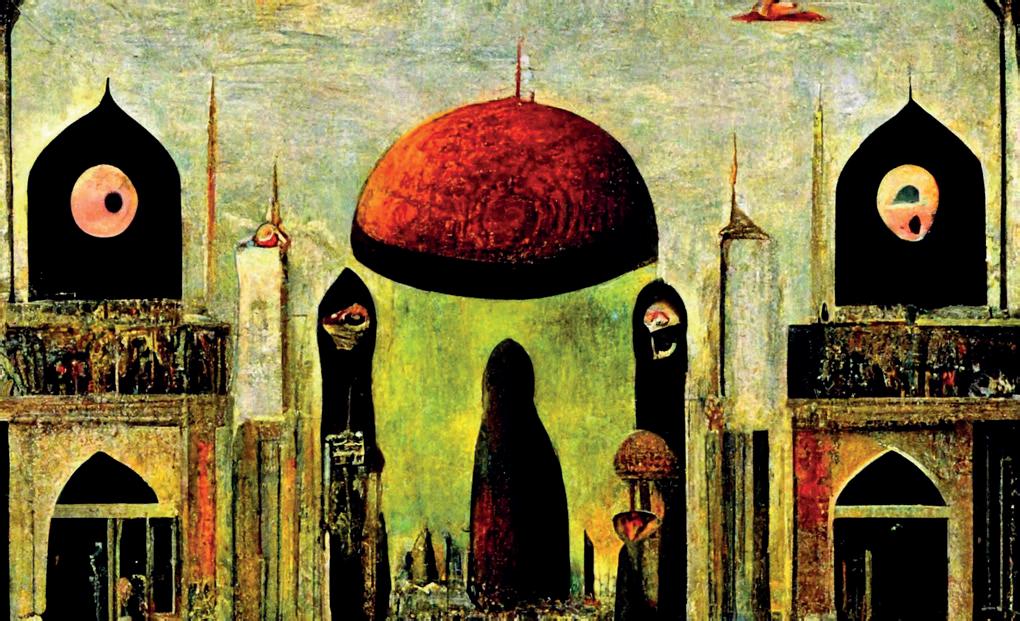
Friday 14 April 2023 | AL HAKAM 6
کماقم نم موقت نا لبق هب کیتا انا نجلا نم تیرفع لاق نیما ىوقل هیلع
ینا و ۚ
Bukhari states that the meaning of ‘ifrit is ‘rebellious’, whether it be human or jinn (Sahih al-Bukahri, Kitab ahadithi l-anbiya, Bab qawlillahi ta‘ala ‘wa wahabna li dawuda sulaymana…’)
“This incident has been mentioned in Sahih al-Bukhari in several other places as well. In the hadith of Kitab as-Salat, the term ‘‘ifrit’ has been used for the person who disrupted the prayer of the Holy Prophetsa, but in Kitab al-Jumu‘ah, Bab ma yajuzu mina l-‘amali fi s-salat, the narration uses the word ‘shaytan’.
“This incident can also be a kashf i.e., a vision shown by God into future events, namely that human beings with fiery qualities, rebellious thinking, evil and corrupt satanic tendencies will engage in enmity and incite war against the Holy Prophetsa to prevent him from fulfilling his duties. They will do this by trying to kindle the flames of animosity and provoking restless and unruly tribes to rise up against him. However, Allah the Exalted will put these wicked people under his control, and they will be humiliated and reduced to a state of disgrace by their failed attack.
“As history has shown, this is indeed what then transpired; Allah the Exalted granted the Holy Prophetsa complete victory and dominion over his enemies who had the traits of ‘afarit. Nonetheless, while Hazrat Sulaimanas, under divine will, enslaved defeated nations, who remained in his service until the end, the Holy Prophetsa, blessed with immense mercy and compassion for humanity, taught the emancipation of slaves, as is evident from the last part of this narration, and then he and his companions freed millions of slaves.
“If this incident is taken literally, it proves that a wicked and abominable person or animal of a vicious, wild, and savage nature attacked the Holy Prophetsa at night while he was praying, causing a disturbance in his prayer. However, the Prophet managed to control the human or animal and intended to tie it to the pillar of the mosque, but then he freed it out of his natural and instinctive mercy and compassion.
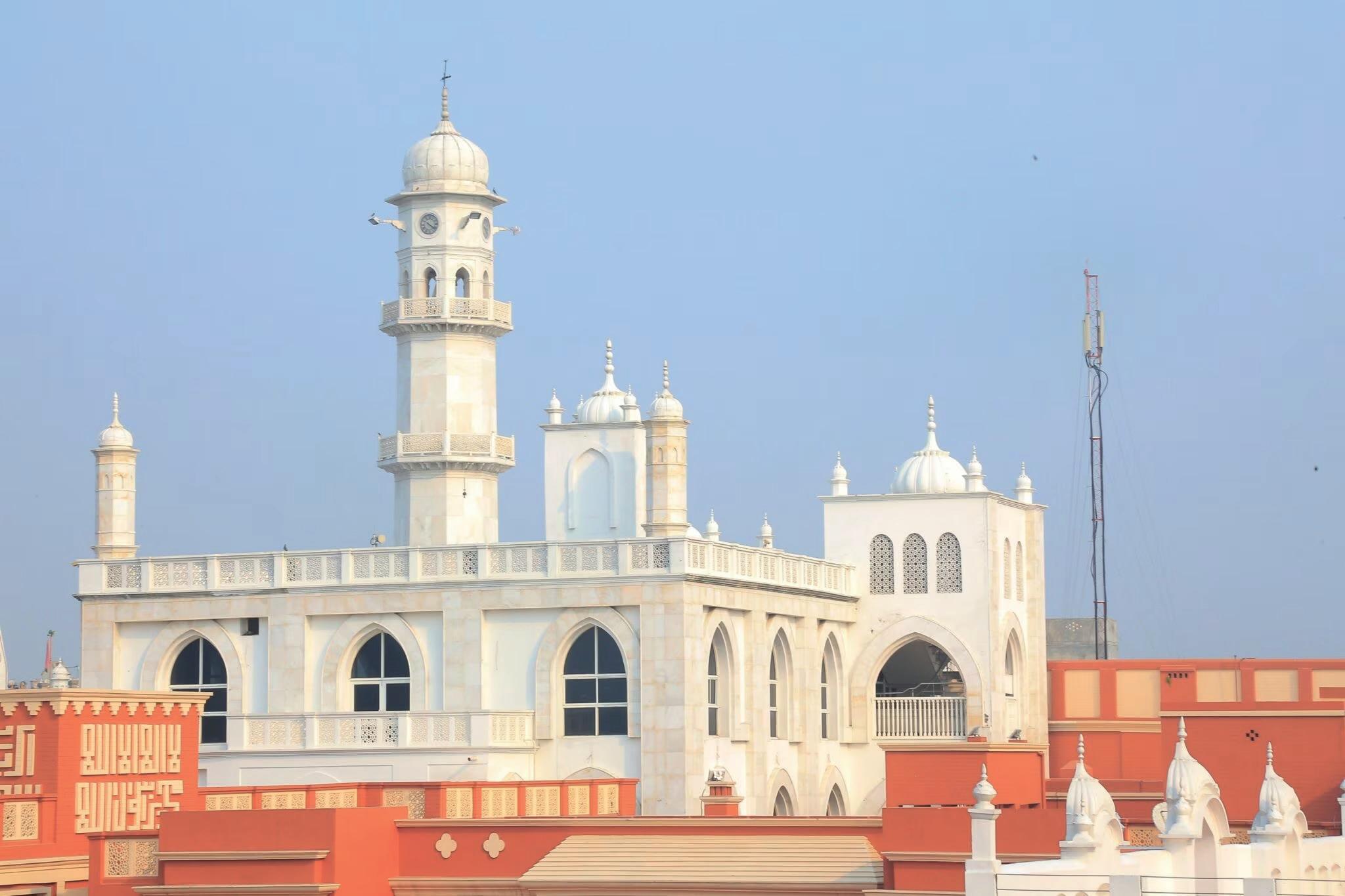
“In the commentary of Surah al-Naml [in Tafsir-e-Kabir, Vol. 7, p. 394], Hazrat Musleh-e-Maudra discusses the lexical meaning of the word ‘ifrit and quotes Aqrab al-Mawarid as follows:
“‘‘1) One who is sharp, vigorous and effective in an affair, exceeding the ordinary bounds therein, with craftiness or cunning.
2) One who is wicked or malignant.’’ [Said al-Shartuni, Aqrab al-Mawarid, Vol. 2, Qom: 1403 AH, p. 802; Malik Ghulam Farid, Dictionary of the Holy Quran, p. 581]
“Then, while describing the incident of Hazrat Sulaimanas and the Queen of Sheba in the commentary of this verse [27:40], Hazrat Musleh-e-Maudra writes the following about ‘Ifrit:
“‘Hazrat Sulaimanas thought that the gift brought by Hudhud would not be effective enough, so something else should be ordered. So he said, ‘O my chiefs! Before those people come to me obediently, who will bring me the queen’s throne?’ One of the leaders of those who were special bodyguards said that he would bring that throne before any invasion took place. As the leader of the army, he knew how long they would camp there. He estimated that the queen’s throne could be brought in a few days after making the queen fearful, and he
also claimed that he was a powerful leader and that the army of this small country could not compete with him. He also assured that he was loyal to Hazrat Sulaimanas and would not commit any betrayal while bringing this wealth.’ (Tafsir-e-Kabir, Vol. 7, p. 394)”
3. Promised Messiahas and Latter Days
“As for our era being the End Times and the advent of the Promised Messiah and Mahdi in this era, it is established by the Holy Quran, the ahadith, and the sayings of the elders of the ummah that the Holy Prophetsa prophesied the arrival of the Messiah and Mahdi in his ummah at the end of the 13th
the Holy Prophetsa placed his hand on the shoulder of Hazrat Salman al-Farisira and said, ‘When faith has ascended to the Pleiades, one person or many people of Persian descent will re-establish faith in the world.’ (Sahih al-Bukhari, Kitab at-tafsir, Surah al-Jumu‘ah) In other words, Allah’s Messengersa designated the advent of this man of Persian descent, through whom faith was destined to be re-established in the world in the Latter Days and the glory of Islam was to be restored, as if it were his own advent.
Hazrat Nimatullah Walirh, a respected figure of the Faith, who had the gift of visions, wrote in his famous Persian qasidah about the conditions of the Latter Days.
years, five of which had already passed by the time of our Holy Prophetsa, as shown by the numerical value of the words of Surah Al-‘Asr. By now six thousand years of this era have gone and a thousand years remain. It has been prophesied, not only by the Holy Quran but by many earlier scriptures, that the last Messenger, who will appear in the likeness of Adam, and will be named the Messiah, will appear at the end of the sixth millennium, just as Adam was born towards the end of the sixth day. All these signs should suffice for a man of understanding.
“‘According to the Holy Quran and other Divine scriptures, the seven millenniums have been further divided as follows: First millennium: for the spread of guidance and virtue. Second millennium: for the dominance of Satan. Third millennium: for the spread of guidance and virtue. Fourth millennium: for the dominance of Satan.
Fifth millennium: for the spread of virtue (this was the millennium in which our lord and master the Holy Prophetsa appeared for the reformation of mankind and Satan was put in shackles). Sixth millennium: for the release and dominance of Satan (this millennium extends from the end of the third century of the Islamic era to the beginning of the fourteenth). Seventh millennium: for the supremacy of God and His Messiah, spread of virtue and faith and righteousness, establishment of the Unity of God and Divine worship, and dominance of every virtue.
century Hijri or the beginning of the 14th century Hijri. Hence, Allah the Exalted states:
“‘He will establish His command from the heaven to the earth according to His plan, then it will ascend to Him during a period, which, according to your reckoning, will extend to a thousand years.’ (Surah asSajdah, 32:6)
“This verse states that Muslims will continue to weaken in the world for a thousand years. After that, in exact accordance with the prophecies of the Holy Prophet Muhammadas, an appointee will emerge who will restore the glory of Islam in the world, and Islam will be firmly reestablished once again.
“The Holy Prophetsa declared the first three centuries of Islam as the best centuries, and it was destined that the thousand years in which the faith was to ascend to the heavens would surely begin after these three centuries. Therefore, after 1300 years, the revival of the religion of Islam was destined, which could only happen through the appearance of the Mahdi and Messiah. This is so because Allah the Exalted had decreed the advent of the Messiah and Mahdi as the advent of the Holy Prophetsa in the following verse of Surah Jumu‘ah:
“It means that Allah will raise him among others besides the companions who have not yet joined them. (Surah al-Jumu‘ah, Ch. 62, V.4)
“At the time of the revelation of this verse, when the Companions inquired,
He stated that when ghayn ra, i.e., 1200 years, would have passed, he sees strange and astonishing things happening. [...] He sees both the Mahdi and Messiah of that time riding as kings. (Muhammad Ismail Shaheed, Al-Arba‘in Fi Ahwal al-Mahdiyyin, 1268 AH, pp. 2, 4)
“Hazrat Shah Waliullah Muhaddith Dehlavirh (d. 1176 AH), writes:
“‘My Lord has informed me that the Day of Resurrection has drawn near and the emergence of the Mahdi is imminent.’ (AlTafhimat Al-Ilahiyyah, Vol. 2, Tafhim No. 147, 1936 CE, Madinah Barqi Press, Bijnor, UP, p. 133)
“Moreover, the Promised Messiahas has elaborated on this subject with great clarity in numerous places, stating that these are those Latter Days in which the Promised Messiah and Mahdi was foreordained to be sent for the reformation of the ummah of the Holy Prophet Muhammadsa. Hence, Huzooras states:
“‘But the Holy Quran tells us that God is the Eternal Creator Who, if He so wills, may destroy the heaven and earth billions of times and create them anew just as before. God has informed us that the present human race originated from Adam, our common ancestor who came after the previous ‘races’, and this human race has an age of seven thousand years, and that these seven thousand years are to God just as seven days are to man. It has been decreed by the Divine law that every ‘race’ has a lifespan of seven thousand years, and it is to highlight this fact that the seven days have been ordained for man. Thus, the time ordained for the children of Adam is seven thousand
“‘We are now at the head of the seventh millennium and there is no room for any other Messiah to come after this, because there are only seven millennia that have all been divided into good and evil. All Prophets have spoken of this division whether in passing or in detail. But the Holy Quran has mentioned it very clearly, and from this we deduce the prophecy about the Promised Messiah.
“‘It is indeed remarkable that all Prophets, in one way or the other, have foretold about the time of the Messiah and the mischief of the Antichrist. In fact, no other prophecy has been made so frequently and with such consistency.’ (Lecture Lahore, Ruhani Khazain, Vol. 20, pp. 184-186)
“At another place, he says:
“‘Yet another proof of the authenticity of his Prophethood is that the scriptures of all the Prophetsas as well as the Holy Quran show that, from Adam to the end, God has ordained the age of the world to be seven thousand years, with a thousand year periods both for light and for darkness. In other words, there is a period for righteousness to prevail and a period in which evil and misguidance reign supreme. According to the Divine scriptures, both these epochs are divided into periods of one thousand years each. [...]
“‘Then came the fifth millennium, which was the age of guidance. The advent of our Holy Prophetsa took place in this millennium. Through him, God reestablished Tauhid in the world. The mere fact that he appeared in the millennium which had been destined for guidance since eternity, is enough to prove that he was from God. This is not only my view, but all the Divine scriptures testify to it. This fact also proves the authenticity of my own claim of being the Promised Messiah,
7 AL HAKAM | Friday 14 April 2023 Continued on next page >>
Mastermaak|Wiki Commons
ناك موی یف هیلا جرعي مث ضرالا یلا ءامسلا نم رمالا رب دی نودعت امم ۃنس فلا هرادقم
مہباوقحلی امل مہنم نیرخآو
ایہت ىدہملاو تبرتقا دق ۃمایقلا نا هلالج لج یبر ینملع جورخلِل
<< Continued from previous page
because, according to this division of periods, the sixth millennium is the time of darkness and evil. This thousand-year period starts three hundred years after the Hijrah and ends at the turn of the fourteenth century. The Holy Prophetsa had designated those belonging to the sixth millennium as Faij-e-A‘waj [The misguided horde].
“‘The seventh millennium in which we live is that of light and guidance. Since it is the last millennium, it was inevitable that the Imam of the latter days should be born at the turn of this millennium. After him, there is no Imam and no Messiah except the one who comes in his image, for in this millennium the world comes to an end, as all the Prophetsas have testified. This Imam, whom God has designated as the Promised Messiah, is the Mujaddid [Reformer] of this century as well as of the last millennium. Even the Christians and the Jews do agree that, counting from the time of Adam, the present millennium is the seventh. God has disclosed to me the time of Adam, as calculated upon the numerical values of the letters of Surah al-‘Asr. This too proves that we are now in the seventh millennium. All Prophetsas are in agreement that the Promised Messiah would be born at the end of the sixth millennium and make his appearance at the turn of the seventh, for he would be the last to come, as Adam was the first.’ (Lecture Sialkot, Ruhani Khazain, Vol. 20, pp. 207-208)
“Thus, these are indeed the Latter Days in which, in exact accordance with the prophecies of the Holy Prophetsa, God Almighty appointed the Prophet’ssa spiritual son and most ardent devotee, the Promised Messiah and Mahdi, as the Khatam al-Khulafa [Seal of Successors] for the revival of Islam.”
4. Taking an oath
“As for the matter of taking an oath, one should not take oaths without a valid reason. If there is a need and the person taking the oath is on the side of truth, he can only take an oath by God Almighty. It is not permissible for a person to take an oath by another person. Hazrat Abu Hurairahra narrated that the Holy Prophetsa said:
Introduction to chapters of the Holy Quran
Surah ash-Shams, al-Lail, ad-Duha, al-Inshirah, at-Tin, al-‘Alaq, al-Qadr, al-Bayyinah,
az-Zilzal, al-‘Adiyat
The English translation of the introduction to chapters of the Holy Quran as given by Hazrat Mirza Tahir Ahmad, Khalifatul Masih IVrh is being presented for the benefit of our readers. Insha-Allah, in the coming issues, we will endeavour to publish the introduction to all chapters of the Holy Quran.
“‘Do not swear by your fathers, or by your mothers, or by idols; and swear by Allah only if you are truthful.’ (Sunan Abi Dawud, Kitab al-imani wa n-nudhur)”
91. ash-Shams
This Surah was revealed at Mecca, and, including the basmalah, it consists of 16 verses.
The prophecy has been made once again in the current Surah that the sun of Islam will rise again, the moon that will reflect the sun’s light will illuminate once again, a dawn will break, and thereafter a dark night will prevail again. That is, there is no dawn whereafter the darkness of negligence fails to engulf mankind.
Next follows a great proclamation that every soul has been created by Allah Almighty in line with justice and has been revealed the ability to distinguish between its good and bad. He who develops and benefits from the abilities bestowed upon him will prosper; whereas he who corrupts the abilities granted him will be ruined.

Next follows the description of the people of Thamud and the she-camel of their messenger. Maybe it is also a reference to the point that once the people (of Thamud) hamstrung the she-camel that was used by Hazrat Salehas for delivering the Divine message, huge destruction befell them. Thus, whenever the enemies of the prophets cut off the means of transport used to deliver the Divine message, they were destroyed invariably.
This Surah was revealed at Mecca, and, including the basmalah, it consists of 22 verses.
Surah ash-Shams (sun) is followed by Surah al-Lail (night), as a day is followed by a night. “Al-Lail” here does not signify a night of the world; rather, throughout the Surah, spiritual aspects of the night have been presented in a very becoming manner. It is accompanied by the glad tiding that a day has to dawn after a night prevails. It says that just as the effects of a day and a night are different, similarly, the endeavours of mankind are either dark like a night or bright like a day. Every individual gets their reward according to their deeds and beliefs. Thus, those who, out of fear of Allah, spend in His cause and for the welfare of the poor and testify to the word of goodness when it reaches them, Allah the Almighty will make their ways easy for them. As against them, a person who is niggardly, is unmindful of its consequences and rejects the word of
welfare when it reaches them; about him, Allah says He will make their way difficult for them.
Finally, the evil person, whose characteristics are mentioned above, is threatened with a blazing fire, wherein he will enter; and the person who spent
Having described the distinguishing merits of the Holy Prophetsa in this magnificent Surah, Allah says: Have We not opened for you your bosom fully? And has Allah, by His grace, not enabled you to discharge the burden of trust that you carried? And has your name not been
his wealth on good deeds and adopted righteousness will definitely be saved from that fire.
This Surah was revealed at Mecca, and, including the basmalah, it consists of 12 verses.
This Surah too gives glad tidings of a day that will have become fully bright, and a night that will follow it. Addressing the Holy Prophetsa, Allah Almighty says that He will not forsake him in the time of extreme darkness and difficulties, and his every latter hour will be better than the former. Another glad tiding has also been given that Allah the Almighty will give him abundance. So he should treat the orphans well, not chide the one who asks, and, God forbid, not hide from mankind any favours on him in fear that they will come to an end. The more you spend in the cause of Allah the Almighty, the more He will increase it further.
This Surah was revealed at Mecca, and, including the basmalah, it consists of 9 verses.
exalted? Thus, remember the eternal truth that every hardship is followed by ease. Every hardship is followed by ease. That is, the same principle applies temporally as well as spiritually. Thus, once you are free from your daytime activities, stand up for the worship of your Lord and satisfy your heart with His love.
95. at-Tin
This Surah was revealed at Mecca, and, including the basmalah, it consists of 9 verses.
Surah al-Inshirah is followed by Surah at-Tin, which in fact is an explanation of ‘
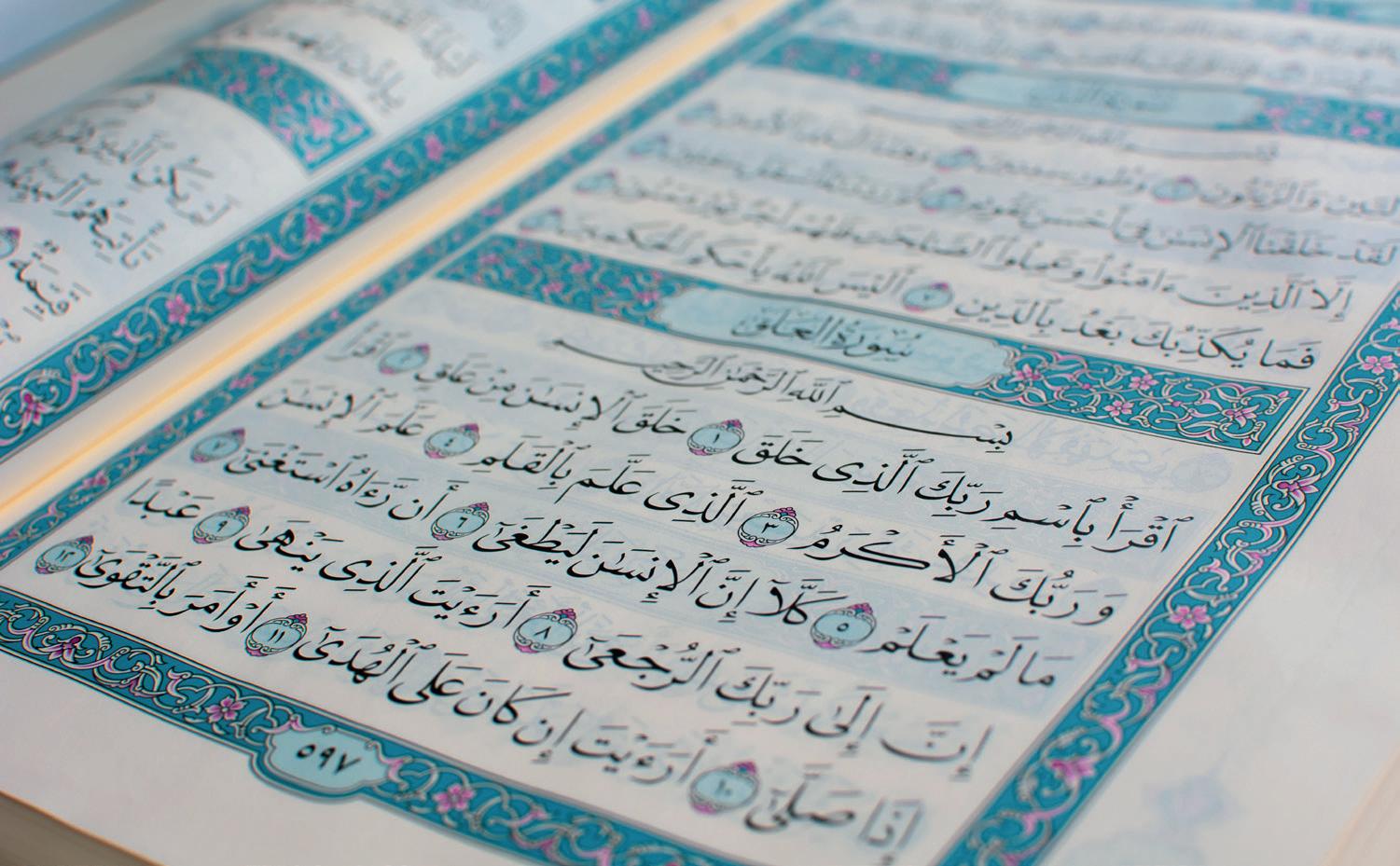
‘Surely, there is ease after hardship. (Aye), surely, there is ease after hardship.’ (Surah alInshirah, Ch.94: V.6-7)]
This (Surah) reveals an endless evolution. Fig and olive have been cited as witnesses in it, i.e., Adamas and Noahas; and Mount Sinai, i.e., that mountain of Mosesas where Allah the Almighty manifested Himself; and then this Town of Security, which was the hometown of the Holy Prophetsa. Along with this step-by-step spiritual progress, this proclamation has also been made that, in the same manner, developing Man from lower states, We
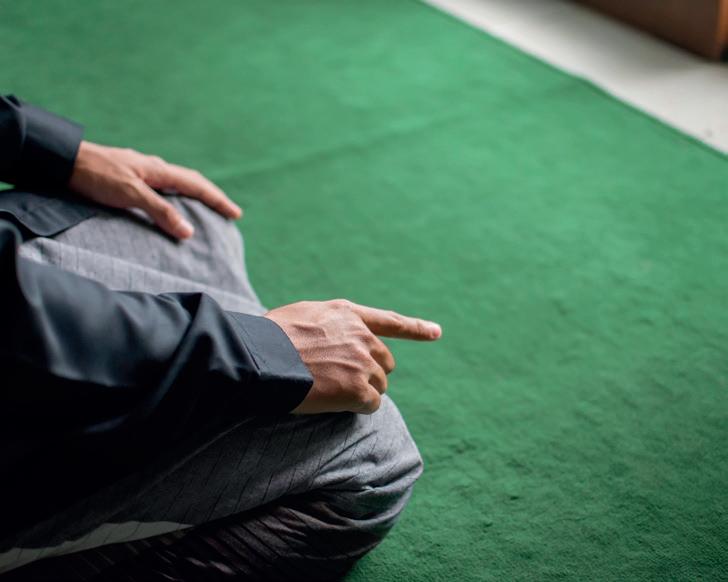
Friday 14 April 2023 | AL HAKAM 8
الإ اوفلحت الو دادنألاب الو مکتاہمﺄب الو مکئابآب اوفلحت ال نوقداص متنأو الإ هللاب اوفلحت الو هللاب
(Compiled by Zaheer Ahmad Khan, Head of Records Department, Private Secretariat, London. Translated by Al Hakam.)
92. al-Lail
93. ad-Duha
94. al-Inshirah
ار ی ر علا عم نا ۔ار ی ر علا عم ناف’ [i.e,
have brought him to his final evolutionary stages. But for that unfortunate one who fails to benefit from it, We revert him to the lowest of those who revert to the lower level. In other words, it is a reference to endless reverse progress. But for those who believe and do good deeds, their spiritual progress will be endless. Thus, whoso still rejects Allah’s Messengersa with regards to religion, then Allah the Almighty is the best of Judges in his case.
96. al-‘Alaq

This Surah was revealed at Mecca. It was revealed foremost of all the Surahs and, including the basmalah, it consists of 20 verses.
The coming of revelation started with this Surah, wherein Allah the Almighty commands the Holy Prophetsa to read in the name of the Lord, Who created everything. By saying ‘read’ again, the proclamation has been made that, ‘read in the name of the most Honourable Lord, Who put the secrets of all human success in the pen.’ No progress was possible if Man had not been invested with the pen and the ability to write.
Thereafter, every such person has been warned who hinders worship. He has been warned with the (evil) end that if he did not desist, We will seize him by his lying and sinful forelock, then let him call for help whomsoever he may; We too have angels of Hell who punish severely.
97. al-Qadr
This Surah was revealed at Mecca, and, including the basmalah, it consists of 6

verses.
This Surah gives a glad tiding that the Quran, whose revelation has begun, has the power to light up all types of dark nights. Thus, here it is a reference to an extremely dark night of the time of the Holy Prophetsa, wherein disorder had prevailed all over sea and land. But as a result of the dark nights’ supplications of the one who had consumed himself in the way of Allah, a dawn broke, i.e., the revelation of the Holy Quran started, whose light was to stay until the Last Day.
رجفلا علطم یتح یہ signifies that the revelation will continue to come down until the dawn breaks fully. Further, a proclamation is made that one moment of the Night of Decree is better than somebody’s endeavours of a whole of their lifetime, in case somebody attains it.
98. al-Bayyinah
This Surah was revealed at Mecca, and, including the basmalah , it consists of 9 verses.
It was mentioned in the preceding Surah that the revelation sent down in the Night of Decree will explain everything so well as if a dawn has broken. The current Surah mentions that Allah had also granted a smaller-scale Night of Decree to the past prophets; otherwise, on account of their mere endeavours, they would not have been able to turn the night of their time into a dawn.
Next, with regards to the Holy Prophet sa it states that a compendium of all the books, given to the past prophets, has been included in his teachings. And the summary of their teachings was to

worship Allah the Almighty by being sincere to Him in obedience, observing prayer, and paying the Zakat. And this is such a religion, which itself will last forever and will also keep mankind on the right path.
Following is the news of the evil and good ends of both the disbelievers and believers in that, once the right religion comes, every individual has the liberty either to follow it and achieve a good end, or reject it and end up in evil.
99. az-Zilzal
This Surah was revealed at Mecca, and, including the basmalah , it consists of 9 verses.
This Surah makes mention of those changes in the Latter Days in whose result Man will believe that they have overpowered the laws of nature. Whereas whatever secrets the earth will put forth in that age, it will do by the command of your Lord. In that age, a time for worldly reward and punishment will also come for mankind when they will witness that their worldly progress availed them nought except that they destroyed themselves by going into warfare with each other. Thus, on that day, every person will be rewarded for his smallest virtue as well as his smallest evil.
At the beginning of the Surah, it is mentioned that the earth will throw up her burdens, and in this very connection, it is stated at the end that not only the weighty virtues and evils will be accounted for, but if somebody had done a virtue equal to the smallest particle, they would be rewarded for it as well; and they would

also get punished for an evil even up to the smallest particle.
100. al-‘Adiyat

This Surah was revealed at Mecca, and, including the basmalah , it consists of 12 verses.
After the mention of the wars that are to take place for worldly reasons, the defensive wars of the Holy Prophetsa and his Companions ra have been mentioned, which, from every aspect, are different from worldly warfare, and produce good results. The swift horses have been cited as witnesses who, breathing quickly, assault the enemy while their hooves produce sparks of fire. They make raids at dawn, and not at night. This is a sign of the highest standard of bravery; otherwise, it comes everywhere for those fighting for the world that they attack secretly.
Further, it states that Man is very ungrateful to his Lord and he himself bears witness to it. He is passionate in his love for wealth. Here it is a reference to the point that all worldly warfare is fought to acquire riches only. So, does he not know that when all the secrets of the Earth are disclosed and all the secrets in peoples’ hearts will become manifest, that day Allah the Almighty will be well aware of them?
(Translated from the original introduction of chapters as presented in the Urdu translation of the Holy Quran by Hazrat Mirza Tahir Ahmad, Khalifatul Masih IVrh. Translated into English by Shahid Mahmood Ahmad, missionary in Ghana )
9 AL HAKAM | Friday 14 April 2023
“[In the days of Ramadan], pray that Allah the Almighty enables us Ahmadis to fulfil the rights owed to God Almighty and His creation whilst instilling taqwa [fear of God]
within ourselves and to partake of the blessings of Ramadan.” (Friday Sermon, 24 April 2020; Al Hakam 22 May 2020, Issue 114, p. 40)
100 Years Ago...
Second Ahmadi missionary to America with a message of Hazrat Khalifatul Masih II
The Moslem Sunrise, April & July 1923
Hazrat Mufti Muhammad Sadiqra (18721957)
Catechism
1. Who are you?
Ans: I am an Ahmadi Moslem.
2. What is an Ahmadi Moslem?
Ans: One who accepts the religion of Islam as expounded by the latest Divine Reformer, the Prophet Ahmad[as] of India.
3. What do you believe?
Ans: I believe in One God (no Trinity or Fourinity); I believe in His Angels, His Prophets and His Books; I believe in life after death and in the Judgment of our deeds - good and bad; I believe in boundless forgiving from God; I believe in God’s kingdom prevailing over each and every thing; I believe that Jesus[as] Christ is dead and gone like all other prophets of God; I believe in one Spiritual Head of the whole Moslem Community, the Khalifatul Masih.
4. What are the practical obligations of an Ahmadi Moslem?
Ans: To say five daily prayers to God; to keep the month of fasting; to give alms in charity; to make a pilgrimage to Mecca; to live a peaceful life; to help the cause of the Mission; to give the message of Truth to others; to visit the sick; to help convey the coffin of the dead; to visit the headquarters at Qadian whenever possible; to sympathize with all.
5. Who is the Founder of Islam?
Ans: The Master-Prophet Muhammad, on whom be peace and blessings of God.
6. Who is the Founder of the Ahmadia Movement?
Ans: The Prophet Ahmad[as] of Qadian, the Promised Messiah and Mehdi.
7. Who was the first successor to the Prophet Ahmad[as]?
Ans: His Hazrat Nur-ud-Din of the Blessed Memory.
8. Who is the present Head of the Ahmadi Brotherhood?
Ans: His Hazrat Mirza Basheer-ud-Din Mahmud Ahmad, may Allah save him long.
9. What books are you supposed to study?
Ans: (a) The Holy Quran – which contains all the Truth necessary for man.
(b) The traditions of the Holy Prophet Muhammad[sa], which show the way of the Book of God.
(c) The writings of the Promised Messiah Ahmad[as], which truly explain the teachings of the Quran.
10. What is the slogan of Islam?
Ans: There is none adorable but God and Muhammad[sa] is the Messenger of God.
11. What is the motto of the Ahmadia Movement?
Ans: “I will keep my Faith above the world.”
Note As the April [1923] number [of The Moslem Sunrise] was delayed on account of certain financial difficulties, this issue combines both the April and July numbers, and its special features are Prayers, Meaning of Moslem Names, Calendar of Islamic Year and such other educational articles useful to new converts to Islam; this number has been named “New Moslem’s Number.”
Maulvi Muhammad Din BA
Maulvi Muhammad Din, BA, [former] Headmaster of TI High School, Qadian, and editor of The Review of Religions, the missionary designated for America, landed in Boston from England on 27 March [1923] and reached Chicago on 29 [March

Tabligh stall held in Aalborg, Denmark
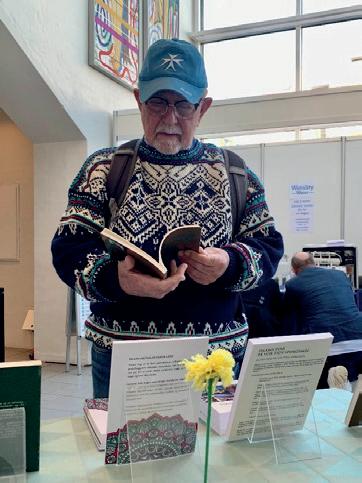


forth efforts in the cause of truth and faith, not only like those here, but even going a step higher.
“A believer should strive to excel in the works of Faith. Strive hard then to acquire the knowledge of Faith; see Islam in its true and bright form and make others see its illustrious face.”
True salvation of [African] American
The real solution of the [African American] question
My Dear [African] Americans, Assalaam-o-Alaikum. Peace be with you and the mercy of Allah.
Majlis Ansarullah Denmark participated, for the first time, in a festival organised in Aalborg — the second largest city in Denmark — which was organised on the theme of “body, mind and soul”. This city is 407 kilometres from Copenhagen. Majlis Ansarullah was also able to participate in the fair organised earlier in Copenhagen and considering the interest of the people, Majlis Ansarullah decided to participate in all four fairs organised by the administration of the four locations.
This is the second festival of the year that is being held in the city of Aalborg. The festival was held from 3-5 March 2023, in the cultural centre of Aalborg city.
1923]. He has taken up his work in earnest under the guidance of Mufti Muhammad Sadiq DD. May Allah help him long and make him a success. […]
Message of Hazrat Khalifatul Masih II[ra]
The Message (brought by Maulvi Muhammad Din BA, the second missionary of Islam to America):
From, His Holiness Mirza Basheer-ud-Din Mahmud Ahmad[ra], the Blessed Leader of the Ahmadia Movement.
To, The New Moslems in America.
“Assalam-o-Alaikum. Peace be with you and the mercy of Allah.
“Though physically I am far away from you, in spirit, I am one with you and my heart is enraptured with love for you. You are a part of myself in our Brotherhood. I regard you all with the same loving consideration as I regard the people who live right here in Qadian. Yet I desire to see you putting
The Christian profiteers brought you out of your native lands of Africa and in Christianizing you, they made you forget the religion and language of your forefathers – which were Islam and Arabic. You have experienced Christianity for so many years and it has proved to be no good. It is a failure. Christianity cannot bring real brotherhood to the nations. So, now leave it alone. And join Islam, the real faith of Universal Brotherhood. We have opened a School of Islam and the Arabic Language. Join Islam in the Ahmadia movement, founded by Ahmad[as] of India, the Prophet of the day, and be blessed.
For further information, address all letters to:
Ahmadia Movement, 4448 Wabash Ave., Chicago, Ill.
How to address a letter to the Leader of the Ahmadia Movement
To, His Hazrat Mirza, Basheer-ud-Din Mahmud Ahmad, Khalifat-ul- Masih II.
Qadian, (Gurdaspur) Punjab, India.
(Transcribed by Al Hakam from the original, published in The Moslem Sunrise, April and July 1923)
At this fair, more than fifty organisations set up different stalls, including the stalls of different Christian churches, Buddhists, and other organisations. Majlis Ansarullah Denmark was able to participate in this festival for three days this year. The organiser of this fair expressed great happiness that we are included in this fair as representatives of Islam. This is the first time someone from an Islamic organisation has formally joined. More than 5,000 people visited this fair. Many people purchased the Holy Quran and in the same way, other literature was also distributed. There was also an arrangement for listening to the Holy Quran at the stall, where people would put on headphones and listen to the recitation from the Holy Quran.

Friday 14 April 2023 | AL HAKAM 10
تہکابرو للّٰہا حمۃرو م لع ملسلاا
Maulvi Muhammad Din, BA
Muhammad Akram Mahmood Sadr Majlis Ansarullah Denmark
How Satan is shackled during Ramadan
Fuad Alam Student Jamia Ahmadiyya UK
The Holy Prophet Muhammadsa is reported to have said, “When Ramadan begins, the gates of Paradise are opened and the gates of Hell are closed, and the devils are put in chains.” ( Sunan an-Nisa’i, Kitab as-siyam, Hadith 2099)
It is important to consider the figurative meaning of this statement rather than taking it literally. It is not that Satan willingly submits to God and accepts his chains and sulks in a corner of a dark room for a month; rather, this saying is a powerful symbol that represents the profound spiritual transformation that takes place during Ramadan. During this month, Allah gives us countless opportunities to spend our time in the right way and makes it easy for us to do so. This saying is, therefore, a reminder for us to make the most of the advantages and opportunities offered by Ramadan by advancing our spiritual well-being and getting closer to Allah.
Food and drink
Fasting enables us to act upon and reflect on an important commandment of God the Almighty:
“Eat and drink but exceed not the bounds; surely, He does not love those who exceed the bounds.” (Surah al-A‘raf, Ch.7: V.32)
Excessive consumption of any substance inevitably has side effects. Fasting, however, enables us to fulfil God’s call and restrain our natural inclination to overindulge in eating and drinking, especially in our modern society that promotes hyper-consumption.
During Ramadan, we have a unique opportunity to overcome Satan’s temptations and regulate our eating and drinking habits. By doing so, we develop self-discipline and cultivate an awareness of our physical and spiritual needs. Nevertheless, it is essential to keep the above teaching in mind even when we break our fast or take the morning meal.
Almsgiving
A reduction in our daily food intake goes hand in hand with a drop in spending on food. As Muslims, in our quest to attain the happiness of Allah, we make sure that money goes to those who need it far more. Our empty stomachs leave the hands of the less fortunate full.
In Ramadan, we are reminded of the Prophetic practice of increasing charity in this month, and therefore, Satan –who otherwise threatens people with poverty and enjoins upon them what is foul (Surah al-Baqarah, Ch.2: V.269) – is crushed by Muslims who are motivated to give charity to the poor and needy.
“[Show] kindness to parents and to kindred and orphans and the poor, and speak to men kindly.” (Surah al-Baqarah, Ch.2: V.84)
“Help one another in righteousness and piety.” (Surah al-Ma’idah, Ch.5: V.3)
This month shuts Satan outside and prevents him from whispering into the hearts of believers to quarrel and fight. Hence, by observing Ramadan and following the teachings of Islam, we can strive towards a more peaceful and harmonious society.
beginning their fast, carries blessings as per the saying of the Holy Prophetsa ( Sunan an-Nasa’i , Kitab as-siyam, Hadith 2146) Moreover, it provides energy and sustenance for the body during the day-long fast. However, beyond its practical purpose, suhoor offers a spiritual opportunity for believers to pray additional prayers in the latter part of the night and distance themselves from Satan in accordance with the following commandment:
wake up for it in the [latter part of] the night as a supererogatory service for thee. It may be that thy Lord will raise thee to an exalted station.”
Bani Isra’il, Ch.17: V.80)
The following verse further highlights how salat , in general, helps a person distance themselves from Satan:
Prayer restrains [one] from indecency and manifest evil, and remembrance of Allah indeed is the greatest virtue. And Allah knows what you do.” (Surah
Ch.29: V.46)
Conclusion
Allah states in the Quran:
Prayer and additional worship
“Those who spend their wealth by night and day, secretly and openly, have their reward with their Lord; on them [shall come] no fear, nor shall they grieve.” (Surah al-Baqarah, Ch.2: V.275)
Kindness
It was narrated by Hazrat Abu Hurairah ra that the Holy Prophet sa said:
“Fasting is a shield, so let [the fasting person] not utter any obscene or ignorant speech, and if someone tries to fight him or insult him, let him say, ‘I am fasting,’ twice.” ( Sahih al-Bukhari , Kitab as-sawm, Hadith 1894)
With peace being the very meaning of Islam, quarrels and fights are already looked down upon in the religion. However, we have been directly instructed by the Prophet Muhammadsa to abstain from any such activity this month – being ever cautious. As a result, this impacts how we treat those around us, enabling us to once again fulfil the ordinance of God:
Ramadan is a transformative time that offers an opportunity for change, especially for those who may struggle to engage in nawafil consistently throughout the year.

The emphasis on reading and studying the Holy Quran, offering the pre-dawn prayer – Tahajjud – and engaging in voluntary prayers enables one to excel in spirituality. The collective community atmosphere during Ramadan serves as a shield against Satan’s attacks.
The Holy Quran is recited and studied extensively during this month, as Allah states:
Thus, for a Muslim who pushes to fulfil every rite of Ramadan, Allah’s blessing comes beckoning. By following every practice, Muslims unlock doors to success and triumph and say goodbye to vices and dark alleyways to sin.

However, this comes with a condition. Despite all the benefits we receive from this blessed month, we can lose them just as quickly if we neglect to apply what we have learned. That is why it is important to strive to open the doors to heaven for ourselves and keep Satan away even after Ramadan.
“The month of Ramadan is that in which the Quran was sent down as a guidance for mankind with clear proofs of guidance and discrimination.” (Surah al-Baqarah, Ch.2: V.186)
With the recitation and contemplation of the Holy Quran, Satan’s influence diminishes.
Sahoor
Sahoor or the pre-dawn meal that Muslims eat during the month of Ramadan before
In his 2021 Eid-ul-Fitr sermon, Hazrat Khalifatul Masih Vaa stated that the true blessings of Ramadan will only be recognised when a true change is brought about. Furthermore, one will only experience the true happiness of Eid when these changes become a permanent part of one’s life. (“ Love for Allah and Humankind – the True and Everlasting Eid & Special Prayers for Palestine and the World ”, www.reviewofreligions.org )
Ramadan is the key to opening the gates of Paradise, and as Muslims, we all search for a way to escape Satan and the allure of sin. Thus, when the gates of Paradise open for a pious believer who follows the Sunnah and fears God, the gates of Hell close in response, and Satan is shackled.
May God guide us through the gates of Paradise.
11 AL HAKAM | Friday 14 April 2023
نیف رسملا بحی ال هن ا ۚا وف رست ال و ا وب رشا و ا ولك
لع و ا رس راہنلا و لیلاب مہلا وم ا ن وقفنی نی ذل ا مہیلع ف وخ ال و مہب ر دنع مہ رج ا مہلف ۃینا ن ون زحی مہ ال و
نیکسملا و یمتیلا و یب رقلا ى ذ و اناسح ا نی دِلا ولاب و انسح سانلِل ا ول وق و
ى وقتلا و ربلا یلع ا ون واعت
تنیب و سانلِ ل ى دہ ن ا رقلا هیف ل زن ا ى ذلا ناضم ر رہش ناق رفلا و ى دہلا نم
کب ر کثعبی ن ا یسع ٭ۖ کل ۃلفان هب دجہتف لیلا نم و ا د ومحم اماقم “And
(Surah
رک ذل و ؕ رکنملا و ءآشحفلا نع یہنت ة ولصلا ن ا ن وعنصت ام ملعي هللا و ؕ ربک ا هللا “Surely,
al-‘Ankabut,
Opinion
A brief economic analysis of Ramadan

Naosheyrvaan Nasir Australia
The past few years have been anything but ordinary, and there is no need to repeat what others have said regarding the pandemic and the post-pandemic environment we are currently in. This is true from an economic perspective, as much as any other perspective. However, given the high inflationary environment that advanced economies are currently experiencing, and the fact that Ramadan has now dawned on us once again, it made me think about how an external event like Ramadan would affect an economy. From a microeconomic perspective (i.e., the individual), it makes logical sense that consumption habits would differ during Ramadan, with more time allocated towards spirituality and less time towards buying goods and services. However, how this plays out on a macroeconomic scale (i.e., how it affects the entire economy) is something worth exploring.
The book, The Economic System of Islam, written by Hazrat Mirza Bashiruddin Mahmud Ahmadra, is more oriented to the study of political economy. Huzoorra makes the case for the Islamic economic system as the most just to all the market participants, compared to both capitalism and communism. In contrast, the modern study of economics demands mathematics and statistics to explore the relationship between economic variables and economic theories. An introduction to the book can be found here; www.alhakam.org/ the-economic-system-of-islam/ (Al Hakam, 12 October 2018, Issue 30, p. 12), while Investopedia provides a good explanation of the difference between the political economy and economics. I, however, want to explore the way economic indicators respond when an entire economy is going through Ramadan. This makes sense on a micro-level since individual households will adjust their consumption habits to accommodate the demands of fasting from dawn till dusk.
In any economics model, be it theoretical, empirical (i.e., derived from mathematical relationships), or a hybrid of the two, one constant feature is that it always relies on a set of assumptions. These assumptions allow us to study the impact of an event or stimulus on an economic model without having to factor in every variable, and it is also much easier to wrap your head around a few variables when everything else is assumed to be static.
The list of assumptions for this model is as follows:
1. Our hypothetical economy will be an open economy, that is, imports and exports will influence the outcome of
our analysis, but the exchange rate will remain an exogenous (constant) variable.
2. Interest is an exogenous variable, that is, it is a constant and does not affect our analysis. This is especially important as to consider the true economic benefits of Ramadan the influence of interest must be kept out of our model as interest is something that Islam has forbidden.
3. Institutions such as banks and the government are stable, but there will be no intervention from them at all.
4. The main marker of growth or decline in this economic analysis will be inflation, which ultimately will affect our interpretation of the model.
5. The unemployment rate will be constant, i.e., it will not be affected by our analysis. Everyone in the economy that has a job will continue to have one, and anyone unemployed will remain unemployed.
6. Everyone in the economy is fasting (with the exceptions of children, the aged, mothers of newborns and mothers-tobe, the sick, the injured, travellers etc.).
7. The analysis will look at the month before Ramadan, the month of Ramadan, and the month following it. The month before Ramadan will resemble the high inflationary period that advanced economies are currently in. The origins of this high inflation will mirror the post-Covid economic environment where stimulus money played a role in creating high inflation.
8. The stimulus money given during the pandemic was not spent during the pandemic, i.e., we assume that there was no online shopping.
So, now that the assumptions have laid the groundwork, we now have an economy one month out from Ramadan. The main characteristics are that inflation is yet to increase, the pandemic-era restrictions on social distancing have been eased for the population and the stimulus money provided during the pandemic is yet to be spent. From a microeconomic perspective, the stimulus that has been paid to workers during the pandemic is now facilitating a consumption boom, where individuals suddenly have an increased level of purchasing power. An increase in purchasing power results in more demand for goods and services than the supply available, resulting in higher revenue for businesses. Naturally, on a macroeconomic scale, this incentivises businesses to increase their prices until the supply and demand are at even levels. Businesses across the economy that raise their prices will start to
erode the purchasing power of individuals as more money is paid for the same quantity.
Should this pattern of price increases continue, then a decreased purchasing power will incentivise competition between workers and their employers, with the former threatening to leave unless their wage is increased to restore their purchasing power. Once wages are increased, purchasing power is restored, which incentivises businesses to continue raising their prices contributing to what is
to either maintain prices at their current rate or begin lowering them to continue attracting customers and prevent their revenue from drying up. Since businesses no longer have the incentive to raise prices, this disincentivises workers from demanding higher pay, which puts a stop to the wage-price spiral from the previous month. This behaviour continues for an entire month, and inflation starts coming down simply because the population is not utilising all its purchasing power, nor are workers demanding a premium on their wages to compensate for the erosion of their purchasing power that was caused by high inflation.
Now that Ramadan has passed, and inflation is lowering by the day, more households are regaining their purchasing power after having it eroded. Inflation will not decrease forever and will eventually plateau, providing stability to both businesses and consumers on the price of goods and services. The wage-price spiral that once threatened to implode the economy has now gone and workers are content with their wages, businesses are happy with their revenues and consumers are happy with the post-Ramadan cost of living. This shows the Islamic month of Ramadan has the potential to positively impact the population from an economic perspective and cool down an overheating economy without the need for any expensive (and potentially counterproductive) government intervention.
known as the wage-price spiral. (https:// www.investopedia.com/terms/w/wageprice-spiral.asp) This pattern continues until other expenses, such as utilities and rent start becoming too expensive to afford, creating a cost-of-living crisis. Any emergencies requiring a household to pay a large sum of money upfront (surgery, insurance claims, etc.) would most likely drag that household deep into poverty. From a macroeconomic perspective, the economy is now overheating as a high level of inflation lowers the purchasing power, which is increasing the conflict between employers and employees and dragging more households into poverty.
Now, as Ramadan starts, and the population (minus the exceptions) is fasting, naturally, consumption starts to decline as their attention is drawn more towards their spirituality, leaving them less time to utilise their purchasing power. From a macroeconomic perspective, the whole population beginning to neglect their purchasing power at its current rate reverses the incentive businesses once had to raise prices. Rather, it incentivises them
With any economic model, there will always be flaws. If any of the assumptions fail to hold, then this analysis fails to hold. The assumptions, being very specific and many, may seem very unrealistic, but I have deliberately set it this way so readers from a non-economic background can follow along without too much difficulty. Another fault of this model will be a lack of consensus, as this analysis is very subjective and I have not cited any quantitative data to back up the various relationships and assumptions I have made. Lastly, I was very specific in setting the economic environment before Ramadan began, whereas any other environment would violate the whole model. My analysis also assumes that Ramadan is not a profitable time for businesses, however, in the real world, the concept of fairs, bazaars and night markets after iftar is very common, and my model assumes that after iftar everyone stays home and spends more time focusing on their spirituality.
Feel free to disagree with me, as the beauty of a discipline like economics is that you know the answer to whatever model or theory you come up with once that event or timeline passes, and you have concrete data to compare your forecast against.
Friday 14 April 2023 | AL HAKAM 12
A remarkable Biblical prophecy and the Holy Prophet’s advent
Haris Ahmad
Student Jamia Ahmadiyya Canada
The concept of prophethood is central to many religions, including Islam and Christianity. Both religions believe in the existence of prophets who were sent by God to guide humanity and convey His message. Interestingly, the advent of the Holy Prophet Muhammadsa is also mentioned in the Bible. This remarkable prophecy is also mentioned in the Holy Quran, and over the years, many Christians have raised objections to it, claiming that the Quran has distorted this biblical prophecy by applying it to Prophet Muhammadsa, instead of Jesusas (Wherry, Elwood Morris, and George Sale. A Comprehensive Commentary on the qurán. Comprising Sale’s Translation and Preliminary Discourse, with Additional Notes and Emendations; Together with a Complete Index to the Text, Preliminary Discourse, and Notes. K. Paul, Trench, Trubner & Co1896. preface p. 7); (Geisler, Norman L., and Thomas A. Howe. When Critics Ask: A Popular Handbook on Bible Difficulties. Baker Books, 1992. pp. 125-126)
The prophecy mentioned in the Bible is found in the book of Deuteronomy, where it states:
“I will raise them up a Prophet from among their brethren, like unto thee, and will put my words in his mouth; and he shall speak unto them all that I shall command him.” (Deuteronomy, 18:18)
This prophecy is addressed to Mosesas, and many Christians interpret it to refer to Jesusas (Henry, M., & Church, L. F. (1960). Matthew Henry’s commentary on the whole Bible. Marshall, Morgan, & Scott, p. 624-625); (Jamieson, R., Fausset, A. R., & Brown, D. (1886). A commentary, critical, practical, and explanatory, on the old and new testaments: With A bible dictionary, compiled from dr. Wm. Smith’s standard work, and a copious index, chronological tables, maps and illustrations. W.J. Shuey, pp. 299-300)
However, it is also mentioned in the Holy Quran in several chapters.
Surah al-Ahqaf:
‘Tell me, if this is from Allah and you disbelieve therein, and a witness from among the children of Israel bears witness to [the advent of] one like him, and he believed, but you are too proud, [how should you fare]?’ Verily, Allah guides not the wrongdoing people.” (Surah al-Ahqaf, Ch.46: V.11) Surah
“‘Those who follow the Messenger, the Prophet, the Immaculate one, whom they find mentioned in the Torah and the Gospel [which are] with them. He enjoins on them good and forbids them evil, and makes lawful for them the good things and forbids them the bad, and removes from them their burden and the shackles that were upon them. So those who shall believe in him, and honour and support him, and help him, and follow the light that has been sent down with him — these shall prosper.’” (Surah al-A’raf, Ch.7:158) Surah al-Muzzammil:
Isra’il being called each other’s brothers. (Geisler, Norman L., and Thomas A. Howe. When Critics Ask: A Popular Handbook on Bible Difficulties. Baker Books, 1992, pp. 125-126) This does not necessarily mean that the prophesied messenger must come from Bani Isma‘il; however, a closer look at the texts makes it clear that in those references, the term “brothers” is used individually to refer to specific individuals within Bani Isra’il. In contrast, the prophecy mentioned in Deuteronomy refers to another group of people who are collectively called the “brethren” of Bani Isra’il. This group is believed by Muslims to be the people of Bani Isma‘il, as they
however, as mentioned above, Jesus was lifted up – as per the Christian belief. (Luke, 24:51)
Fourth and final sign: “And will put my words in his mouth; and he shall speak unto them all that I shall command him.”
It’s worth noting that the Gospels were written after the time of Jesus as and in a different language than the one he spoke. ( www.college.columbia.edu/core/content/new-testament/ context) Thus, while they hold great religious significance, they cannot be considered the literal word of God. On the other hand, every word of the Holy Quran is directly from God and to this day remains unchanged.
“Verily, We have sent to you a Messenger, who is a witness over you, even as We sent a Messenger to Pharaoh.” (Surah al-Muzzammil, Ch.73: V.16)
The objections raised by Christians are based on a misunderstanding of the Quranic verses that mention this prophecy. The Quran does not distort the biblical prophecy, but rather confirms and fulfils it by referring to the advent of the Holy Prophet Muhammadsa. The Bible mentions many prophets who were sent by God, including Mosesas, Jesusas, and the Holy Prophet Muhammadsa. However, each prophet had a certain mission and message, and the prophecy in Deuteronomy has specific conditions and signs attached to it.
To further explain how this prophecy alludes to the Holy Prophetsa, we shall, albeit briefly, break it down and look at the signs mentioned within, so that it is easy to digest.
First sign: “I will raise them up a Prophet”
Muslims believe that Muhammadsa was a Prophet of God, but Christians claim that Jesusas possesses the characteristics of both a perfect man and a perfect God. So, how can this prophecy of Deuteronomy apply to Jesusas? In the entire history of mankind, if God were to descend on the earth for the first and last time, referring to him as a Prophet would be a hard blow to his grandeur and majesty.
Second sign: “From among their brethren”
This, in a nutshell, means that the Prophet to be raised would be from among the brethren of Bani Isra’il.
When we read Chapter 25 of the book of Genesis, it reveals the ancestral connection between Bani Isra’il and Bani Isma‘il. Thus, proving that the people of Bani Isra’il are collectively the brothers of Bani Isma‘il.
(Genesis, 25)
Some Christian scholars argue that there are references in the Bible to Bani

are the only other descendants of Prophet Abrahamas who are mentioned in the same context as Bani Isra’il.
Third sign: “Like unto thee”
This means that the Prophet who was to be raised among the brethren of Bani Isra’il will reflect and bear a likeness to Prophet Mosesas
We shall now determine who best fits this description, while keeping in mind the Christian beliefs when referring to Jesus.
Point 1: As Prophet Mosesas was a law-bearing, so too was the Prophet Muhammadsa, who was to be like Moses, was a law-bearing prophet; however, Jesusas did not bring any law. (Matthew 5:17)
Point 2: Prophet Moses as and Prophet Muhammadsa completed the mission assigned to them by Allah, passed away, and were buried at the place of their demise. However, Prophet Jesus as, as Christians believe, left his mission and was lifted to be saved from Romans.
(Mark, 16:19)
Point 3: Both, Prophet Moses as and Prophet Muhammadsa migrated to their land where they faced opposition;
When we examine the lives of these two Prophets – Prophet Moses as and Prophet Muhammadsa – we see to whom this aspect truly applies.
For 23 years, the Holy Prophetsa tirelessly propagated every letter, word, and verse of the Holy Quran. His companions recorded it on various materials, and many committed it to memory. At one point, he asked a gathering of one hundred thousand people, “Have I conveyed the message to you?” and when they all responded affirmatively, he raised his hands to the sky and said, “O God, bear witness! O God, bear witness! O God, bear witness!” ( Riyad as-Salihin , Kitab al-muqaddimat, Hadith 205)
According to Christian belief, Jesus as is regarded as the son of God and possesses divine powers; however, there are no direct claims of this nature made by Jesus as himself in the scriptures. In fact, he often hesitated to reveal his messianic identity to others, instructing his disciples not to share this knowledge with anyone. For example, in the book of Matthew, it is written:
“Then charged he his disciples that they should tell no man that he was Jesus the Christ.” (Matthew 16:20)
Jesus as himself solves this problem for us. In the Gospel of John, he clearly tells us that the above-mentioned prophecy doesn’t refer to him:
“I have yet many things to say unto you, but ye cannot bear them now.
“Howbeit when he, the Spirit of truth, is come, he will guide you into all truth: for he shall not speak of himself; but whatsoever he shall hear, that shall he speak: and he will shew you things to come.” (John 16:12-13)
In conclusion, the advent of the Holy Prophet Muhammadsa fulfilled this prophecy. The Quranic verses that mention this prophecy are a testament to the unity of the Abrahamic faiths and show the truthfulness of the Holy Quran. They also provide a basis for mutual understanding and respect between Muslims and Christians.
13 AL HAKAM | Friday 14 April 2023
دہاش دہش و هب مترفك و هللا دنع نم ناك نا متیءرا لق هللا نا ؕ متربکتسا و نماف هلثم یلع لیءآرسا ینب نم نیملظلا موقلا ىدہی ال “Say,
al-A‘raf: هنودجی ىذلا یمالا یبنلا لوسرلا نوعبتی نیذلا مہرمای ۫ لیجنالاو ةٮروتلا یف مہدنع ابوتکم مرحیو تبیطلا مہل لحیو رکنملا نع مہہنیو فورعملاب تناك یتلا للغالاو مہرصا مہنع عضيو ثئبخلا مہیلع رونلا اوعبتاو هورصنو هورزعو هب اونما نیذلاف ؕ مہیلع نوحلفملا مہ کئلوا ۙ هعم لزنا ىذلا
یلا انلسرا امك مکیلع ادہاش ۬ۙ الوسر مکیلا انلسرا انا الوسر نوعرف
M Adam Ahmad
Al Hakam

Tahajjud and Ishraq prayers
Hazrat Mirza Bashir Ahmad Sahibra MA said:
“My mother [Hazrat Amma Janra] told me that the Promised Messiahas used to offer two types of nawafil besides the five daily prayers. Every so often, the Promised Messiahas would perform (two or four rak‘aat) of Ishraq prayer [a voluntary prayer offered after the sun has risen], and the second [type of nawafil] were the (eight rak‘aat) of Tahajjud prayer which he used to offer regularly except for when he would be extremely unwell. […] In the final days of his life due to weakness, the Promised Messiahas used to perform Tahajjud while sitting.” (Sirat-ul-Mahdi, Vol. 1, narration 3)
Hazrat Dr Mir Muhammad Ismail Sahibra said:
“In 1895, I had the opportunity to observe the entire month of Ramadan in Qadian. During that month, I offered Tahajjud prayers (meaning the Tarawih prayer) behind Huzooras


“The Promised Messiahas had a habit of offering the Witr in the early part of the night while he would offer eight rak‘aat of Tahajjud prayer – divided into twos – during the latter portion of the night, wherein he regularly used to recite Ayat-ulKursi (from ‘Allahu La Ilaha Illa Hu’ to ‘Wa Huwal Aliyyul Azim’) in the first rak‘at and Surah al-Ikhlas in the second rak‘at. In ruku‘ and sujud, i.e., while bowing down or in prostration, he would often recite ‘Ya Hayyu Ya Qayyumu Birahmatika Astagheeth’ [O Living and Self-Subsisting God, I seek Your help through Your mercy]. He used to recite
A beloved remembered
Tahajjud, Ishraq, Tarawih, ablution: On the prayers of the Promised Messiahas
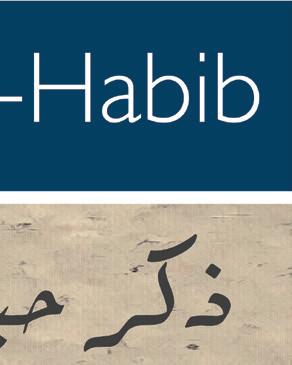
this in a way that I could easily hear his voice.” (Sirat-ul-Mahdi, Vol. 1, narration 320)
Tarawih and Tahajjud
One person asked whether, during Ramadan, the Tarawih prayer should be offered as eight rak‘aat [units of salat] in congregation in a mosque before going to bed or should it be offered alone at home by waking up in the latter part of the night?
The Promised Messiah, peace and blessings be upon him, replied:
“
Tarawih Prayer is not a separate prayer. In reality, to offer the eight rak‘aat of Tahajjud Prayer in its earlier time is called Tarawih. Both forms mentioned in the question are permissible. The Holy Prophet, peace and blessings of Allah be upon him, has done it both ways. But most of the time, the practice of the Holy Prophet, peace and blessings of Allah be upon him, was to offer this prayer in the latter part of the night at home, alone.” (Malfuzat [English], Vol. 10, pp. 24-25)
Someone asked about the Tarawih prayer, that if it is Tahajjud then what is your view about twenty rak‘aat [units of salat] because Tahajjud is only eleven or thirteen rak‘aat, including the Witr
The Promised Messiahas said:
“The everlasting sunnah [practice] of the Holy Prophetsa is only the eight rak‘aat and he used to offer them at the time of Tahajjud, and this is the preferred method. However, it is also allowed in the earlier part of the night as well. In one narration, it is stated that the Holy Prophetas offered them in the earlier part of the night. Twenty rak‘aat were introduced later, but the sunnah of the Holy Prophetsa was indeed that which has been stated earlier.” (Ibid., p. 143)
One gentleman wrote a letter to the
Promised Messiahas the gist of which was: (1) How to perform the obligatory prayer? (2) What is the verdict regarding the Tarawih prayer, and what is the rule for performing the obligatory prayer during a journey? and (3) He also made a request for prayers for some personal matters.
In reply to this, the Promised Messiahas wrote:
“As-salamu ‘alaikum wa rahmatullahi wa barakatuhu. [Peace be upon you, and the mercy of Allah and His blessings.]
“Prayer is that which is offered, but it should be offered with pathos and humility. And you should supplicate profusely in the obligatory prayer for your spiritual and physical well-being, even if you do so in your own language.
“I will pray for your debt, insha-Allah [God willing]. Keep reminding me. I will also pray for you to have a son.

“To offer two rak‘aat during travel is the sunnah [practice of the Holy Prophetsa]. Tarawih is also sunnah. Observe it, and sometimes offer it at home by yourself because Tarawih, in reality, is Tahajjud and not a new prayer. Perform the Witr prayer whichever way you do it now.” (Malfuzat [English], Vol. 10, p. 30)
With regards to offering salat in one’s own language, the Promised Messiahas clarified that it does not mean that one should abandon the Quranic words or the Prophetic prayers, which are in Arabic. Rather, in addition to these, “during salat, one should (also) supplicate in one’s own language, because supplicating in one’s own language generates complete passion [....].”
(Malfuzat, Vol. 5 [1988], pp. 54-55)
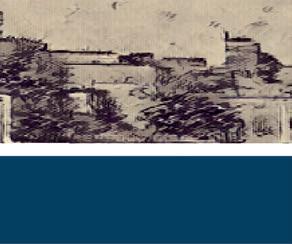
Otherwise, Huzooras said:
“The speech of God Almighty ought to be recited in its language. There is a blessing in it, whether one understands it or not,
and one ought to recite the transmitted supplications as they came from the Holy Prophet’ssa blessed tongue. This is a sign of love and respect.” (Al Badr, 23 & 30 January 1903, p. 4)
Ablution and mash
Hazrat Syed Mir Inayat Ali Shah Sahibra
narrated:
“The Promised Messiahas came to our Mohalla [neighbourhood] Sufian with his associates. A large number of people followed him. Soon after arriving, the Promised Messiahas offered the Asr prayer in the mosque of Mohalla Sufian. Among those who accompanied him included Maulvi Musa Sahib, father of Maulvi Abdul Qadir Sahib. While performing ablution, as the Promised Messiahas was wearing woollen socks, he did mash [make passes with the hands on both feet on top of the socks]. Maulvis were watching him. They started to exchange discussions on whether it was permissible or not [to do mash on woollen socks]. Inside the mosque, the late Maulvi Musa Sahib asked the Promised Messiahas [if he did mash]. The Promised Messiahas answered in the affirmative. Huzooras was requested to lead the prayer, but he ordered the late Maulvi Abdul Qadir Sahib to be the imam of the prayers. The Promised Messiahas stayed there for three days. He used to lead the Fajr prayer himself. Sometimes, Huzooras would also lead prayers in the common room.” (Register Riwayat-e-Sahaba [unpublished], Vol. 1, p. 110)
Congregational prayer with Hazrat Amma Janra
Hazrat Mirza Bashir Ahmad Sahibra MA said:
“Dr Mir Muhammad Ismail Sahib told me, ‘On several occasions, I saw that the Promised Messiahas, while leading prayers at home, would make Hazrat Umm-ulMomineen [Amma Janra] stand on his right side as muqtadi [the one following in prayer].
“‘However, it is generally known in jurisprudence that, even if a woman is the only muqtadi, she should not stand side by side with the man [imam]. Rather, she should stand behind him separately. On the other hand, a sole man acting as a muqtadi should stand on the right, beside the imam.
“‘When I asked Hazrat Umm-ulMomineenra about it, she confirmed that [she used to stand beside Huzooras as a muqtadi]. However, she added that the Promised Messiahas also told her that he sometimes felt light-headed while standing, so she should pray right beside him [in case
Friday 14 April 2023 | AL HAKAM 14
he needed physical support].’” (Sirat-ulMahdi, Vol. 1, narration 696)
Combining prayers
The Promised Messiahas said:
“Just as one fulfils the obligations owed to God, so too one should accept the relaxations that are afforded by Him. Where obligations are prescribed by God, it is God Himself who gives exemptions as well.
“One may observe that even I benefit from the relaxations given by God. I have been combining the prayers for about two months now. This is because I am ill and also heavily engaged in writing my commentary on Surah al-Fatihah. By combining the prayers in this way, a prophecy related in the Hadith ةولصلا هل عمجت is also being fulfilled that when the Messiah appears, the prayers will be combined for him. This hadith also establishes that the Promised Messiah will not lead the congregation in prayer; rather, someone else will lead the prayer, and that he will combine the prayers out of consideration for the Messiah. As such, this is exactly what happens. On certain days when my illness is severe and I am unable to come to the mosque at all, the prayers are not combined. It seems from the words of this Hadith that the Noble Messenger, peace and blessings of Allah be upon him, stated, by way of affection, that the prayers will be combined for the sake of the Messiah. We ought to show honour and respect for the prophecies of the Noble Messenger, peace and blessings of Allah be upon him. We should not view them with an air of disregard. It would be a grave sin for us to look at the prophecies of the Holy Prophet, peace and blessings of Allah be upon him, with contempt. God Almighty has Himself given rise to such conditions, due to which the prayers are being combined for this long. If the prayers had been combined for only a few days, this would not have constituted a sign. I revere each and every word and letter spoken by the Noble Messenger, peace and blessings of Allah be upon him.” (Malfuzat [English], Vol. 3, p. 107)
Hazrat Hakim Din Muhammad Sahibra said:
“During my stay in Qadian Dar-ulAman [Abode of Peace], I observed that the Promised Messiahas used to combine the prayers on the following occasions in this sequence, […] i.e., Asr with the Zuhr prayer and Isha with the Maghrib prayer:
1. On the day when he would be busy writing a book or engaged in finalising an important announcement.
2. When he would be unwell.
3. When it would rain heavily and the streets of Qadian were full of mud.
4. While travelling.” (Register Riwayat-eSahaba [unpublished], Vol. 13, p. 23)



Shortening prayers
A question was presented to the Promised Messiahas:
“Should one shorten the prayers even if one travels only three kos [a kos is approximately 2 miles] on a journey?”
The Promised Messiahas answered:
“Yes. One should carefully examine his intent. In all these issues, one should carefully observe taqwa [righteousness]. Everyday travel in relation to your work is not a journey. A journey is when one undertakes a specific travel and leaves his home only for that purpose, and it is commonly considered a journey. I go for a walk every day for a couple of miles, but this is not a journey. On such an occasion, one should take into account his conscience and if it gives the verdict without any unease that it is a journey, then he should shorten [the Prayer].
“One should follow the dictum تفتسا کبلق (‘Take the verdict of your conscience’ [Musnad Ahmad bin Hanbal]). Even in the presence of a thousand fatwas, the satisfaction of the heart of a believer with all its pure intention is a wonderful thing.”
It was submitted that people have different circumstances – some do not consider nine or ten kos to be a journey, for others even three to four kos is a journey.
The Promised Messiahas said:
“The sharia has not trusted these points. The noble Companions[ra] [of the Holy Prophetsa] have considered three kos to be a journey.”
It was submitted:
“Your Holiness! Do you shorten the Prayers when you go to Batala?”
The Promised Messiahas said:
“Yes, because that is a journey. What I say is that if a doctor or an administrator travels to several villages as part of his tour, he cannot add up all his travel and call it a journey.” (Malfuzat [English], Vol. 10, p. 120)
Hazrat Hakim Din Muhammad Sahibra said:
“I observed that once, the Promised Messiahas went to testify in front of the Tahsildar Sahib Batala in a case (probably civil) where the Zuhr and Asr prayers were not only combined but shortened as well and two rak‘aat of each prayer were performed. The Prayers were offered in the garden called Anarkali located in front of the Tahsil and Batala police station.
“In the same way, when the Promised Messiahas would stay in Gurdaspur while I was there during the Karam Din case, he used to shorten the prayers. Moreover, when the Promised Messiahas would have to return on the same day [of the hearing], he would shorten the prayers and combine them as well. Once, when he travelled to Gurdaspur, the Promised Messiahas had to stay for about fifteen days due to the Karam Din case. Every day, it seemed that we would return, but the magistrate would again fix the date of appearance [in court] for the next day. Consequently, the prayers were shortened for around 15 days.”
(Register Riwayat-e-Sahaba [unpublished], Vol. 13, pp. 23-24)
Prayer in the forest
During his stay in Ludhiana, the Promised Messiahas following his usual practice would regularly go for walks. Once in the forest, it was time for Asr prayer. It was submitted that it was time for [Asr] Prayer. Huzooras said, “Very well, we will offer [salat] here.” Consequently, Maulvi Abdul Qadir Sahib led the prayer there [in the forest]. (Tarikh-e-Ahmadiyyat, Vol. 1, p. 237)
Promised Messiah Day events held in Sri Lanka
A Abdul Aziz Sri Lanka Correspondent
Jamaat-e-Ahmadiyya Sri Lanka organised events to mark the Promised Messiah Day at various centres of the Jamaat. These events started with the recitation from the Holy Quran, and concluded with silent prayers.
One such event was held in Colombo on 18 March 2023 at the Baitul Hamd premises, which was attended by the National President, S Nizam Khan Sahib. The session was moderated by the local sadr of Colombo Jamaat, MA Anis Ahmad Sahib. The opening speech was delivered by S Nizam Khan Sahib, followed by a speech by MA Anis Ahmad Sahib. AB Musthaq Ahmad Sahib, missionary-in-charge also addressed the event. Then, the Tamil translation of the ten conditions of bai’at were read out.
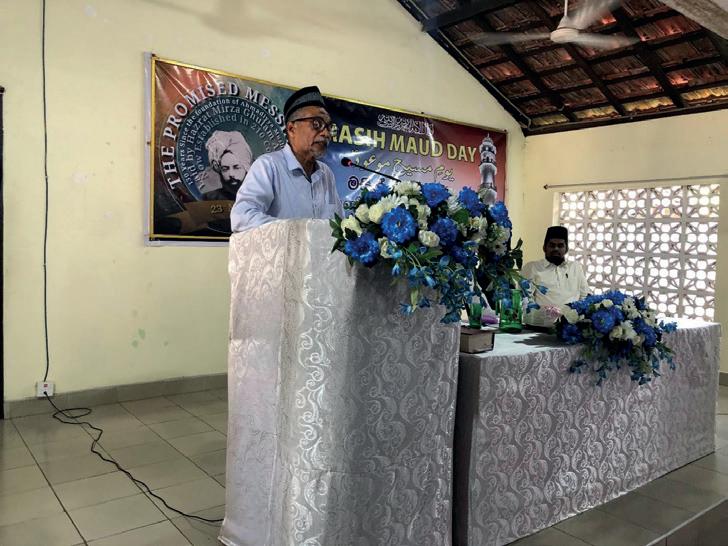
An event was also held in Negombo
on 19 March 2023. In his address, I Aslam Ahmad Sahib, the local sadr of Jamaat Negombo, read out some excerpts of the Promised Messiahas from his book Noah’s Ark. He also narrated the ten conditions of bai‘at. This was followed by speeches by two missionaries, Ahsan Sahib and Tahir Sahib. Events were also held at Pasyala and Polonnaruwa.
Promised Messiah Day celebrated in Malta
Laiq Ahmed Atif President Jamaat-e-Ahmadiyya

Malta
Jamaat-e-Ahmadiyya Malta held Jalsa Yaum-e-Masih-e-Maud on 19 March 2023, at the Jamaat’s centre. The programme was also available online for the convenience of those who could not attend in person.
The event started with the recitation from the Holy Quran, followed by a poem.
This was followed by three speeches on “The purpose of the Promised Messiah’sas advent”, “Promised Messiah’sas love for God”, and “Promised Messiah’sas love for the Holy Prophetsa”. Finally, I had the honour of delivering the concluding speech, in which I presented various aspects of the blessed life of the Promised Messiahas. The event ended with a silent prayer.
15 AL HAKAM | Friday 14 April 2023
“The very act of abstaining from vices and performing virtuous deeds during Ramadan enables a person to achieve the purpose of fasting.”
(Friday Sermon, 18 May 2018; Al Hakam, 15 June 2018, Issue 13, p. 8)
Coming from every distant track
Chief Justice of India, Sir Maurice Gwyer, meets Hazrat Musleh-e-Maud
A series looking at the high standard of morals of the Promised Messiahas, his Khulafa and the hospitality of the Ahmadiyya Muslim Community when receiving visitors
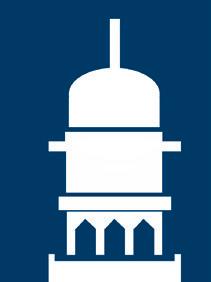
Ata-ul-Haye
Al


Introduction of Sir Maurice Gwyer
Sir Maurice Linford Gwyer, GCIE, KCB, KCSI, was born in 1878, and obtained his education at Westminster and at Christ Church, Oxford University. He was called to the bar in 1902, and took silk in 1930.
From 1912 to 1915, he served as a lecturer in private international law at Oxford, and from 1912 to 1916, as solicitor to the Insurance Commissioners.
After being a legal adviser to the Ministry of Shipping from 1917 to 1919, he held a similar post at the Ministry of Health from 1919 to 1926. His services in 1927-28 as a member of the Royal Commission on London Squares preceded his appointment in 1930 as the first British delegate to the Hague Codification of International Law, which was followed by his being selected as a member of the Indian States Inquiry in 1932. As Parliamentary Counsel to the Treasury, in 1933, he drafted the India Bill, which in 1935 became an Act, and on the basis of this, India and Pakistan
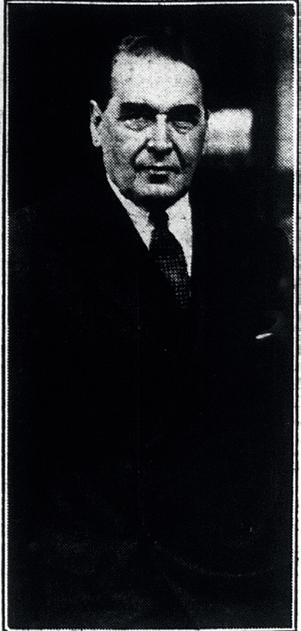
became independent in 1947. Chosen in 1937 as the first Chief Justice of India and President of the Federal Court, he held these offices until his retirement in 1943, but remained in India until 1950 as ViceChancellor of the University of Delhi, to which he was first appointed in 1938. He was the editor of several recognised legal textbooks as well. He passed away on 12 October 1952. (Eastbourne Gazette, 15 October 1952, p. 11)
The Manchester Guardian wrote that Sir Maurice Gwyer “was one of the most notable persons of the last days of the British Raj in India.” (The Manchester Guardian, 14 October 1952, p. 6)
Visit to Qadian – First Day
In April 1940, when he was serving as the Chief Justice of the Indian Federal Court, Sir Maurice Gwyer visited Qadian. He reached Qadian on 14 April at 9:30am, along with his son, Major John Gwyer. He was warmly received by Hazrat Chaudhry Sir Zafrulla Khanra, various Naziraan and other members of the Jamaat.
During his visit to Qadian, Sir Maurice visited various offices and institutions of the Ahmadiyya Muslim Community. He was welcomed at the Ahmadiyya Chowk [Ahmadiyya Square] by Chaudhry Fateh Muhammad Sahib, the then Nazir-e-Ala He then visited the Madrasa-e-Ahmadiyya where he was welcomed by Hazrat Mir Muhammad Ishaqra, the then Headmaster of the Madrasa. The students and staff of
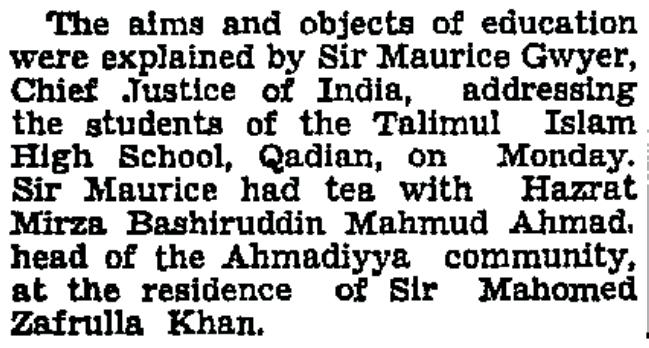

the Madrasa were present in the courtyard. There were several foreign students as well, such as those from Sumatra, Java, Eastern Turkistan, Afghanistan, and East Africa. He also visited the boarding area of the Madrasa
Sir Maurice then visited the office of Bait-ul-Maal, where he was informed about the financial system, i.e. chandajaat of the Jamaat. Following this, he was briefed about the institution of Majlise-Mushawarat and told about its purpose, importance, and procedures. Then, he visited the Qadha office, where he was welcomed by Mirza Abdul Haq Sahib.
After this, he went to the office of Bahishti Maqbarah, where Hazrat Maulvi Syed Sarwar Shahra welcomed him, followed by a visit to the Umure-Ama office, where the then Nazir Umur-e-Ama Hazrat Syed Zainul Abideen Waliullah Shahra greeted him, and Hazrat Chaudhry Zafrulla Khanra briefed Sir Maurice in regards to the responsibilities of this department. He then visited the office of Umur-e-Kharija, and was briefed about its duties.
Following this, Sir Maurice visited the office of Nazir Talim-o-Tarbiyat, where he had a discussion with Hazrat Mirza Sharif Ahmadra who was serving as Nazir Talimo-Tarbiyat. Hazrat Mirza Sharif Ahmadra briefed him about the educational institutes functioning under this nazarat
He then visited the office of Nazir-eAla, from there he proceeded to the Aqsa Mosque, and then to the office of Private Secretary to Hazrat Khalifatul Masih IIra where he was informed about the busy schedule of Huzoorra. He was astonished upon learning that during the Jalsa days, in addition to his speeches, Huzoorra would grace thousands of attendees with musafaha, i.e., shake hands with them, and that Huzoorra would sleep for around two hours only.
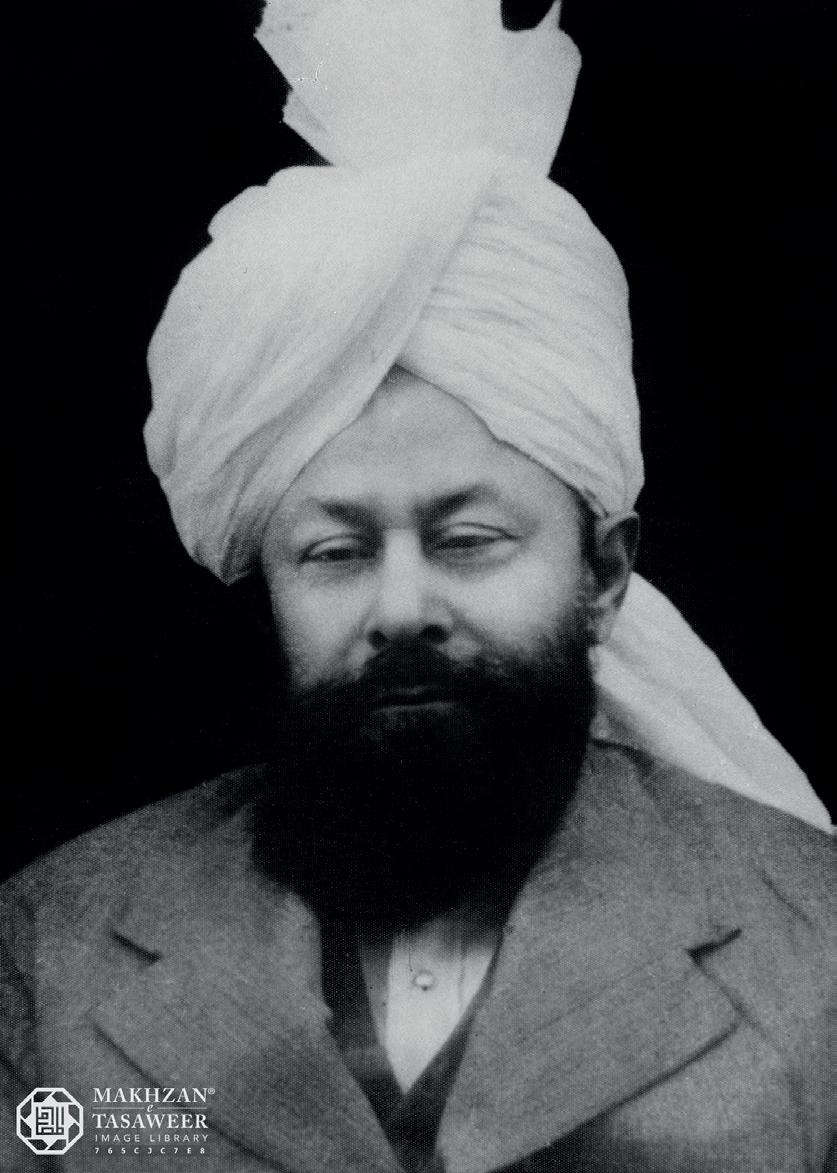
While he was proceeding towards the office of Da’wat-o-Tabligh, he was introduced to the Majlis Khuddam-ulAhmadiyya and particularly mentioned their passion for the service of mankind. After this, he moved to the office of Nashro-Ishaat, where he was gifted with some Jamaat literature. Hazrat Maulvi Abdur Rahim Nayyarra, while showing a map of the world, highlighted to him those places where Ahmadiyyat had reached at the time.
After this, Sir Maurice Gwyer went
to the residence of Hazrat Sir Chaudhry Zafrulla Khanra. At lunch, the then Nazire-Ala Hazrat Mufti Muhammad Sadiqra and the then Nazir Umur-e-Ama Syed Zainul Abideen Waliullahra were also invited. On that occasion, Sir Maurice was introduced in detail to the Ahmadiyya Muslim Community. (Al Fazl, 16 April 1940, pp. 1-2)
Sir Maurice meets with Hazrat Musleh-e-Maudra at the Tea Party
In the evening, Hazrat Sir Chaudhry Sahibra organised a tea party at his place, which was graced by the presence of Hazrat Musleh-e-Maudra, and Sir Maurice had the opportunity to meet and have a discussion with Huzoorra. (Ibid, p. 2)
The Times of India reported:
“The aims and objects of education were explained by Sir Maurice Gwayer, Chief Justice of India, addressing the students of the Talimul Islam High School, Qadian, on Monday. Sir Maurice had tea with Hazrat Mirza Bashiruddin Mahmud Ahmad,
Friday 14 April 2023 | AL HAKAM 16
Nasir
Hakam
Sir Maurice Gwyer| Image: The Times of India
Madrasa-e-Ahmadiyya, Qadian
head of the Ahmadiyya community, at the residence of Sir Mahomed Zafrulla Khan.”
(The Times of India, 17 April 1940, p. 3)

Second Day
On the next day, 15 April, at around 9:30am, Sir Maurice visited the MAC Works (Electric Appliances Factory), and was accompanied by Hazrat Sir Chaudhry Zafrulla Khanra, Hazrat Mirza Sharif Ahmadra, Mian Muhammad Ahmad Khan Sahib, and Mistri Muhammad Ismail Sahib Siddiqui. After seeing its functioning, he wrote a note in the visitor’s book as well.
After this, he proceeded to the Talim-ulIslam High School, where he was to deliver a speech. The arrangement of loudspeakers was also available in the hall and around 250 people were in attendance. In addition to the students and staff of the senior classes of the High School, the students of the Girls High School were also present with the arrangement of purdah. Moreover, Englishspeaking members of the public were also present.

Speech of Hazrat Sir Chaudhry Zafrulla Khanra
In the beginning, Hazrat Sir Chaudhry Muhammad Zafrulla Khanra delivered a speech and said:
“Sir Maurice Gwyer, we are very pleased to welcome you to Qadian. Though this is the first time you have visited the markaz [headquarters] of Jamaat-e-Ahmadiyya, we hope that it will be the beginning of more such occasions. And when you visit here again, you will not come as a stranger, but rather, you will feel as if you are meeting your own brothers. [...] It is possible that you may not agree with the objectives and aims for which Jamaat-e-Ahmadiyya is striving,
however, as a result of your visit, you will go back with the impression that Jamaat-eAhmadiyya is striving for those objectives, which apparently seem very surprising.
“For instance, the first and foremost objective of the establishment of Jamaate-Ahmadiyya is to establish a strong connection between mankind and their Creator. Though it is difficult for me to present its details here, it is certain that we are striving for this objective with the certainty that its achievement is possible. We, who have gathered here [as a Jamaat] from different parts of the world, have firm faith that the establishment of the union between the Creator and His creation is as much possible as it was in the previous eras and its attainment is one of the foremost duties of Jamaat-e-Ahmadiyya.
“The second major objective that Jamaat-e-Ahmadiyya serves is to create unity between different people, races, and cultures. These endeavours of Jamaate-Ahmadiyya may seem very small, however, this strive is for an objective that is achievable for sure. Our main objective behind establishing factories here is not to make Qadian an industrial city, but rather, its purpose is to achieve that very objective, which is always in our eyes [i.e., service to humanity], since, Islam focuses on each and every aspect of a Muslim, whether it is spiritual, worldly, economic, or social.
“Our Jamaat holds a distinction in relation to the quest for these objectives, that is, we always advocate the utilisation of peaceful means to alleviate any flaws, whether they are related to the government or the public. Our principle is that the ruler shall get their due rights, and the rights of God shall be given to Him.” (Al Fazl, 17 April 1904, p. 1)
After this, Sir Maurice Gwyer delivered
a speech.
Speech by Sir Maurice Gwyer
“It is a source of great pleasure for me that I accepted the invitation of Sir Muhammad Zafrulla Khan to visit Qadian. I am afraid I have not made any preparations for any speech here, and thus, I will keep it very short. First of all, I will share my impressions of your Community that I have gained during this short stay. I have seen that the members of your Community are inspired by a burning faith and adhere to certain objectives and principles, and they desire to regulate their lives accordingly. Here, I have witnessed the extraordinary impact of the principle of equality between different people and nations. This principle of brotherhood between mankind is the fundamental principle of human life, and I have seen that the spirit of equality and brotherhood is found within your Community. For this reason, I believe that my principles are common to yours.” (Ibid, p. 2)
Revisiting the time when he was a student, Sir Maurice said that though the previous generation’s era as students was very different from the time of the current generation, the objectives of education are still the same, which must be kept in mind by the students.
Continuing his speech, he said:
“The foremost objective of obtaining an education is for the students to realise their obligation, which is incumbent upon them with respect to their connection with their Creator. It means that they should make their utmost efforts to fulfil the rights of God in their true essence. The second objective of education is to enable the students to utilise their God-gifted intellectual capabilities, and through them they not only serve their country, but rather, they deem it their duty to serve the whole of mankind.” (Ibid)
Further, he said that he was pleased to know that the literacy rate in Qadian is nearly 100 per cent. He added that he will leave Qadian with such impressions that will remain fresh in his heart for a very long time, and will always please his heart. At the end of his speech, he said to the audience, “as-salamu ‘alaikum”.
Concluding remarks by Hazrat Sir Chaudhry Zafrulla Khanra
After this, Hazrat Sir Chaudhry Zafrulla Khanra expressed his gratitude to the honourable Chief Justice of India, and hoped that he would visit Qadian again.
Visit of the school and other places
Following this, Sir Maurice Gwyer was given a brief tour of the school, and met with those students who had come here for education from far distances. He then visited the boarding house, where he was welcomed by the superintendent, Sufi Ghulam Muhammad Sahib, and was briefed about the students’ daily routine.
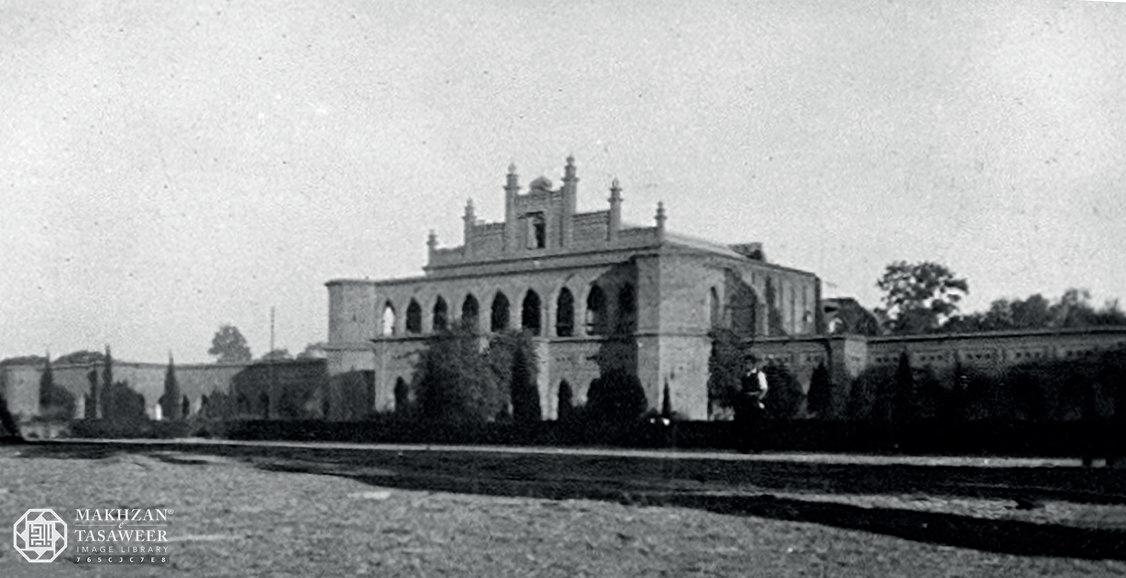
Then, he visited the dispensary of the boarding, where he was welcomed by the then incharge, Dr Muhammad Abdullah Sahib. Sir Maurice left comments in the school’s logbook as well.
Sir Maurice then visited the Himalaya Glass Works, where he was shown how
the items were manufactured. He then proceeded to the Star Hosiery Works and saw it functioning.
Sir Maurice meets with Hazrat Musleh-e-Maudra at Lunch Reception
On the same day, Hazrat Sir Zafrulla Khanra gave lunch reception in honour of the guest, and the event was graced with the presence of Hazrat Musleh-e-Maudra. The other attendees included Hazrat Mirza Bashir Ahmadra, Khan Zulfiqar Ali Khan Sahib, and Hazrat Dr Mir Muhammad Ismailra (Ibid)
He also visited the Nur Hospital, along with then Nazir Umur-e-Ama Hazrat Syed Zainul Abideen Waliullah Shahra, and was
17 AL HAKAM | Friday 14 April 2023
delivering an address in Bombay, 1940 | Image:
Times
Sir Maurice Gwyer
The
of India
Continued on page 19 >>
Talim-ul-Islam High School, Qadian
The Civil and Military Gazette, 17 April 1940
Prophets of Allah
Aaron: Brother of Moses
“And We did raise among every people a Messenger”
Al Hakam

Aaronas, known as نوراہ [Harun] in the Holy Quran, was the son of Amran, (Imran in Arabic), and from the tribe of Levi. He was three years older than Prophet Mosesas (Exodus 7:7). He had an elder sister, Miriam, who is held in high esteem. (Five Volume Commentary, Vol. 2, p.890)
Aaronas, in company with Mosesas, helped lead the people of Israel safely across the river away from the bondage of Pharaoh.

How did Aaronas survive Pharaoh’s order for the sons of the Israelites to be killed?
As mentioned in the article of Prophet Mosesas (Al Hakam, issue 263), Pharaoh “sought to weaken a party of them, slaying their sons, and sparing their women. Certainly, he was of the mischief-makers.”
(Surah al-Qasas, Ch.28: V.5)
In light of this, Hazrat Khalifatul Masih Vaa was asked how Aaronas survived Pharaoh’s order for the sons of the Israelites to be killed. In response, Huzooraa said:
“According to the Bible, Hazrat Harunas [Aaron] was older than Hazrat Musaas Hence, it is written therein:
“‘And Moses was fourscore years old, and Aaronas fourscore and three years old, when they spake unto Pharaoh.’ (Exodus 7:7, KJV)
“It was at the time of the birth of Hazrat Musaas that Pharaoh ordered the killing of Hebrew boys on the advice of astrologers and soothsayers after having seen a dream.
ordered the midwives to kill any sons born to the Israelite women and to keep any daughters alive. However, the midwives did not follow the king’s orders. (Exodus 1:7-17, KJV)
“Moreover, it is also written in the tafasir, the commentaries of the Holy Quran, that the Egyptians used to employ the Israelites without remuneration. Thus, to maintain a sufficient supply of labour, they would let any sons born to the Israelites live a year but would kill those born the following year to prevent the number of the Israelites from growing. Hazrat Harunas was born in the year in which the sons of the Bani Isra’il were spared. (Ma‘alim al-Tanzil [Tafsir al-Baghawi] by Abu Muhammad al-Husayn ibn Mas‘ud ibn Muhammad alFarra‘ al-Baghawi, under verse 50 of Surah al-Baqarah)
“‘And make him share my task.” (Surah TaHa, Ch.20: V.30-34)
Mosesas made this prayer and desired that Aaronas be with him, as he was more eloquent in speech than he was.
Allah the Almighty states in the Holy Quran:
“And We bestowed upon him, out of Our mercy, his brother Aaron as a Prophet.” (Surah Maryam, Ch.19: V.54)
This shows and highlights that though Aaronas was older, he held subordinate status to Mosesas. He was a follower of Mosesas and was granted to him as a helper in his task.
Appointed as a Prophet
Aaronas used to receive revelations, like other prophets and the chosen ones of Allah. The Holy Quran states:
Hazrat Harunas survived because he was born before that.
“Another reason for the survival of Hazrat Harunas, as mentioned in the Bible, is that long after the passing of the times of Hazrat Yaqubas and Hazrat Yusufas, the population of the Bani Isra’il swelled to the point that the country was filled with them. Thus, the king of that time, fearing their numbers, began inflicting all kinds of hardships on them. However, the more they were persecuted, the more their numbers increased. As a result, the king of Egypt


“Thus, these are the various reasons for the survival of Hazrat Harunas which have been mentioned in the Bible and the books of tafsir.” (Al Hakam, 19 August 2022)
Eloquence in speech
Aaronas was known, as the Holy Quran states, for his eloquence in speech. When Mosesas was commissioned as a prophet of God and told to go to Pharaoh, he prayed to Allah:
“‘And grant me a helper from my family
“‘Aaron, my brother;
“‘Increase my strength with him,
“Then did We send, after them, Moses and Aaron to Pharaoh and his chiefs with Our Signs, but they behaved arrogantly. And they were a sinful people.” (Surah Yunus, Ch.10: V.76)

The Holy Quran states that Allah gave Mosesas and Aaronas “the Discrimination and a Light and a Reminder for the righteous.” (Surah al-Anbiya’, Ch.21: V.49)
Mosesas retreats to the mount and appoints Aaronas as his representative Prophet Mosesas, the brother of Prophet
Friday 14 April 2023 | AL HAKAM 18
Jalees Ahmad
ﻰﻓ ﺎﻨﺜﻌﺑ ﺪﻘﻟﻭ ﻻﻮﺳﺭ ﺔﻣﺃ ﻞﻛ
نوراھ ﻡﻼﺴﻟﺍ ﮫﯿﻠﻋ
Aaronas, expressed his desire to see a manifestation of God higher than that which had already been granted to him. Mosesas, here, was told, “‘O Moses, I have chosen thee above the people [of thy time] by My messages and by My word. So take hold of that which I have given thee and be of the grateful.’” (Surah al-A‘raf, Ch.7: V.145)
On the mount, revealed to Mosesas were the commandments by God Almighty, which Mosesas wrote on a tablet.
“It was indeed Moses, and not God, who wrote on the tablets the commandments that were revealed to him on the Mount; but as the commandments were revealed by God, the act of writing has been ascribed to Him.” (Five Volume Commentary, Vol. 2, p. 1038)
When Mosesas went to Mount Sinai, his people began worshipping a calf. The Five Volume Commentary states:
“The Israelites had lived in Egypt under bondage for a long time and during their bondage, they had acquired many of the customs, ways of life and religious rites of their rulers, the Egyptians, who worshipped the cow (Enc. Rel. & Ethics, Vol. 1, p. 507). In this way, they had also developed a great liking for the cow, and taking advantage of Moses’ absence, Samiri led them into cow worship.” (Five Volume Commentary, Vol. 4, p. 2040)
Samiri is remembered as the one who led the Israelites into calf-worship. In the Five Volume Commentary, we read: “ىرماسلا (Samiri) is derived from رمس. They say هرمس i.e. he nailed it, i.e. he made it fast, firm or strong with a nail or nails, a nail being called رامس. Hence رماس is one who makes things fast with nails, i.e. one belonging to the profession of blacksmiths, carpenters, etc. Thus ةرماس means, a people who carry on the profession of blacksmiths, carpenters etc. i.e. artisans. Samiri, the mischief-maker, seems to belong to this class. So ىرماس may be a descriptive or attributive name. Or it may be a relative noun from ةرماس (the Samaritans), a people said to be one of the tribes of the Children of Israel; or a sect of the Jews, differing from them in many of their institutions. Properly speaking they were inhabitants of Samaria. The name is now restricted to a small tribe of people living in Nablus and calling themselves ‘Bene Yisrael’. Their history as a distinct community began with the taking of Samaria by the Assyrians in 722 B.C. (Lane & Jew. Enc.).” (Five Volume Commentary, Vol.4, p. 2038)
When they were smitten with remorse for taking a calf for worship, a group of them repented before Mosesas returned from the Mount. (Surah al-A‘raf, Ch.7: V.150)
The case with Aaronas and the altar
The Bible states that Aaronas built an altar for the worshipping of the calf (Exodus, 32:4); however, the Holy Quran completely rejects this. Aaronas, being a prophet of God, could not be framed to do such a thing. The Quran records Aaronas to have said to his people that the “‘Gracious God is your Lord’.” (Surah TaHa, Ch.20: V.91)
It was not Aaronas who fashioned the calf but Samiri who made it for them; the Holy Quran states, “God said, ‘We have tried thy people in thy absence, and the
Samiri has led them astray.’” (Surah TaHa, Ch.20: V.86)
Moses’as return
When Mosesas returned, he said, “‘Evil is that which you did in my place in my absence. Did you hasten to devise a way for yourselves without waiting for the command of your Lord?’” (Surah al-A‘raf, Ch.7: V.151)
Mosesas held Aaronas by the head and beard and said, “‘O Aaron, what hindered thee, when thou didst see them gone astray, ‘From following me? Hast thou then disobeyed my command?’” (Surah TaHa, Ch.20: V.94)
The anger expressed by Mosesas was because Aaronas, whom he appointed as his representative, was given the duty to look after the people.
Then, Mosesas, seeing that Aaronas was innocent in the matter, prayed for forgiveness for himself and his brother.
Mosesas and Aaronas order Bani
Isra’il to enter the Holy Land
Mosesas and Aaronas addressed the people and told them to enter the Holy Land which Allah ordained for them. Mosesas told them to not turn back lest they become among the losers. They responded that there were arrogant and proud people in the land. They said, “‘We shall not enter it until they go forth from it. But if they go forth from it, then we will enter it.’” (Surah al-Ma’idah, Ch.5: V.23)
Upon this, the Holy Quran states that two men from among them said “‘Enter the gate, advancing against them; when once you have entered it, then surely you will be victorious.’” (Surah al-Ma’idah, Ch.5: V.24) Hazrat Musleh-e-Maudra, in Tafsire-Saghir, has explained that, though the names are not mentioned here, it seems, considering the context, that the two men were either Mosesas and Aaronas or, according to the Bible, Joshua and Caleb (Numbers, 14:6). (Tafsir-e-Saghir, p. 145)
The children of Israel replied, “‘O Moses, we will never enter it so long as they remain in it. Therefore, go thou and thy Lord and fight, and here we sit.’” (Surah al-Ma’idah, Ch.5: V.25)
When they behaved and responded in such a way, God decreed that entering the land had been forbidden (Surah alMa’idah, Ch.5: V.27) for them for 40 years so that the time spent in the wilderness of the desert should strengthen them and enhance their morals. In this way, the young generation grew older to be strong and brave.
“Welcome, O Pious Brother and Pious Prophet.”
During the night of mi‘raj, the night of the spiritual ascension to heaven, the Holy Prophetsa said that he was greeted by various prophets.
The Holy Prophetsa said that when he reached the fifth Heaven, he met Prophet Aaronas. Addressing the Holy Prophetsa, Angel Gabriel said, “This is Aaron.”
The Holy Prophetsa said, “Gabriel greeted and so did I, and he returned the greeting saying, ‘Welcome, O Pious Brother and Pious Prophet.’” (Sahih al Bukhari, kitab al-anbiya, Hadith 3393)
<< Continued from page 17
briefed about the hospital’s functioning by Dr Hashmatullah Khan Sahib. He signed the visitors book as well. (Al Fazl, 18 April 1940, p. 2)
Third Day
On 16 April 1940, Sir Maurice departed from Qadian in a car along with his son, Major John Gwyer, at 10:30am. Hazrat Sir Zafrulla Khanra, Nazir-e-Ala Chaudhry Fateh Muhammad Sahib, other Naziran, and presidents of various mahallas, bid them farewell. (Ibid)
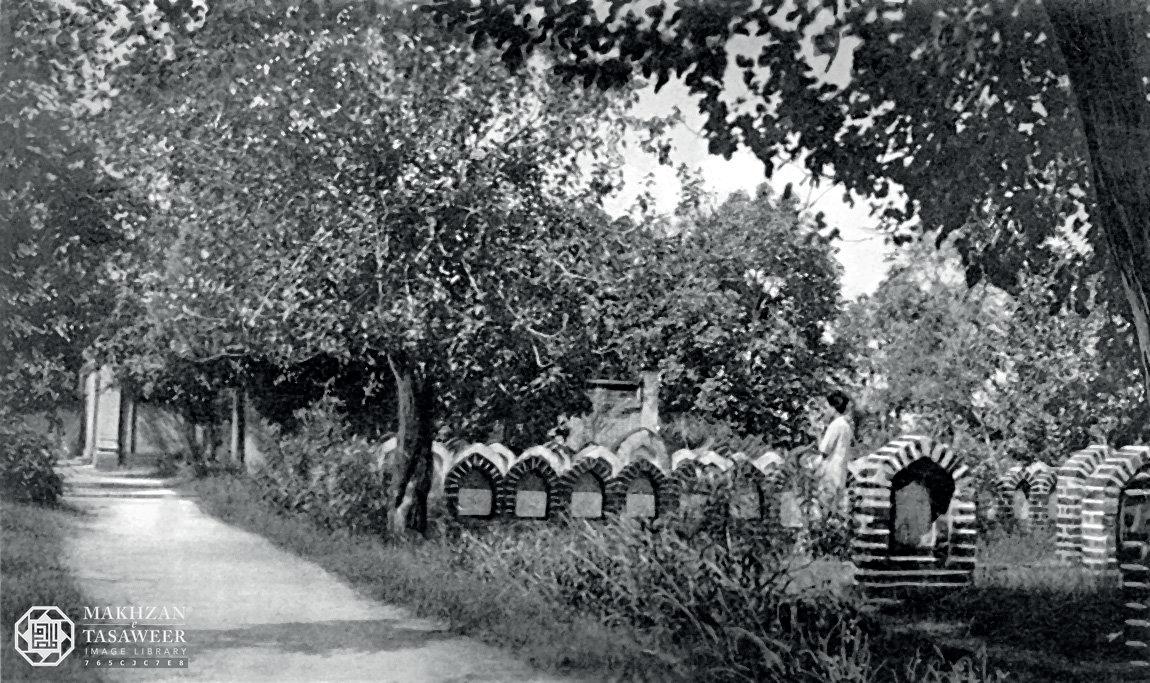
Reporting on this visit of the Chief Justice, The Civil and Military Gazette wrote:
“SIR MAURICE GWYER’S VISIT TO QADIAN
“Address on True Ideals of Education
“QADIAN, April 15.
“The true ideals of education were explained by Sir Maurice Gwyer, Chief Justice of India, addressing the students of the Talim-ul-Islam High School, Qadian.
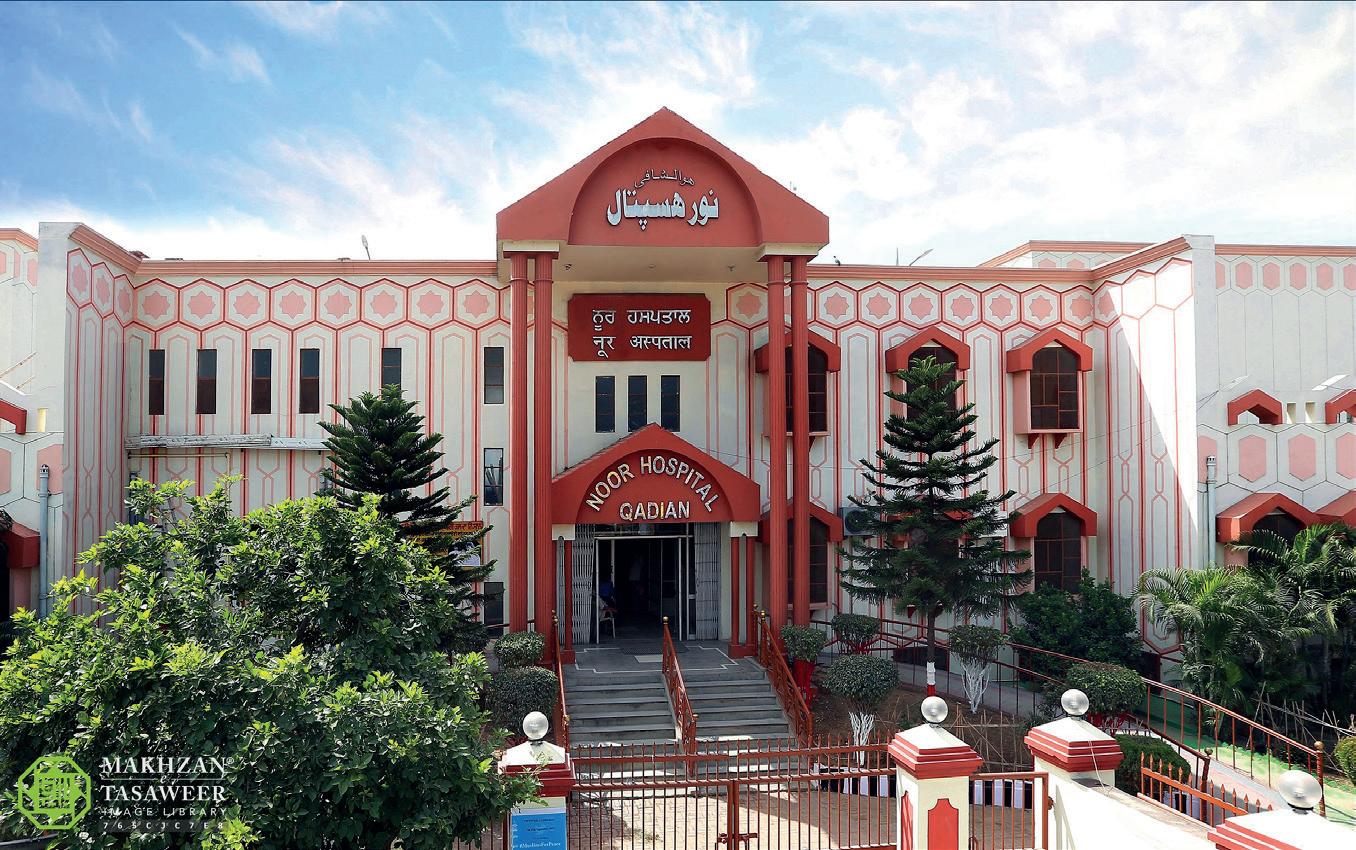
“He said: First, education taught young men of their duty towards God and their fellowmen. Secondly, it enabled them to cultivate the talents that God had given them for the service not only to their own community and country but to the brotherhood of mankind. Thirdly, it not only enabled young people of this and succeeding generations to share the thoughts, writings and imagination of great men, who preceded them, but to become sharers of the immense literature, thought and beauty of the works they had produced and completed in their lifetime. He felt that in their works they had resources that would never fail them, however difficult the times
might be.
“Speaking about his impressions of the Ahmadia community, Sir Maurice Gwyer said that during his brief stay here he had seen people inspired by a burning faith and adhering to principles by which they sought to regulate their lives.
“The fundamental principles of equality and brotherhood that formed the background of man’s life, he said, were beautifully acted upon by members of the community.
“‘I heard this morning from Sir Mahomed Zafrullah Khan, continued the Chief Justice, “that the percentage of literacy in this town is nearly 100 percent. I believe no other town in India has set so noble an example before us. We, who occupy the position of judges, cannot take an interest in matters outside our sphere, but a judge has, after all, to deal not only with questions of law but with human beings as well. He has to acquaint himself with the great currents of thought in the country where he is discharging his duties; otherwise, he cannot understand the men and women who are affected by them. Even though my duty as a judge lies within a limited sphere, it touches upon the ideals that lie outside that sphere. It is my privilege, or rather my duty, to become acquainted with the thoughts of people who have nothing to do with law. I rejoice at having acquainted myself with the people of this land. I rejoice to have accepted Sir Mahomed Zafrullah’s invitation and visited this community of which he is so proud.’
“Sir Maurice Gwyer had tea with Hazrat Mirza Bashir-ud-Din Ahmed, head of the Ahmadiyya community, at the residence of Sir Mahomed Zafrullah Khan.—A.P.” (The Civil and Military Gazette, 17 April 1940, p. 13)
19 AL HAKAM | Friday 14 April 2023
Bahishti Maqbarah, Qadian
Noor Hospital, Qadian
Memories of a beloved teacher: Munawwar Ahmad Khursheed Sahib
Marwan Ahmad Gill Missionary, Argentina
As students and graduates of Jamia Ahmadiyya, we are fortunate to have mentors who exemplify the virtues of obedience, sincerity, humility, and hard work. The late Munawwar Ahmad Khursheed Sahib was one of those devoted individuals, as Hazrat Khalifatul Masih Vaa mentioned during his Friday sermon on 31 March 2023:

“He was a missionary who fulfilled his devotion with exceptional faithfulness, he was an exceedingly humble man who had the opportunity to serve for a long time, living up to the true standard of rendering service […]. From 2008 to 2012, he also had the opportunity to serve as a teacher in Jamia UK. Wherever he was able to serve, he worked excellently […]. May Allah the Almighty continue to grant the Community such loyal missionaries who render services selflessly and fulfil their tasks. May Allah elevate his rank in Paradise. Amin.”
My first personal encounter with the Khursheed Sahib was only a few days after I had started my first year at Jamia UK. He wasn’t our teacher at that time, but one day when he saw me in the morning assembly, he called me over and asked me to introduce myself. It was a very short conversation in which he inquired how I was and if I had settled down well, but his kind gesture left a strong impression on me. From that moment on, I considered him a fatherly figure and always felt comfortable reaching out to him. I also had the privilege of being a student in his history classes, although he was much more than just our history teacher. His relationship with us would extend beyond the four walls of the classroom and the syllabus. He would, based on his long experience as a field missionary, give us precious advice and share his knowledge on a range of various topics. One of his recommendations that really helped me in the field is that as life devotees, we should be very careful when it comes to “qalam, qasam and qadam”. In Urdu, these three words are very similar, and what he meant by this is that before publishing anything, taking an oath, or taking any important decision, we should pray and take our time to pray and reflect.
Another piece of advice that helped me a lot was when I was preparing for my appointment in Argentina. He was very happy about my assignment and said that I should consider it a blessing that the Jamaat has chosen me to serve as a pioneer in a new country. He encouraged me by sharing some of his personal anecdotes, challenges and stories. He put a lot of emphasis on the fact that I should keep personal friendships with my tabligh contacts and at the same time, even if I see un-Islamic rituals and
customs in them or in our new converts, I shouldn’t condemn them immediately but do their tarbiyat gradually and in a soft and kind manner.
Another aspect which I witnessed personally in Khursheed Sahib was his passion for preaching the message of Islam Ahmadiyyat. On one occasion I received his call and he shared with me the contact information of a Senegalese who had just moved to Argentina. Hence, he instructed me to maintain contact with him, as the gentleman had once attended a Jamaat event in Senegal.
For the benefit of Al Hakam readers – especially life devotees – some further personal accounts are attached, written by his students who are now serving as missionaries in different parts of the world.
Attaul Naseer, a missionary in Greece, writes:
“I had the honour of being a student of Munawwar Khursheed Sahib during my Jamia years and then this relationship of student and teacher continued even afterwards. I was witness to many of his beautiful qualities. He was one of the very senior missionaries, but I never felt any form of arrogance in him. He was always very humble. He taught us the history of Islam in such a unique way that I personally developed a keen interest in the subject. Knowing that I have this interest even during the lesson, he would honour me by asking about some facts related to Islamic history that he would be teaching. By doing so, he taught us that even if we are teachers, we should not feel embarrassed about confirming some facts by asking others. This would encourage me to learn even more.
“He would not only teach us but prepare us for our future duties as missionaries by telling faith-inspiring stories from his own life as a missionary. Once during Jamia, he called me to the staffroom, where some
other students were also present and he told us that he was organising a Jalsa in Senegal over the phone. At that time, Zoom or Teams were not available, so his dedication to his service was evident from the opportunities that he would create to serve.
“On a different occasion, he showed me a picture from Senegal where he was sitting on the floor while many Senegalese brothers were sitting around him and they were all eating and having a laugh. By just showing me this picture, he told me how a missionary should behave when he is in the field in a foreign land. He should become part of the local people and they should also feel the sincerity of this brotherly relationship.
“His love for Khilafat was not hidden from anyone. He was a true Sultan-e-Naseer of Khilafat. He narrated one of his stories to me about how Allah Almighty saved his life due to the instructions of our beloved Imam, Hazrat Khalifatul Masih Vaa. He was about to leave for Senegal and before his departure, he had a mulaqat (meeting) with Huzooraa, during which Huzooraa showered him with so much love that while he was narrating this incident, I could see tears in his eyes. He narrated that when he was about to take leave, Huzooraa held his hand for a very long time and told him not to go yet but rather to wait for some time. On the day of his flight (which he did not take due to Huzoor’saa instructions), he developed severe pain in his chest and was hospitalised. If he had taken that journey, then the pain would have occurred while he was on the flight, or later in Senegal, where he would not have been able to receive emergency help the way he did in the UK.”
Abdullah Dibba, a missionary in the USA, recalls:
“Three of us Gambian students had left The Gambia in October 2008 to attend Jamia Ahmadiyya UK. We arrived in the UK on a Friday night, and the very next morning ‘Amir Khursheed Sahib’ – the name by which he’s referred to in The Gambia – walked into the guest house where we were temporarily accommodated. As soon as he walked in and greeted us, he asked if we knew who he was. I had no idea, but Muhammad Mbaye Sahib remembered his face as he worked closely with his father.
“I, on the other hand, had no idea who he was. But as soon as Mbaye Sahib mentioned his name, I knew exactly who he was talking about. Amir Khursheed is a household name in The Gambia. He talked about all of our fathers with such great detail and so many vivid memories that we were all stunned by his memories of The Gambia Jamaat members and his knowledge of the geography of the entire country. After a few moments, Ameer Khursheed Sahib’s phone rang and he asked to excuse himself to attend the call. The call was from some
Ahmadis in Senegal. I couldn’t understand what he was saying, but I could tell that he was speaking in the Fula language. My own maternal grandmother belongs to the Fula tribe, but I don’t know the language. Growing up, I had heard about his communication skills and mastery of the local languages, but I was shocked at the fluency with which he was speaking. When he dropped the call, he continued talking to me, but now he had switched to my native language, Mandinka. I asked him how he managed to learn all these languages. He told me that when he got to The Gambia as a missionary, he started attending the local elementary school and mingled with the children so that he could easily pick up the language. He would sit in the classroom with the children and they were surprised by the amount of hair on his arms, so they would ask if they could touch it. The kids were surprised because the other foreigners, mainly tourists, who would come to The Gambia would never come near them, but here was Maulana Khursheed Sahib going to school with them and playing with them as if he were in their age group. This left a lasting impact on not only the children but also their parents and the wider village. And it opened many doors for tabligh.”
Muhammad Mbaye, a missionary in The Gambia, writes:
“The late Maulana Khursheed Sahib was a man who worked closely with my father, whose name is Hamidou Mbaye. My father was also a preacher of the Jamaat and travelled with Khursheed Sahib to many places to introduce the message of Islam Ahmadiyya for the first time. My father told me that Maulana Sahib was a very wise and intelligent person when it came to preaching. Moreover, he would eat and drink together with the local people and thus always show appreciation for their humble gifts and food.
“At the beginning of my life as a Jamia student, I felt frustrated because I thought I would never be able to understand the Urdu language. One day Khursheed Sahib came to me and said: ‘My son (he would often call me this as he had a great love for me) come to the library.’ He took an Urdu storybook and started reading it and he told me to follow him carefully while he was reading it. He started explaining to me many rules in the Fula language, which he could speak better than me, although I am a Fula. He sometimes used to tease me by saying, ‘You are a Fula and yet you cannot speak Fula as fluently as me.’
“For several weeks, he gave me private Urdu lessons in the library and all my doubts and confusions were removed and I started understanding and reading the books in Urdu. Later, he instructed a senior student to also assist and help me.”
Raheel Ahmad, a missionary serving at
Friday 14 April 2023 | AL HAKAM 20
the UK History Department, writes:
“My earliest memory of Maulana Munawwar Ahmad Khursheed Sahib is at the small Salat Centre in Tooting, London. An elderly, humble, loving and approachable man. Whenever he came to the Isha prayer and delivered the dars, the young, who were normally eager to leave, would stay behind instead. We appreciated his style of dars, as we would find the right combination of deep intellectual insight communicated in the form of stories. He played a crucial part in the tarbiyat of the entire Jamaat in the area, notably the khuddam and atfal, and was undoubtedly a father figure for all of us. He was the reason that many young khuddam from the Tooting Jamaat decided to join Jamia Ahmadiyya UK, including me.
“There are numerous qualities that make a person great; nevertheless, Khursheed Sahib’s ability to elevate others despite his own seniority is a quality that I will always remember about him. He always demonstrated a desire to bring out the best in others. On numerous occasions, I have witnessed Khursheed Sahib consulting young children around him for their input on a variety of important issues. This was done to ensure that they felt included and important. His company never made you feel insignificant and it would always remind me of the following verse:
‘If thou hadst been rough and hardhearted, they would surely have dispersed from around thee. So pardon them and ask forgiveness for them, and consult them in matters of administration.’” (Surah Aal-eImran, Ch.3: V.160)
Shahzad Ahmad, a missionary serving at The Review of Religions, recalls:
“As a teacher, a group in-charge and also the father of a dear Jamia class friend, Muhammad Ahmad Khursheed, I had the good fortune of interacting with the late respected Maulana Munawwar Ahmad Khursheed Sahib in many different ways, both during the years of my study and beyond. I have many beautiful and fond memories of Khursheed Sahib, however, I recall a particular incident that reflects his remarkable character and exceptional qualities.
“During the academic term of Jamia Ahmadiyya, Khursheed Sahib once fell quite seriously ill and was admitted to the hospital for some time. In his absence, his Islamic history course was being covered
by other staff members. However, one morning, whilst sitting in our Islamic History lesson, the door suddenly opened halfway through the lecture, and to our utter surprise and astonishment, Khursheed Sahib was standing at the door. His hospital gown was visible under his overcoat and the IV tube was still on his wrist along with the hospital wristband. I can still vividly recall the radiant glow and warm smile on his face as he stood at the door. Khursheed Sahib then told us that, owing to his prolonged stay in the hospital, he was eager to visit Jamia and meet the students and so he left the ward without notifying the hospital staff, sat on the train and came straight to Jamia Ahmadiyya. He didn’t even come inside the room; he simply greeted us and then returned, lest the nurses become alarmed at his disappearance.
“The memory of this simple yet deeply profound incident remains etched in my heart. Teachers often consult a multitude of sources and spend hours in preparation for their lectures. However, having spent hardly a minute at the door of our lecture room, Khursheed Sahib in fact imparted a timeless and invaluable lesson to us all through this one simple act. It was indeed a lesson in courage, determination and the spirit of sacrifice, qualities that were deeply ingrained in him.
“Despite his extremely poor health and challenging conditions, Khursheed Sahib demonstrated to us through his own practical example that no matter what the circumstances may be, a life devotee must always be ready to offer every kind of sacrifice for the sake of their faith. May Allah the Almighty elevate his soul and grant him His mercy and forgiveness. Amin.”
Ataur Rehman, a missionary in Ireland, says:
“From the moment I first met Maulana Munawwar Ahmad Khursheed Sahib, he left a deep impression on me. During that first encounter, I recall him sharing some stories and experiences from which it was evident that not only was he very knowledgeable, but he had a wealth of experience that he could articulate in a simple yet moving manner.
“In the early days, I remember him sitting in the Jamia mosque and casually attending a Jalsa in Senegal over the phone and delivering a speech. I was surprised to see that Khursheed Sahib was fluent in the local language and delivered the speech without anything written on paper.

“I consider myself very fortunate to have had the opportunity to spend a lot of time with him during my years as a student at Jamia. Munawwar Ahmad Khursheed Sahib showered me with his special love and affection and treated me like a son. He had high expectations of me and always encouraged me to do more. He taught my class the history of Islam and he also happened to be my group tutor.
“One of the things I learned from him was the art of taking notes. Khursheed Sahib could recall incidents and anecdotes on different topics with great ease. While teaching us the history of Islam and in particular the book, The Life of Muhammad, he taught us to write incidents in the form of a chain and only note important information like names, places, figures, etc., and this way we would be able to recall the
entire incident. Under his supervision, I took notes on this book, which I still have. Even today, I benefit from taking notes in this manner and I’m deeply grateful to him for this.
“Even as a tutor, Khursheed Sahib took great care of us. I recall that he once invited the tutor group for a barbecue at his house when he was living in Tooting, London, and we all hugely enjoyed it. It was moving to see how Khursheed Sahib lived with such simplicity, yet he was so content with what he had.”
Jalees Ahmad, a missionary serving in the Ahmadiyya Archive & Research Centre, recalls:
“Throughout my time at Jamia Ahmadiyya UK, I have had the privilege of learning from many teachers. When I reflect on my experience and journey, Maulana Khursheed Sahib is among those teachers who have left a lasting effect on me.

“I still recall his Islamic History lessons like it was yesterday. They were not just informative, but also deeply impactful. At times, to lighten the mood in the class, he would share some of his tabligh incidents. Not only were they engaging, but also filled with valuable life lessons, and I often found myself reflecting on them even after class had ended, and even today. Listening to him was like reading a captivating book that you don’t want to put down.
“I vividly remember his lessons on Islamic History, even to this day. His teaching method, which I’m sure all his students will attest to, was unique and effective. After teaching and explaining a lengthy incident from the history of Islam, he would then summarise it in just a few words. This style and method has indeed stood the test of time, as whenever I read a Hadith or an incident from the life of the Holy Prophetsa, early Islam, or the life of the Promised Messiahas those same words that Khursheed Sahib used to summarise
the incident seem to float in my mind.”
Aqeel Ahmed Kang, a missionary serving at MTA International, recalls:
“Maulana Munawwar Ahmad Khursheed Sahib was known for his cheerful demeanour. His ability to inject a witty remark or joke into any conversation was well-regarded. I recall seeing him at Baitul Futuh Mosque last summer, right before Friday prayers. Even though he had recently undergone surgery that required one of his fingers to be amputated, he carried himself with remarkable poise and composure. He was wearing his trademark big smile, making it hard to tell that he had just come out of a hospital.
“Khursheed Sahib was an exceptional man of action; a life-devotee, whose poor health and advancing age never impeded him from pursuing his mission. He would never sit idle. I recall that soon after I graduated from Jamia, he invited me to his home to discuss with me his plans to pen a brief autobiography. Despite not knowing how to type Urdu, he forged ahead and accomplished the seemingly impossible by publishing his book, which was later translated into English as “Cherished Memories of Africa”. Another remarkable example of his determination and activeness is how he went on a tabligh tour of Spain. I recall that when he came back from Spain, he attended the UK missionaries’ monthly meeting, and shared with us some of the ways to preach to the African diaspora in the UK. In his Friday sermon, on 31 March 2023, Hazrat Khalifatul Masih Vaa also commended his work in Spain and said, ‘Upon my instruction, he also visited Spain on various occasions. There, he preached Islam to the African residents and did excellent work. [...]
“‘May Allah the Almighty continue to grant the Jamaat such loyal and devoted missionaries who render services selflessly and fulfil their tasks. May Allah elevate his rank (in paradise).’” Amin.
21 AL HAKAM | Friday 14 April 2023
100 Years Ago...
Shuddhi Movement: Progress report by Ahmadiyya delegation to Agra
Al Fazl, 5 April 1923
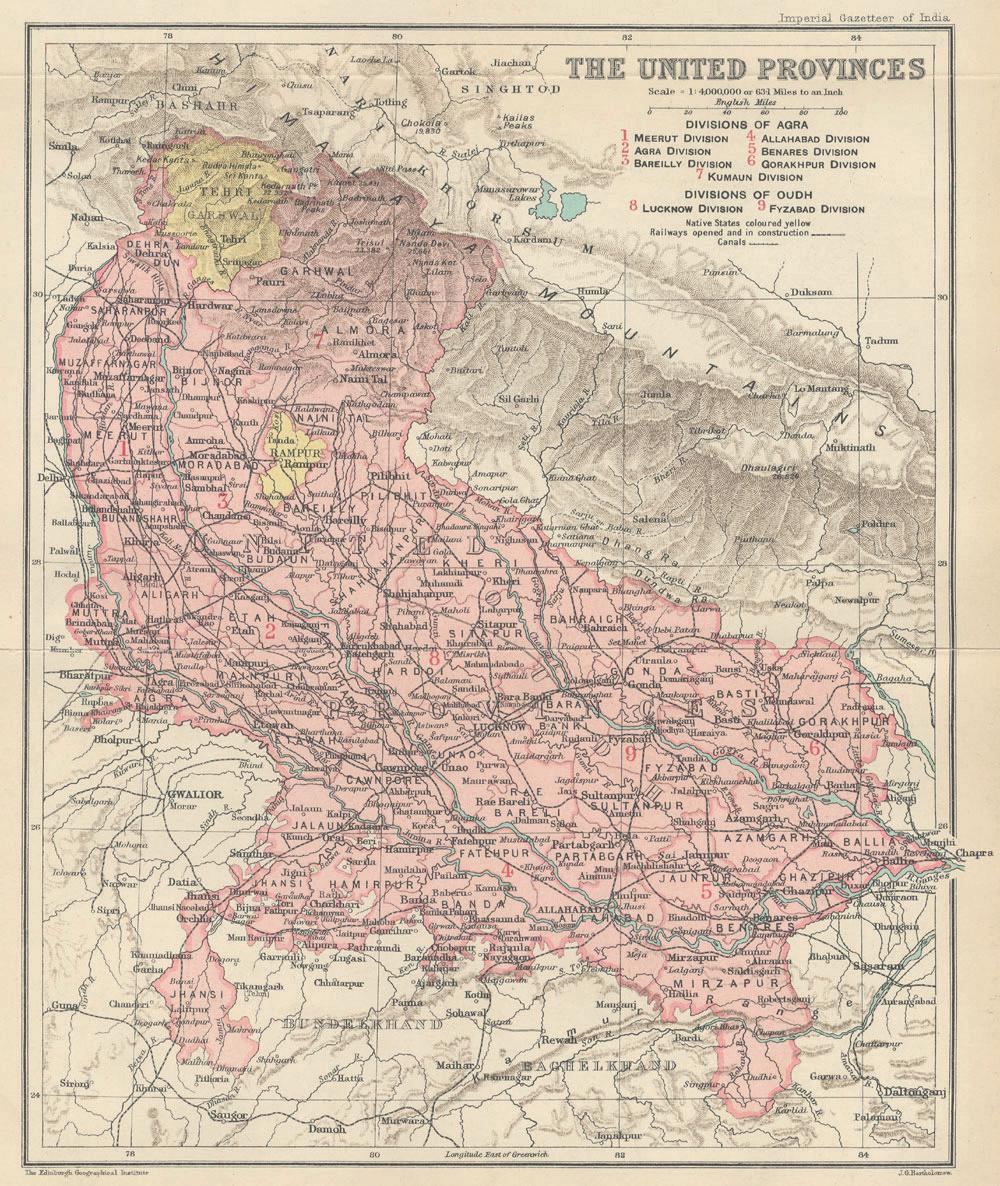 Hazrat Chaudhry Fateh Muhammad Sayal ra (1887-1960)
Hazrat Chaudhry Fateh Muhammad Sayal ra (1887-1960)
Meeting with dignitaries
Our first tabligh delegation consisting of 20 men left Qadian for UP [United Provinces, now Uttar Pradesh] on 12 March [1923] to curb the apostasy [of Malkana Rajputs] and reached Achhnera, District Agra, on 14 March [1923].
Ahmadi missionary, Maulvi Mahfuzul-Haq Sahib, was present at the train station. He met me and informed me about the situation here [in Agra]. After that, Chaudhry Nazir Ahmad Khan Sahib, a lawyer in the state of Jaipur, Niaz Muhammad Khan Sahib of Jaipur and Mahbub Khan Sahib, who are all among the leading Rajputs of their region and have great influence in these parts, heard the news of my arrival and came to meet me. These three friends were very happy to see our delegation and said, “We were waiting for you, friends. This work is very delicate and only you people will be able to perform it adequately with much effort and diligence.”
Representatives of Anjuman and us
We had a disagreement on some important matters with the representatives of Anjuman-e-Tabligh there. Apparently, there was no way to resolve the issue. However, we sent word through the aforementioned three friends that we were ready to work with the said Anjuman in every way, but the disagreement had gone over the edge, so the matter could not be resolved, even though the Anjuman tried their best for about 24 hours. Consequently, we received a message from the Anjuman , saying, “You folks should start your work separately.” A particular area was allotted to us. Since our aim was to work, no matter the circumstances, we accepted their proposal.
Hence, we started working. Apostasy [Movement] is in full swing in the region that has come under our service. That is, a section of the people of this area has become apostate and the rest of them are also on the brink of apostasy. We were glad to hear that the Rajputs of this region and the Maulvis unanimously agreed that, “the danger [of apostasy] in this particular place is very high, so we entrust this work to you.” We are very happy that these friends have placed their trust in us. We pray that Allah the Almighty may grant us success in this
work, amin
Our delegation and sincerity of an old Rajput woman
Without further ado, I spread the missionaries of my delegation throughout the entire region. They were sent to the surrounding villages that are under our jurisdiction and where there has been or was a rumour of the Shuddhi [Movement]. One of these places is a famous village named Akran. To supervise this place, I have arranged for a missionary to settle here permanently. It is proposed that a mosque should also be built here. [...]
We intend to start a Muslim school here. By the time this letter is published in the [ Al Fazl ] newspaper, we are hopeful that the school will be opened. Generally, the Hindi language is taught in schools in this area. However, it is the desire of the Malkana Rajputs that they be acquainted with the Urdu language. Hopefully, we will pay attention to this as well, insha-Allah
Response to the struggles of Aryas
During the tabligh tour, it was brought to our knowledge that Shuddhi was about to take place in a village in our constituency. Thus, Chaudhry
Abdullah Khan Sahib Bhatti BA BT, Chaudhry Badruddin Khan Sahib and some other friends were ordained to get there immediately and make all possible efforts to prevent apostasy. Consequently, our friends reached there, and Maulvi Muhammad Yusuf Sahib, the missionary of Lahore Jamaat, also arrived at that place after hearing the news. On reaching the village, it was found that the majority of local Malkana Rajputs there were completely against this movement and wanted to uphold their existing identity.
The fact of the matter is that the Aryas have persuaded one of the swindlers [from Malkana Rajputs] and he is trying to ruin the whole village. The wave of apostasy has stopped since our arrival, but the overall situation indicates that this village is still under imminent threat. In
order to prevent this impending danger, I have designated Chaudhry Badruddin (formerly Badr Bakhsh) Sahib to keep visiting this village every couple of days and make every effort to reduce the impact of the Aryas. Since Chaudhry Badruddin Sahib is a Rajput, the local people here do not hesitate to meet him. Hopefully, it will lead to a positive outcome, insha-Allah .
Modus operandi of Aryas and details of curbing Shuddhi in Sikandra
The aforementioned incidents clearly show that the Aryas pick out some of the rebellious meanders of a village and exert their influence on them, and then bring the rest of the people into their trap through them. They take a couple of men from the Malkana population of
the village where they plan to carry out Shud dhi. They then deceitfully further their ideas by presenting chariots and cars to them. I think that on such occasions, if people from the Muslim community reach there [to preach the true teachings of Islam] in sufficient numbers, it will put an end to their deceitful approach once and for all.
For instance, I will narrate an incident. Sikandra is a small village near Agra. There was a rumour about Shuddhi there. I thus ordained some of my associates to go there and stop the apostasy. Consequently, Chaudhry Anwar Khan Sahib Bhatti and Babu Muhammad Iqbal Sahib reached the place. They said that there was a large crowd of Hindus, who surrounded the old Rajput Mahtab Khan. He is the mukhya (head) of the village. In the beginning, they praised him and then they threatened
Friday 14 April 2023 | AL HAKAM 22
Wiki Commons
him. In the meantime, by saying that, “Your [Mahtab Khan’s] forefathers were forced to become Muslims”, they tried to persuade him. A couple of teenage boys from the village, who were Aryas and their confederates, kept agreeing with whatever they were saying. The wealthy Hindus of the neighbourhood are trying to make the hard work of their wealthy brothers fruitful by displaying their cars and vehicles. The missionaries sent by us were wondering how to meet this poor, helpless old Rajput. However, Musabbab-ul-Asbab , the God [One Who is the Source of Every Cause] provided the means to meet him in such a way that some of the old Rajput’s close relatives, who had come to find out about his state after hearing the terrible news of his apostasy, happened to meet our missionaries. Through them, our friends got a chance to talk to him. Our associates told Mahtab Khan, “There is a large community of Muslim Rajputs in Punjab who are very anxious about this horrible news. We have come here to inform you about the deceitful tactics of these [Arya] people.” From our conversation, it was learned that Mahtab Khan, who comes from a respectable family of Rajputs, was
not at all ready to become an Arya. He strongly rejected them again and again, but the Aryas, insensible to disgrace, kept insisting that he leave his native religion. It was a strange sight that soon after the arrival of our missionaries, the Arya Mahashas fell silent and started looking here and there as if they were regretting their failure. Then, thinking that Chaudhry Anwar Khan Sahib did not know English, they started saying to each other in English, “The whole village was ready for Shuddhi but now, we have lost the opportunity. Henceforth, we will never go to Mahtab Khan when there is a Muslim around him.”
The cruel practice of Hindu landlords
On the second day, I personally went to Sikandra and informed the people there about the gravity of the situation. I told them that, first of all, these people have snatched your ancestral property and destroyed your financial condition. Now, they want to take away your religion and faith. Our national and Islamic compassion compels us to caution you about the schemes of these Aryas. Hearing this, the old Rajput’s eyes lit up
and he said, “If you people are really our well-wishers, then you should also try to get the Land Transfer Law passed for us and set a limit on the interest rate.” He also stated that the primary reason for their apostasy was the poverty of those people, which had reached the point of starvation. He said that their property had been encroached upon by usurers and shylocks. He pointed to a Thakur near him and said, “Look, all the wealth of this person has been spent on paying for the interest and now he has gone completely broke.” Hence, this was the second time that Allah the Almighty has given us a significant victory over the Aryas.
Appeal to influential Muslims

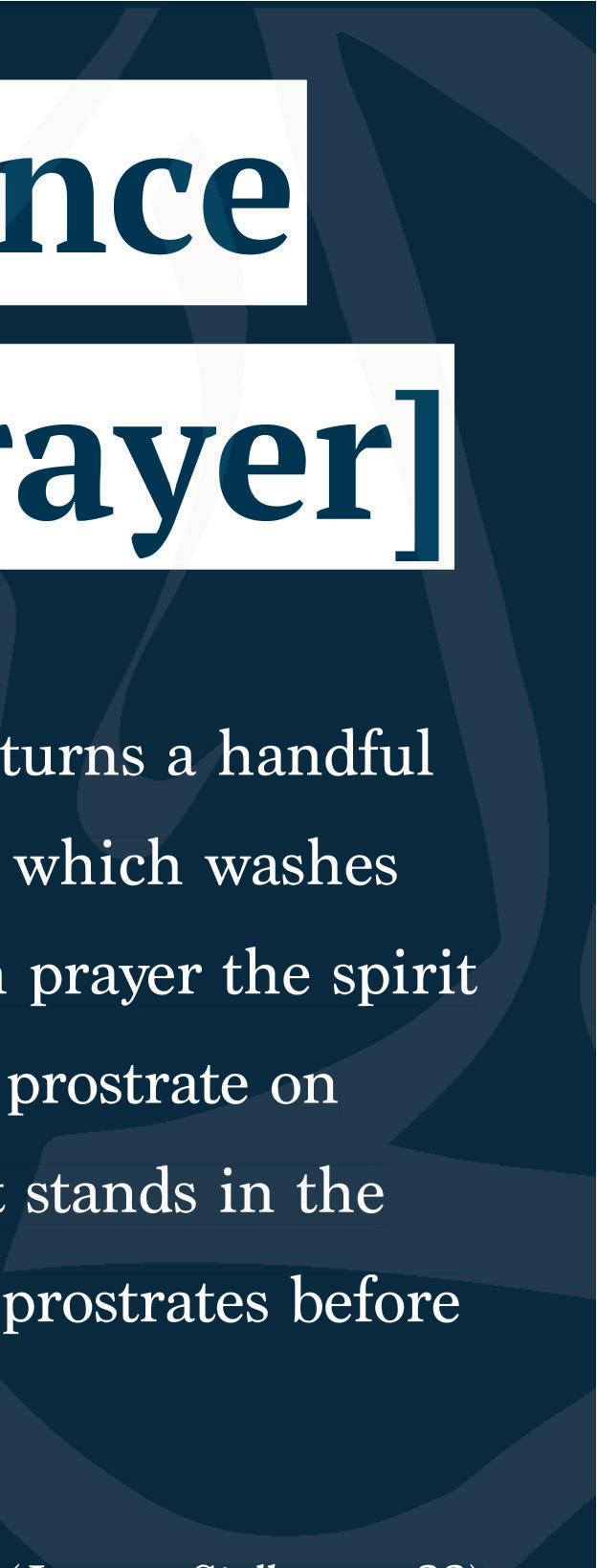
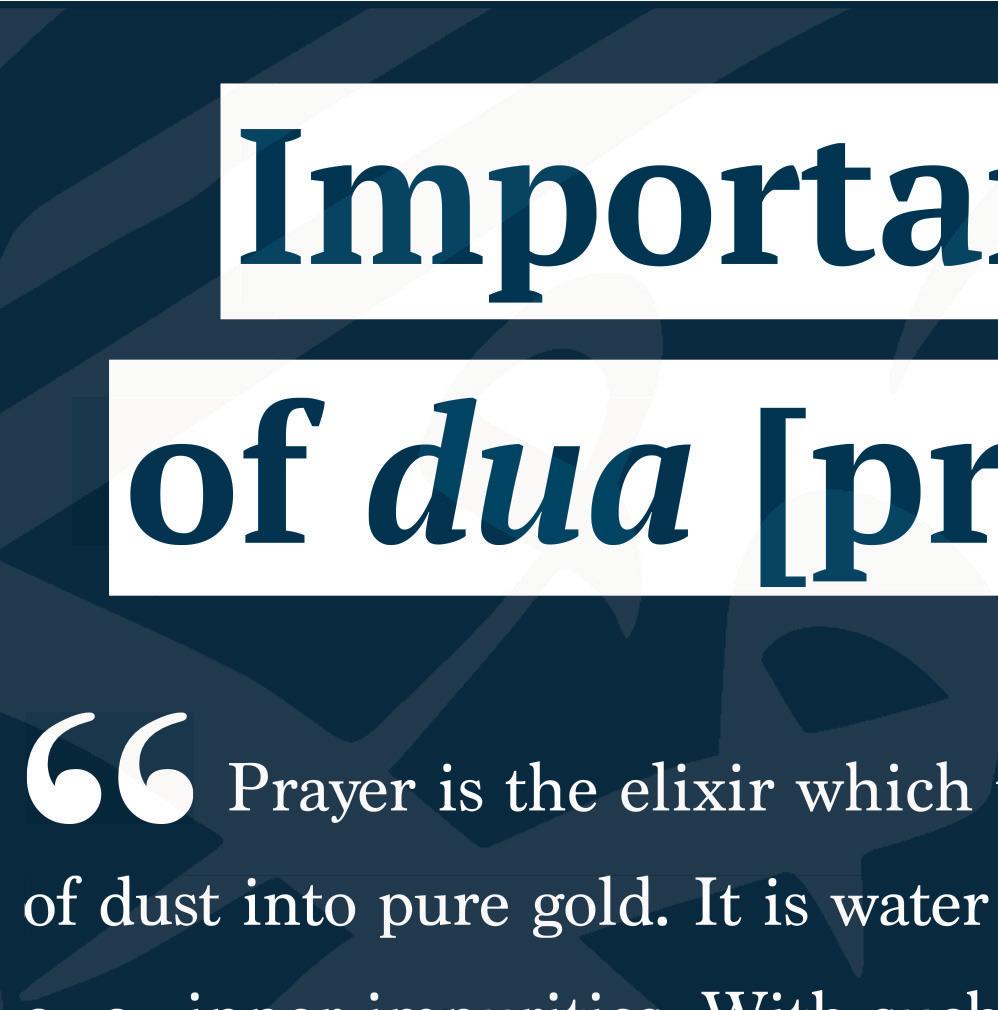
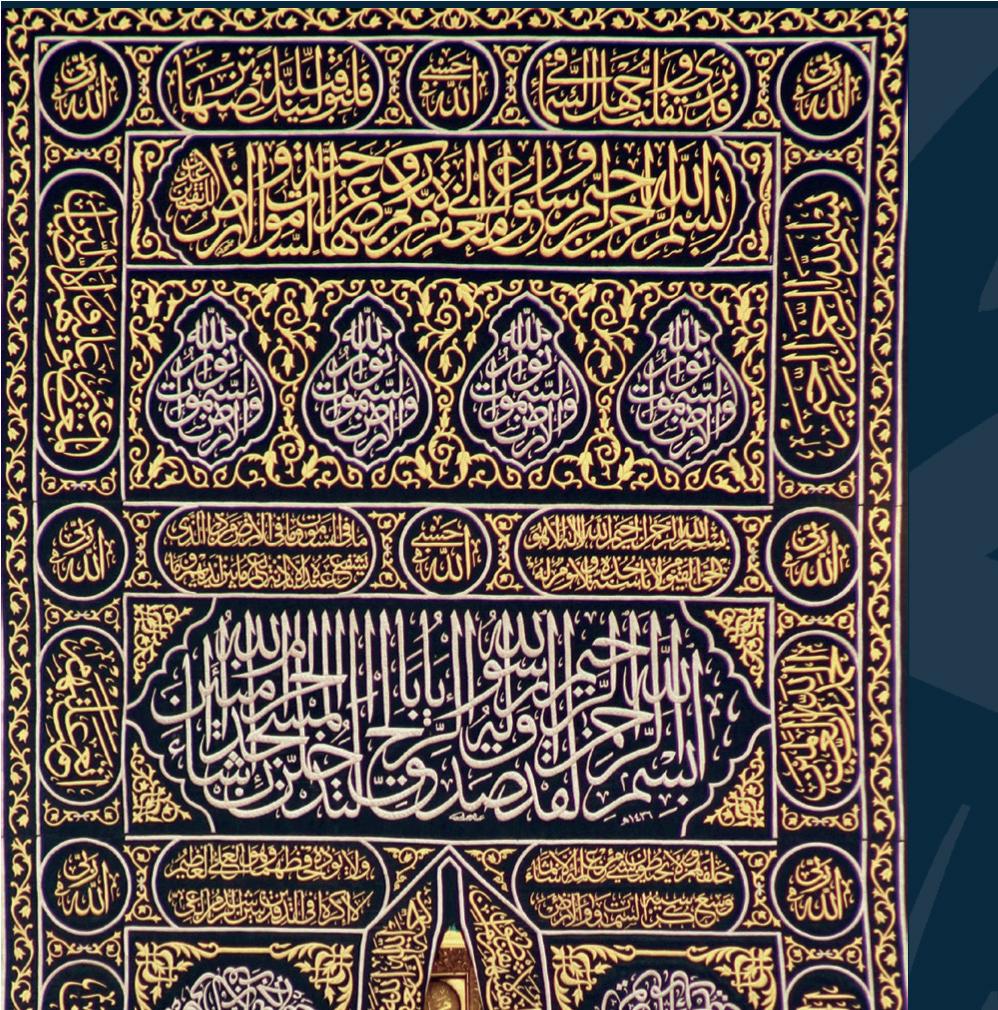
Now, through this newspaper, I request the Muslims of Punjab and the United Provinces and all the Rajputs of India to take care of these helpless, poor and broke, but noble Rajputs, and liberate them from the clutches of cruel and merciless usurers. The situation is getting more critical by the day. The cruel enemy is not satisfied with grabbing their honour and dignity; rather, they want to snatch their religion and faith as
well. Thus, I appeal to all compassionate Muslims with a benevolent spirit to rise up and help their vulnerable brothers. They should put forth their best effort in getting the Land Transfer Act passed. I have also forwarded this issue to Kanwar Abdul Wahab Khan Sahib and appealed to another esteemed friend of mine that they should raise this matter at the annual conference of Anjuman Ittehad-e-Rajputan in Kalanaur and try their best to bring it to their attention so that they should present it before the government as a community. This is not only a service to religion, but humanity also compels us to pay attention to this matter because we must save the poor and helpless Rajputs from the oppression of cruel and heartless usurers.
Wassalam,

Fateh Muhammad Sayal (i.e., Chaudhry Fateh Muhammad Sayal Sahib MA), Head of Da‘wat-o-Tabligh Delegation, Qadian (Appointed to Agra).
(Translated by Al Hakam from the original Urdu, published in the 5 April 1923 issue of Al Fazl )

23 AL HAKAM | Friday 14 April 2023
Friday Sermon
Mubarak Mosque, Islamabad, UK
17 March 2023
The Promised Messiahas: Status and glory of the Holy Quran
After reciting the tashahhud, ta‘awwuz and Surah al-Fatihah, Hazrat Khalifatul Masih Vaa stated:
I have been speaking about the rank, status and excellences of the Holy Quran over the last few weeks. Expounding on the status of religion according to the Holy Quran and the impact it has, and should have, on the human faculties, the Promised Messiahas says:
“How far does religion influence human nature? This is a question that has not been answered by the Gospels for they are far removed from the ways of wisdom. But the Holy Quran has answered it in great detail. It explains that it is not the function of religion to change the natural faculties of man or to turn wolves into lambs (in other words, its purpose is not to weaken those who are strong); its purpose is to guide man in the proper use of his natural faculties in keeping with the demands of time and place. Religion is not meant to change people’s faculties (those abilities that have been bestowed by God); its aim is only to guide them to their proper use. Instead of laying stress on any particular faculty, such as mercy or forgiveness, it should enjoin the use of all of one’s faculties.”
It should not only teach to show mercy and forgiveness. Rather, according to the need and situation, it should encourage the use of the appropriate faculty for the specific occasion. The ultimate objective is to bring about reformation and improvement and one should try to achieve this objective in every way possible.
The Promised Messiahas states:
“Instead of laying stress on any particular faculty, such as mercy or forgiveness, it should enjoin the use of all of one’s faculties. No human faculty is in itself evil, it is their wrong or immoderate use that makes them so. A person cannot be condemned on account of his natural faculties unless he misuses them.” (Four Questions by Mr. Sirajuddin, a Christian, and Their Answers, pp. 15-16)
One small example of this can be that if there is a physically strong man, who commits cruelties to display his strength; or if there is a person with authority who
commits injustices, is not compassionate to others, and fails to utilise their faculties on the right occasion, seeking only to prove their superiority and dominance, then such a person will be deemed evil. His faculties are not evil, but their use, and his actions are.
Then, explaining that one of the objectives of his advent was to prove and establish the truthfulness of the Holy Quran, the Promised Messiahas says:
“It is indeed true that Muslims [today] do not at all comprehend the Holy Quran. However, it is now the desire of God to manifest the correct understanding of the Holy Quran. God has appointed me for this very purpose, and I am able to understand the Holy Quran through His revelations. The teaching of the Holy Quran is such that there cannot be any objection against it, and it is filled with so much wisdom that even a philosopher cannot find an opportunity to criticise it.” (Malfuzat [1984], Vol. 6, p. 167)
Then, whilst mentioning the grandeur of the Holy Quran, the Promised Messiahas advised the Jamaat:
“Ponder over the Holy Quran, for it contains everything; amongst other things, it explains good and evil deeds, as well as news regarding the future. Know full well that the religion that it presents is such that no one can raise any allegations against it, because its blessings and spiritual fruits are readily and consistently found. Religion was not explained in its entirety in the Gospels. Their teachings may have suited the circumstances and conditions of that era, but they are certainly not applicable to every era and condition. (It was suitable for the time in which Prophet Jesusas came, but not anymore.) This honour belongs to the Holy Quran alone, for in it, Allah the Almighty vouchsafed the cure for every ailment, provided guidance for every faculty, and also taught the method of removing the evils that it has identified. For this reason, recite the Holy Quran often, continue to pray, and try to conduct your actions in accordance with its teachings.” (Malfuzat [1984], Vol. 9,
p. 122)
With regards to carefully pondering over the Holy Quran, the Promised Messiahas further states:
“One should abstain from rituals and religious innovations; otherwise, they begin to gradually influence that sharia [teachings of Islam]. Instead of spending time repeating various incantations, one should spend their time pondering over the Holy Quran.” (Malfuzat [1984], Vol. 6, p. 266)
People desire that they should be taught a particular incantation or some brief words, so that they may spend their time reciting them. However, the Promised Messiahas has stated that this should not be the case, in fact, one ought to spend their time focusing on the Holy Quran.
There are some people who spend most of their time in “waza’if” [spiritual incantations] and those who adopt these practices do not even know the meaning of these words. They think that this is the only means of their spiritual betterment. The Promised Messiahas has stated that it would serve people better to spend their time reflecting upon the Holy Quran. It is in this way that they can achieve spiritual progress.
There are many religious innovations that have taken root amongst the nonAhmadi Muslims due to this. However, some Ahmadis have also become influenced by this. Therefore, we must safeguard ourselves from this and pay more attention to reading the translation and commentary of the Holy Quran.
From next week’s Thursday, and in some places on Wednesday, the month of Ramadan is starting. Make an even greater effort in reciting, teaching and understanding the Holy Quran during this month of Ramadan.
The Promised Messiahas states:
“If someone’s heart has been hardened, then the only way to soften it is to constantly recite the Holy Quran. Wherever there is a prayer in the Holy Quran, a believer also desires to be a recipient of that divine mercy. The example of the Holy Quran is like a
garden; one picks a certain flower from one place, then walks a little further and picks a different flower. Accordingly, you should derive benefit from every portion of the Holy Quran.” (Malfuzat [1984], Vol. 6, p. 266)
The Promised Messiahas states that spiritual progress can be achieved by adhering to the commandments and prohibitions outlined in the Holy Quran. One should implement the commandments given by Allah the Almighty, and strive to abstain from whatever He has prohibited. This should be kept in mind, for these are the berry flowers that one plucks from the garden.
The Promised Messiahas further states that there are some people who believe they have excelled a great deal in their religious knowledge to the extent that they limit the attainment of blessings from certain chapters of the Holy Quran – the Promised Messiahas cites Surah Ya Sin as an example – to a particular method of recitation.
(Malfuzat [1984], Vol. 6, p. 266)
Making such statements is akin to claiming divinity. Thus, we should especially abstain from these sorts of practices.
There are two ways in which one can fail to act upon the Holy Quran; the first is to completely abandon it, and the second is to fail to understand its true meanings. What does this mean? Either they don’t act upon it completely, or they don’t act according to its true meanings. Whilst explaining this, the Promised Messiahas states:
“There are two ways in which one fails to act upon the Holy Quran; one is to completely abandon it and the second is to neglect its true meanings. To completely abandon the Holy Quran is to not read the Word of God at all. Just as many people are called Muslims, they are completely unaware of the text of the Holy Quran. The second way is that, though they might recite the Holy Quran, they do not believe in the blessings, spiritual light, and mercy contained therein. Thus, one should strive to avoid neglecting the Holy Quran in either
Friday 14 April 2023 | AL HAKAM 24
of these two ways.”
The Promised Messiahas further states:
“There is a saying of Imam Jafar – and Allah knows best as to its accuracy – whereby he stated, ‘I read the Quran so much that I begin to receive revelation.’ This statement seems plausible. (The Promised Messiahas explains that Allah knows best whether he said this or not or how true it is, but it does seem that it could be true.) This is because one thing can attract another that is similar to it in nature. Now in this era, people have added countless elaborations; Shias have their own and Sunnis have their own.”
The Promised Messiahas explained by narrating an incident, “Once a Shia said to my father that ‘I will tell you a particular phrase, reciting which will preclude you from ever having to purify yourself or perform ablution.’”
In other words, the phrase alone would be sufficient and that would replace his purification and his ablution.
The Promised Messiahas states, “Disbelief, innovation, apostasy, and rejection of God, etc. have found their way into Islam because the words of a singular person were given as much importance as should have been given to the Word of God. This is why the Companionsra believed the ahadith to be secondary to the Holy Quran.”
The Promised Messiahas narrates an incident that, “Once, Hazrat Umarra was about to make a decision when an elderly woman got up and said that the matter had been mentioned in a hadith.”
In other words, she attributed her statement to the Holy Prophetsa. One ought to remember that although the ahadith were compiled later, there were some companions who, at times, would write them down in the very moment.
The Promised Messiahas continues:
“Upon this, Hazrat Umarra said, ‘I cannot abandon the Book of Allah at the behest of an elderly woman.’” (Malfuzat [1984], Vol. 6 pp. 266-267)
The Word of Allah the Almighty was different to what the lady was narrating. Whatever the Word of Allah says, that is the truth. Thus, this is the truth and this is what we should adopt. If this does not happen, then innovations will keep spreading; in fact, it is owing to this that innovations continue to spread among Muslims. As a result, they are pushing them further from the real teachings of the Holy Quran.
This has become prevalent among many Muslims; similar to the example that I just gave in which the Promised Messiahas stated that a Shia scholar told his father that there was a particular phrase that, if recited, would preclude him from performing ablution or having to purify himself. The majority of the Muslim Ummah is ignorant. They will follow whatever path they are led down by these so-called “scholars”, and innovations in faith keep spreading. Despite this, it is alleged that we alter the Holy Quran.
Whilst explaining that the progress of Muslims is dependent upon the Holy Quran, the Promised Messiahas states:
“Until Muslims do not completely follow and adhere to the Holy Quran, they cannot progress in any way. However far they keep straying from the Quran, they are equally moving further away from the different stages and paths of progress. Acting upon the Holy Quran is the sole means of progress and guidance. Allah the Almighty has not
forbidden one from lawful means of trade, farming, and acquiring livelihood, but they should not be considered the objective in itself; rather, they should be kept as a means of serving the faith. The purpose of Zakat is the same, that this wealth is in service to faith.” (Malfuzat [1984], Vol. 8, pp. 29-30)
Thus, a believer should not make worldly pursuits the objective of their life, rather, the purpose of life that Allah the Almighty has outlined for mankind should be their ultimate objective, which is to strive to become true worshippers and to continue striving to act upon His commandments. The commandment to give Zakat and to spend in the way of Allah has been given so that one not only spends their wealth to fulfil their own desires, but also to spend it on the advancement of faith and to fulfil the rights of Allah and the rights of His creation. The Promised Messiahas states:
“The Quran is a repository of jewels, yet people are unaware of it.”
He states, “It is unfortunate that people do not pay attention to the Quran with fervour and diligence. Attention is not given to the Holy Quran in the same way as a worldly person focuses on their worldly pursuits, or as a poet concentrates on their poetry.”
The Promised Messiahas then states, “There was a poet in Batala; he had compiled a book of his poetic works in Persian. One of the couplets was:
(The gentle breeze shies away as it looks upon the countenance of a flower.)
However, he remained confounded and perplexed for six months as he searched for the second verse (he continued to search for it and ponder over it). Eventually, one day, he went to a cloth merchant’s shop to purchase some clothes. The merchant took out many bags of clothes, yet none of them was to his liking. In the end, when he stood up having not bought anything, the cloth merchant (the shopkeeper) became angry, saying, ‘You had me open so many bags and caused me undue inconvenience.’ Thereupon, the poet thought of the second verse and in this way, he was able to complete the couplet:
The gentle breeze shies away as it looks upon the countenance of a flower.
It can bring the bud to blossom, but cannot bring it back to a close.
The Promised Messiahas continues, “People do not make as much effort in order to understand a single verse of the Holy Quran, as much as that poet strove for the sake of one verse.” He states, “The Quran is a repository of jewels, yet people are unaware of it.” (Malfuzat [1984], Vol. 2, pp. 343-344)
The Promised Messiahas states:
“The Torah and Gospels do not contain such secrets and intricacies as are replete in the Holy Quran. Furthermore, the Holy Quran doesn’t just mention all the various matters as a mere claim, as is the case in the Torah and Gospels which only make claims, rather, the Holy Quran demonstrates proof and evidence. Everything it mentions is accompanied by strong and robust proof. Just as there is an attraction to the eloquence and articulacy of the Holy Quran, and just as its teachings have rationality and an allurement, in the same way, its proofs are effective.” (Malfuzat [1984], Vol 3, pp. 243-
244)
Thus, no other book can compare to the Holy Quran. The Promised Messiahas further states that just as the Holy Quran is superior to all scriptures, the rank of the Holy Prophetsa is also loftier than that of all other prophets. (Malfuzat [1984], Vol 3, p. 244)
Hence, when you read something in the Holy Quran, you should seek its proofs there as well.
Whilst mentioning that no sorcery can stand against the Holy Quran, the Promised Messiahas states:
“We ought to remember that we are presenting the Holy Quran, in the face of which all sorcery vanishes away. No falsehood or magic can compete with it. What is it that our enemies possess and carry with them? Know for certain that the Holy Quran is that magnificent weapon, which no falsehood has any chance of challenging. For this reason, no one who follows falsehood can challenge us or our community, and they, therefore, refuse any dialogue with us. This is a heavenly weapon which can never be made dull.” (Malfuzat [1984], Vol. 5, p. 27)
Hence, this draws our attention towards greatly pondering and reflecting over the Holy Quran so that we may improve on our spiritual and intellectual state, and in order to refute our opponents.
Whilst mentioning that adhering to the Holy Quran leads to attaining God Almighty, providing one shows complete obedience to the Holy Quran, the Promised Messiahas states:
“We have only one Messengersa, and only one Holy Quran was revealed to him, by following which one can attain God. Nowadays, the self-concocted methods of the so-called saints, and the Saifis of the saints. (“Saifis” refer to the incantations that are recited for 40 consecutive days to cause harm to a person; all of these evil charms, prayers and incantations are tools to lead one astray from the right path. Hence, one must safeguard against them. These people wish to break the seal of the Khatamul Anbiya [Seal of the Prophets], and it is as though they have created their own sharia [law]. Bear in mind that without following the Holy Quran, the directives of the Holy Prophetsa, prayer, fasting, etc., which are the prescribed ways, there is no other key to opening the doors to the grace and blessings of God Almighty. Misguided is one who abandons these paths and chooses a new one for themselves. One who fails to follow the commands of Allah and His Messengersa, and instead treads other paths in search of Him will die unsuccessful.” (Malfuzat [1984], Vol. 5, p. 185), (Jahangir Urdu Dictionary, Jahangir Books Lahore, p. 923,)
One of the qualities of the Holy Quran mentioned by the Promised Messiahas is that it has made it obligatory to believe in the prophets of every nation. Hence, the Promised Messiahas states:
“The Quran is that revered book that laid the foundation of peace between nations and acknowledged the truth of all Prophets belonging to all the different nations. It is the Holy Quran that enjoys the unique distinction of teaching us with regard to the Prophets of the entire world that:
“Therefore, O Muslims, you should declare: We believe in all the Prophets of God belonging to this world and we do not discriminate between them so as to reject one and accept the others. (The Promised Messiahas challenged:) Name one book like the Holy Quran which is so dedicated to the cause of peace.” (A Message of Peace, p. 31)
Another quality of the Holy Quran is its sequence and order. Regarding this, the Promised Messiahas states:
“The Holy Quran has greatly taken into consideration the order and sequence. A large part of the eloquence of the Quran is related to this. This is because orderliness is an element of eloquent expression. In fact, the highest order of expression is that which exhibits wisdom [in its order and sequence]. He whose speech is bereft of, or lacks structure and sequence cannot be considered eloquent and articulate.”
In other words, an eloquent writer or speaker is one whose words appear at an appropriate time and place and comprehensively encapsulate the subject matter. Furthermore, such eloquence should be expressed in beautiful words that not only conveys brilliant meanings but also maintains sentence structure. Thus, the Promised Messiahas states:
“Such a person can never be considered eloquent and articulate, particularly one who completely neglects order and sequence. Such a person is surely mad because one whose speech is unstructured cannot have their senses intact. (If there is no structure and organisation, it means that they are mad or senseless.) Thus, how is it possible that the miraculous and pure Word of God, which is eloquent, articulate and claims to call toward all kinds of truths, is lacking in order and sequence, which is necessary for it to be considered eloquent?”
(Tiryaqul Quloob, Ruhani Khazain, Vol. 15, pp. 456-457 [footnote])
The Holy Quran is the Word of Allah the Almighty and is filled with eloquence and articulacy. It is impossible for it to lack order and sequence, as claimed by those who raise allegations.
Whilst mentioning two miracles of the Holy Quran, the Promised Messiahas states:
“There is no other means to receive heavenly light except through the Holy Quran. In order to distinguish truth from falsehood forever, and so that falsehood may never be able to prevail over truth, God has blessed the ummah of Muhammad with these two miracles for all times to come – that of the Holy Quran’s content and its effect – (In other words, the first miracle is the words of the Quran and the second is its impact and effectiveness. These are the two miracles) that all false religions have failed to match throughout the ages. Had the Quran possessed the miracle of content only and not that of effect, what superiority would the blessed Muslim ummah have achieved over others in terms of progress in receiving its effects and achieving spiritual enlightenment. Mere asceticism and chastity can never be categorised as miraculous.”
(Barahin-e-Ahmadiyya, Part III, SubFootnote Number One, pp. 229-230)
The teachings of the Holy Quran can be practically impactful if one truly adheres to them.
Adhering to the Holy Quran also brings about signs of salvation during one’s life. In this regard, the Promised Messiahas states:
25 AL HAKAM | Friday 14 April 2023
ندکر نگہ گل ئےور بہ ددگر مے ہمندشر صبا
ندکر نگہ گل ئےور بہ ددگر مے ہمندشر صبا ندکر تہ نستانتو و دکر او ار غنچہ ختر کہ
نوملسم هل نحنو ۫ مہنم دحا نیب قرفن ال
“The Holy Quran, around which revolves the obedience to the Holy Prophetsa, is such a book that by following it, the signs of salvation are manifested in this very world. This is the only book that, through overt and covert means, perfects defective souls and delivers them from doubts and suspicions.”
“Defective souls” refers to those who are weak and lacking. The Holy Quran not only removes their weaknesses but elevates them to a higher state. The Promised Messiahas further states:
“The overt way is that its statements are so comprehensive of verities and fine points that it refutes, through rational arguments, all of the doubts that prevent people from reaching God and because of which hundreds of false sects are flourishing and hundreds of false doctrines are occupying the hearts of misguided people.”
The Holy Quran clearly elucidates through arguments and verities that remove doubt in all shape and form. Indeed, the condition is that one must understand [the Holy Quran], and to understand it, one must derive benefit from the words of those who teach it. The Promised Messiahas further states:
“All the light of the true and perfect teaching needed to dispel the darkness of the present age, shines forth from it like the sun [...].”
In this age, where darkness is spreading, where people are becoming far removed from religion, where indecency and immorality is prevalent and where people are becoming increasingly distant from God – in a state of such darkness – we must hearken to the Holy Quran that contains all that is necessary to repel this darkness and attain the light. The Promised Messiahas further says that all of these things shine brightly in the Quran like the sun and states:
“[…] And the remedy for all the ills of the soul is set out in it, and the exposition of all true insights is contained in it. There is no subtlety of the knowledge of the Divine that can possibly be disclosed at any time in the future, which has been left out of it. The covert way is that by truly following it, man, being purified wholly of inner vices (the condition being complete obedience to the Holy Quran) establishes a relationship with the Lord on High, and the light of his
acceptance by God begins to descend upon him. He is so encircled by divine favours that when he supplicates to God in times of difficulty, God Almighty responds to him through His perfect mercy and compassion (in other words, Allah the Almighty shows immense kindness, mercy, and beneficence). Sometimes it happens that, when he is surrounded by his difficulties and sorrows, even if he supplicates a thousand times, he receives a loving response from his Gracious Lord every time in eloquent, sweet, and blessed words. Divine revelation descends upon him like rain and he finds his heart so filled with the love of God as a transparent glass phial is filled with a delicate perfume. He is bestowed such pure delight of affection and zeal that, by breaking the strong chains of his ego, pulls him out of this hazy condition (he is withdrawn from the polluted air and smoke) and bestows new life upon him every moment with the cool and comforting breezes of the True Beloved.” (Barahin-e-Ahmadiyya, Part III, Sub-Footnote Number Two, pp. 250-251)
Then, the Promised Messiahas states that the Holy Quran is a message that is certain and indisputable. The Promised Messiahas states:
“The Holy Quran is the Book of God and there is no word available to us that is as absolute and certain. It is the Word of God and is untainted by doubt and speculation.”
(A Review of the Debate Between Batalavi and Chakrhalvi, p. 6)
Whilst elaborating on the fact that the Holy Quran has come to unite the nations of the world, the Promised Messiahas states:
“Initially, God sent a code of conduct to each nation individually. Thereafter, He desired that, in light of the Unity of God, the people should also be united. Thus, he sent the Holy Quran to unite all people, thereby informing them that a time is coming when God will bring all nations under one single nation; all countries will be united and all languages will be united.”
(Naseem-e-Da’wat, Ruhani Khazain, Vol. 19, p. 428)
Some people wonder why there are many different faiths; they exist because, in their respective eras, people’s reason and understanding were limited, and the teachings were within their means. In the
past, religion came to individual nations. Now, is a time when everyone can come together, thus, a perfect sharia was sent to us in the form of the Holy Quran. The Promised Messiahas states, “All countries will be united and all languages will be united.” These days, the term “global village” is used to show how the world has united and taken the form of a single community. Nonetheless, despite there being different languages spoken across the globe, the Holy Quran is unique in that it is recited in Arabic by all Muslims, no matter where they are in the world or to which nation they belong. Similarly, it is also used in the five daily prayers.
Then, whilst mentioning that the Holy Quran has bestowed a favour upon the earlier prophets and books, the Promised Messiahas states:
“The Holy Quran has bestowed a great favour upon the prophets and scriptures of the past in that it has given authentic knowledge about those incidents mentioned previously as mere stories. I tell you truly that a person cannot break free from these fables until they read the Holy Quran; because it behoves only the grandeur of the Holy Quran as it states:
لزہلاب وہ ام و لصف لوقل هنا

[“Surely, it is a decisive word. Surely it is not a vain talk.”] (Surah at-Tariq 86:14-15)
“It is the Scale, the Light, a Cure and a Mercy. Whosoever recites the Holy Quran and considers it to be mere tales has not read the Holy Quran, rather, they have dishonoured it.
“Why have our opponents become so active in their enmity against us? Is it because we wish to portray the Quran to be completely filled with light, wisdom and insight – just as Allah the Almighty has commanded? Our opponents wish to show that the Quran is nothing more than a collection of fables, but this is completely unacceptable to us. Through His grace, Allah the Almighty has revealed to us that the Holy Quran is a living book full of radiance. Therefore, why should we worry about their opposition?” (Malfuzat [1984], Vol. 3, p. 155)
With regards to the grandeur of the Holy Quran, the Promised Messiahas says:
“Among the clear proofs of the Holy Quran’s greatness, one such proof is that it contains extraordinary knowledge; finding the like thereof in the Torah or Gospels is a futile task. (It is a pointless task as it cannot be compared) Irrespective of whether a person is among the elite or ordinary, each one can benefit from the knowledge in the Quran according to their own understanding and capacity.” (Malfuzat [1984], Vol. 4, p. 381)
Thus, every person ought to develop the habit of pondering over the meanings and significance of the Quran, so that we can learn about the beauty of the word of God Almighty.
Regarding the commands and prohibitions mentioned in the Holy Quran, the Promised Messiahas says:
“From the beginning to the end, the Quran is replete with commands, prohibitions and divine injunctions. There are several hundred branches of these divine injunctions.” (Malfuzat [1984], Vol. 8, p. 374)
In another instance, the Promised Messiahas has said that, whilst reciting the Quran one ought to search for these and make them a part of their lives. Only then will we truly benefit from the Word of God. (Malfuzat [1984], Vol. 8, p. 376)
Mentioning the beauties of the Holy Quran, at one instance the Promised Messiahas says, “It ought to be made clear that the Holy Quran is the definitive Word of God, in which there is no doubt; there is not even an iota that has been added by man. Its words and meanings are the Word of God and no sect within Islam can survive without this belief (i.e., without accepting this, they cannot survive). Each verse contains an outstanding sequence and is something to be often recited (in other words, it is a revelation that is to be recited again and again) and each and every letter is in its appropriate place. Owing to its miraculous nature, it is free from change and interpolation.” (Izala-eAuham, Ruhani Khazain, Vol. 3, p. 384)
Even the arrangement and order in itself is a miracle and it cannot be altered. Thus, how can one even claim that the Quran has been altered, for were this to happen, the Quran would become distorted from its original form. It would no longer remain in its pristine condition, nor would it cover the same subject matter.
Then, whilst mentioning the depth and profound meanings of the Holy Quran, the Promised Messiahas says:
“The intricacies and wisdom of the Holy Quran and the truths and verities that lie latent within it are revealed according to the need of the time. For example, in the current time through which we are passing, the Quranic verities revealed are in contrast to the Antichrist that are in existence today, whereas the people before did not face the challenges of the Antichrist. That is why the Quranic verities pertaining to it remained obscure from them but have been revealed to us.” (Izala-e-Auham, Ruhani Khazain, Vol. 3, p. 451)


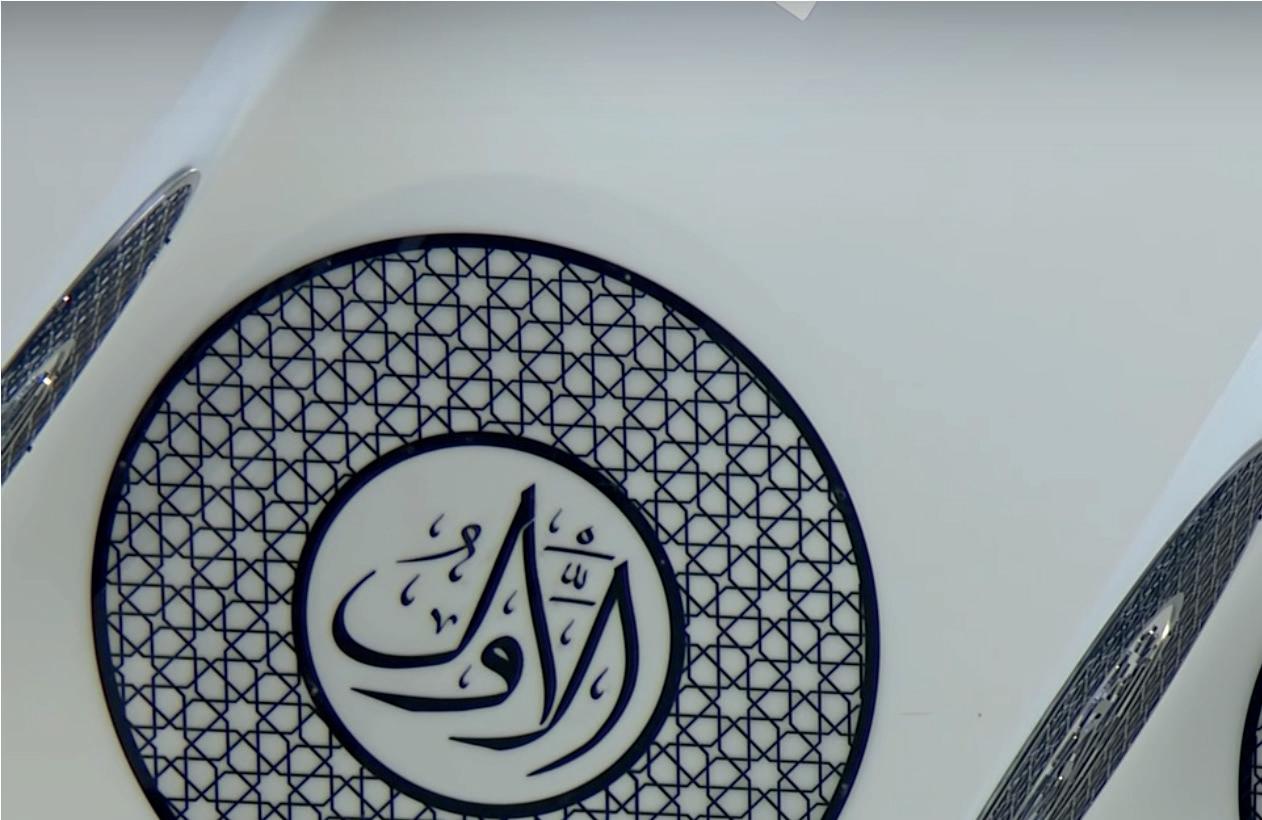
One can learn about the subject matter within the Quran according to the need of the time. In earlier times, the need was different. And so, the commentaries written in the past were for their own respective times. The commentaries of the Quran being compiled today are for the current
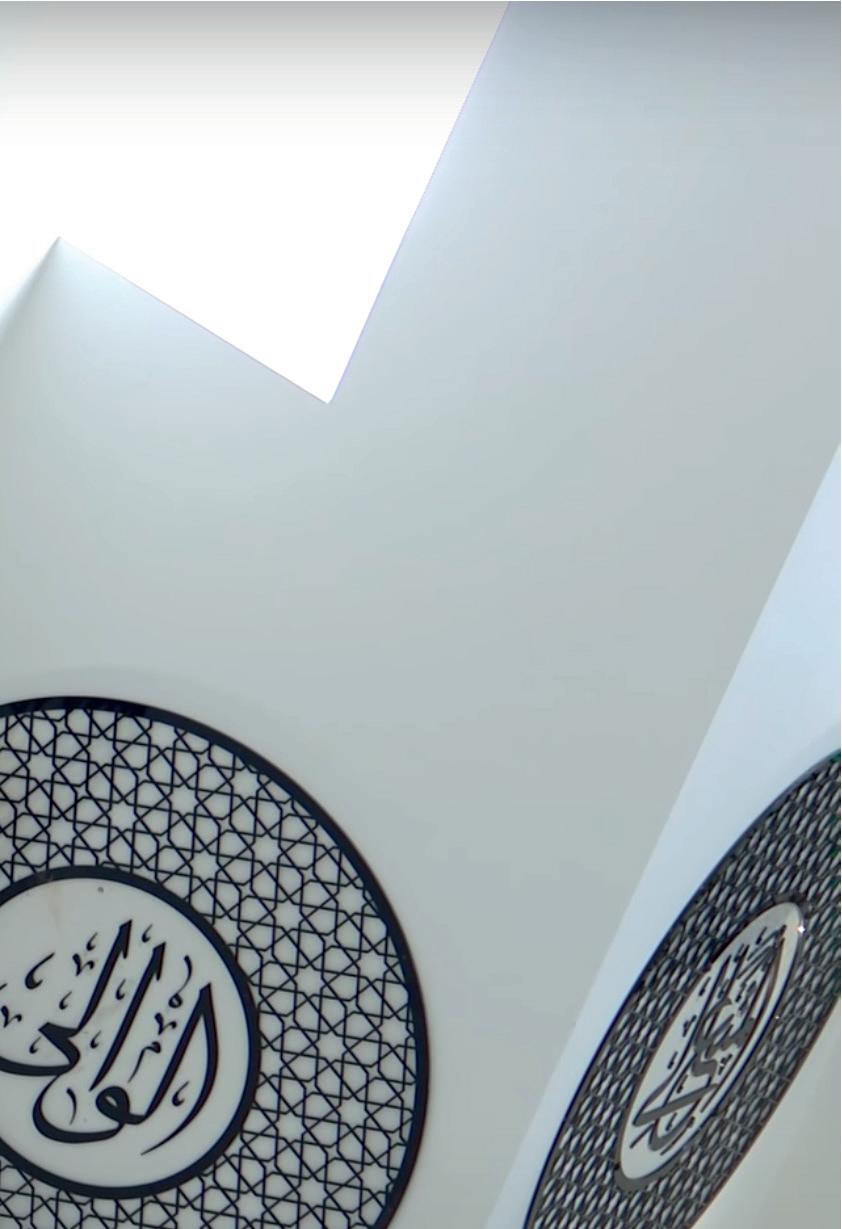

Friday 14 April 2023 | AL HAKAM 26
era. All of this [knowledge] is derived from the Holy Quran itself. Only by pondering over the words of the Holy Quran will its meanings become apparent. Thus, only a book such as this can remain until the end of times, in that one can derive the meanings according to the conditions of the time.
Then, mentioning the beauty of the Holy Quran, the Promised Messiahas states:
“The hidden verities of the Quran, which are supported by authentic ahadith and clear and unambiguous verses of the Quran, can never be redundant in meaning. Rather, the outstanding miracle, which is the Quran, manifests its hidden verities at times when there is a crucial need to demonstrate its spiritual power.” (Izala-e-Auham, Ruhani Khazain, Vol. 3, p. 465)
One can learn of its hidden verities and also infer based upon authentic ahadith as well as the clear and unambiguous verses of the Quran.
The Promised Messiahas further says:
“The Holy Quran contains everything, but until one possesses insight, nothing can be derived from it (the condition is for a person to possess insight). When a person who studies the Holy Quran progresses from one year to the next and looks back in retrospect, they feel as though they were a student at the elementary level, because this is the Word of God Almighty and so it develops a person accordingly as well.”
It is not the case that a person reads it once and learns everything there is to learn from it. Rather, when one person moves on from one year to the next and then begins contemplating over the Quran again, they understand that what they learnt before was akin to elementary study and were basic things that they grasped, and now they have reached a higher level. In this way, a person continuously progresses each year.
The Promised Messiahas continues:
“I disapprove of people who state that the Holy Quran is a book of varying interpretations, for they dishonour the Holy Quran. One ought to say that the Holy Quran encompasses diverse insights (it should be deemed as containing an array of insights). Every part of it is full of countless insights, and one point of wisdom does not contradict the other. However, personalities that are predisposed to impatience, enmity and anger have no affinity with the Holy Quran, nor are the [meanings of the] Holy Quran opened to such people.” (Malfuzat [1984], Vol. 2, p. 221)
The hidden verities of the Quran are revealed to those who ponder over its meanings, purify themselves and seek the protection of Allah the Almighty. Furthermore, it is bestowed upon those who pray to be taught its meanings.
The Promised Messiahas states:
“Without a shadow of a doubt, the Holy Quran is a compendium of all verities and knowledge and it contends with the innovations of each era. The heart of this humble one is a first-hand witness to these blessings and verities.”
In our era, it is the Promised Messiahas alone who has expounded upon the wisdom and intricacies of the Quran. One can learn more about this from his writings. If one were to study his books carefully, one could learn more about the beautiful teachings
and intricacies found within the Quran.
The Promised Messiahas further says:
“Undoubtedly, we have been bestowed with the Quran for our prosperity, progress and eternal victory. Its hidden verities and subtleties are limitless, and these are revealed to a person after they have completely purified their inner selves and illumined their minds. Whichever nation Allah the Almighty has put us up against, we have gained victory over them through the means of the Quran. It is agreeable to an unlettered Bedouin just as much as it can fulfil the intellectual needs of a philosopher (the Quran was not only revealed for a single faction of people while others remained deprived of it.) Unquestionably, it contains the solution for every person, every era, and every level of capability. Aside from those people who are backwards, or who have an imperfect disposition, everyone will have no choice but to believe the greatness of the Quran.”
(Al-Haq Mubahisa Ludhiana, Ruhani Khazain, Vol. 4, p. 110)
In other words, the Quran will not benefit those who are heedless of why they were created, are ignorant, or who, instead of progressing spiritually, regress due to their ignorance.
However, if they are not like this, then it is imperative to believe in the greatness of the Holy Quran and it is these people who benefit from the light of the Quran.
The Promised Messiahas says:
“I have been informed (Allah the Almighty addressed the Promised Messiahas saying):
“‘Only the guidance found in the Holy Quran is absolutely perfect and free from all human intervention’”
The Promised Messiahas further states, “My belief is that the more the natural sciences progress and practically come to the fore, the more the greatness of the Holy Quran will become clear to the world.”
(Malfuzat [1984], Vol. 2, p. 87)
Thus, those who are involved in secular research should also seek help from the Holy Quran and by the grace of Allah the Almighty, there are many who do so. They also write papers on it. One ought to prove the superiority of the Quran and show how there are verities hidden within it. Dr Abdus Salam Sahib always adopted this principle as well.
The Promised Messiahas states:
“The Holy Quran, without a shadow of a doubt, is filled with limitless verities and is sufficient to meet the needs of every era.”
(Izala-e-Auham, Part 1, Ruhani Khazain, Vol. 3, p. 261)
The Promised Messiahas further states:
“The kind and quality of truths and verities it contains and the surpassing beauty, cadence and eloquence of its style and diction are found in the Holy Quran alone. No other book can come anywhere near it.” (Elucidation of Objectives, p. 56)
The Promised Messiahas continues:
“The Holy Quran has been referred to by God as ‘Khair’ [good]. For example, it states:
has described wisdom and knowledge as wealth. The blessings in this world are also attained through this.” (Malfuzat [1984], Vol. 2, p. 328)
Then, whilst giving a warning, the Promised Messiahas stated:
“Keep in mind that one who does not abstain from sin shall eventually die, and this shall most certainly be the case. Allah the Almighty sent His Messengers and Prophets and His final book, the Holy Quran, so that the world would not be destroyed owing to the poison [of sin]. Rather, they should save themselves by becoming aware of its ill effects.” (Malfuzat [1984], Vol. 7, p. 185)
Thus, it is the duty of every Ahmadi that while they transform their conditions in accordance with the teachings of the Holy Quran, they should also inform the world about this teaching and save them from their spiritual and material destruction.

The Promised Messiahas further states:
“The Holy Prophetsa is the Seal of the Prophets, and the Holy Quran is the Seal of the Books. Now, there can be no other word, nor any other [method of] prayer. One cannot attain salvation by abandoning that which was stated by the Holy Prophetsa or what he demonstrated and whatever has been mentioned in the Holy Quran. Whoever abandons this shall be cast into hell. This is our faith and belief.” (Malfuzat [1984], Vol. 8, p. 252)
How can one who holds such views be guilty of dishonouring the Holy Quran and the Holy Prophetsa? If only the general Muslim population could understand this and escape from the clutches of the evil scholars and come to recognise the Imam of this age.
The Promised Messiahsa further states:
“[…] the certain, perfect and easy means of finding the true principles [of salvation] and their supporting arguments with absolute certainty… is the Holy Quran.” (Barahin-e-Ahmadiyya, Parts I & II, p. 92)
The Promised Messiahas further states:
Almighty states:
“‘Verily, We Ourself have sent down this Exhortation, and most surely We will be its Guardian.’
“In other words, when wrong interpretations emerge, then, in order to rectify them, those who have been appointed by Allah the Almighty shall appear.”
Thus, in accordance with His promise, Allah the Almighty has sent Hazrat Mirza Ghulam Ahmadas of Qadian as the appointed one in this age.
The Promised Messiahas states that one should ponder upon this declaration of Allah the Almighty and assess the conditions of this era. The people of other faiths are pulling you away from your faith through their deceitful ploys. However, you are labelling the Messiah and Mahdi as a Dajjal [antichrist] and trying to draw the Muslims away from him.
The Promised Messiahas states that they should not just look at the fact that the Promised Messiahas has appeared and made a claim, in fact, people should also look at the conditions of the era.
Consider the fact that it is the beginning of the century, there are external attacks [on Islam] and then look at the conduct of the Muslims, then ponder as to whether in such circumstances there is a need for the Dajjal or the Mahdi and Messiah.
“[(…) And whoever is granted wisdom has indeed been granted abundant good] (2:270).
“Thus, the Holy Quran is a treasure of wisdom and knowledge. God Almighty
27 AL HAKAM | Friday 14 April 2023
ا ریثك ا ریخ یت وا دقف ۃمکحلا ت ؤی نم و
ن وظفحل هل انا و رک ذلا انل زن نحن انا
“God
The Promised Messiahas states that prejudice is a great evil, and it was owing to this that people rejected the prophets.
(Malfuzat [1984], Vol. 7, p. 230)
May Allah the Almighty grant wisdom and understanding to the Muslims. Then, whilst mentioning the qualities of the Holy Quran, the Promised Messiahas states:
“The Holy Quran, from beginning to end, provides two kinds of testimonies – the testimony of reason and the testimony of revelation. In the Holy Quran these two are like two great streams running in parallel and influencing each other continuously.”
(Barahin-e-Ahmadiyya Parts I & II, Footnote Number 4, p. 94)
This means that they are flowing concurrently, are aligned with one another and also influence each other.


The Promised Messiahas also states:
“The purpose of the Holy Quran was to elevate savages into men, and then to equip them with moral qualities, and finally raise them to the level of godly persons.” (The Philosophy of the Teachings of Islam, p. 23)
We find that this purpose was achieved in the most excellent manner among the Arabs.
A few years ago, a person belonging to the Jewish faith said to me that, although he was not a Muslim, he believed that the Holy Prophetsa was indeed a prophet because the revolutionary transformation that was brought about among the Arab Bedouins could only have been achieved by a prophet. No ordinary person could do
such a thing. It can only be achieved by one who has the support of Allah the Almighty.
The Promised Messiahas states:
“When a person reads the Holy Quran, it is astonishing to note that this very unlettered person not only informed us of the Book and Wisdom, but enlightened us as to the ways that one can purify the soul, elevating people to the rank expressed in the following verse:
‘Whom He has strengthened with inspiration from Himself.’ (Surah alMujadalah, Ch. 58: V. 23)
Observe and reflect deeply over the fact that the Holy Quran conveys a seeker of any disposition to their objective and satiates all those who are thirsty for virtue and truth.” (Malfuzat [English], Vol. 1, p. 118)
The Promised Messiahas further states:
“[…] all divine revelations were meant to bestow certainty on man, but the certainty for which the holy Quran has laid the foundations surpasses all past revelations.” (Barahin-e-Ahmadiyya, Parts I & II, p. 94)
In order to ensure that the members of his Jamaat completely adhere to the teachings of the Holy Quran, the Promised Messiahas included this in the conditions of Bai‘at. The sixth condition reads:


“That he/she shall refrain from following un-Islamic customs and lustful inclinations and shall completely submit
himself/herself to the authority of the Holy Quran; and that he/she shall make the Word of God and the sayings of the Holy Prophet Muhammadsa his/her guiding principles in every walk of his/her life.” (Izala-e-Auham, Ruhani Khazain, Vol. 3, p. 564)

However, the evil scholars, who are completely bereft of any understanding, still allege that we have altered the Holy Quran. The Promised Messiahas states:
“We are not permitted to change, alter, rearrange, or add any words from ourselves to any verse of the Holy Quran (in other words, neither can we make any change, nor add or remove anything). We are not permitted to add anything except if it is proven to have been done by the practice of the Holy Prophetsa (if it can be substantiated that the Holy Prophetsa himself made any changes then the evidence for this should be brought forth), however, until it is proven, we cannot make even an iota of a change to the order and sequence of the Holy Quran, nor can we add any words from ourselves. If we did commit such an act, then we would be guilty of a wrongdoing in the sight of Allah and worthy of punishment.” (Itmamul-Hujjah, Ruhani Khazain, Vol. 8, p. 291)
The Promised Messiahas has explained that this is not even possible for him, therefore, how can people allege that he is guilty of this? And if he did do such a thing, then he would be deemed guilty in the sight of Allah the Almighty. Thus, the Promised Messiahas himself has openly declared that it is not permissible to make
any kind of change or alteration to the Holy Quran. Moreover, he stated that if he were guilty of such an act, he would be guilty of a wrongdoing and would be held accountable in the sight of Allah the Almighty. However, despite this, those who level allegations against us consider themselves even superior to God Almighty because, even though He has not declared us guilty of such an act, they still have and they raise a commotion about this and want to punish us. May Allah the Almighty protect every Ahmadi from their evil and turn their evil ploys against them. May He enable us to understand the true meanings of the Holy Quran and act upon it.
Pray for the Ahmadis in Pakistan and the general condition of the country. Also, pray for the Ahmadis in Burkina Faso and the general condition of the country. Pray for the Ahmadis in Bangladesh; may Allah the Almighty keep them under His protection. Even today, the Maulvis had planned to create disorder. Pray for all the Ahmadis in every country. As I mentioned, the month of Ramadan is starting and just as you pay particular attention to reciting and understanding the Holy Quran, you should also pay particular attention to prayers. May Allah the Almighty grant us all the ability to do this and enable us to partake in the benefits of Ramadan.
(Official Urdu transcript published in Al Fazl International, 7 April 2023, pp. 2-7.
Translated by The Review of Religions.)
Friday 14 April 2023 | AL HAKAM 28
Editor-in-chief: Qaasid Muin Ahmad | Executive editors: Ataul Fatir Tahir, Aqeel Ahmed Kang | Research coordinator: Awwab Saad Hayat | Associate editors: Jalees Ahmad, Ata-ul-Haye Nasir Translations: M Adam Ahmad | Design: Tahmeed Ahmad | © Al Hakam 2023
“In these days [of Ramadan] we must pay particular attention towards performing our worship in the most excellent manner, invoking salutations on the Holy Prophetsa [durood], seeking forgiveness from Allah the Almighty and repentance, offering prayers, fulfilling the rights due to Allah the Almighty’s worship and also fulfilling the rights owed to mankind; this is so that we can attain the pleasure of Allah the Almighty and be saved from the Hellfire.”
(Friday Sermon, 30 April 2021; Al Hakam, 28 May 2021, Issue 167, p. 25)
هنم حورب مہدی
و
ا











































































 Hazrat Chaudhry Fateh Muhammad Sayal ra (1887-1960)
Hazrat Chaudhry Fateh Muhammad Sayal ra (1887-1960)

















